BSBLDR511 Develop and Use Emotional Intelligence Assessment Tasks
VerifiedAdded on 2023/06/03
|46
|12143
|193
AI Summary
The assessment tasks for BSBLDR511 Develop and use emotional intelligence are included in this Student Assessment Tasks booklet and outlined in the assessment plan. The tasks include written questions, emotional intelligence self-assessment project, and staff emotional intelligence project. The assessment appeals process is also mentioned. The naming convention for electronic documents is explained. The assessment task 1 consists of written questions that need to be answered correctly within a time limit of 1 hour. The guidance for answering the questions is also provided.
Contribute Materials
Your contribution can guide someone’s learning journey. Share your
documents today.
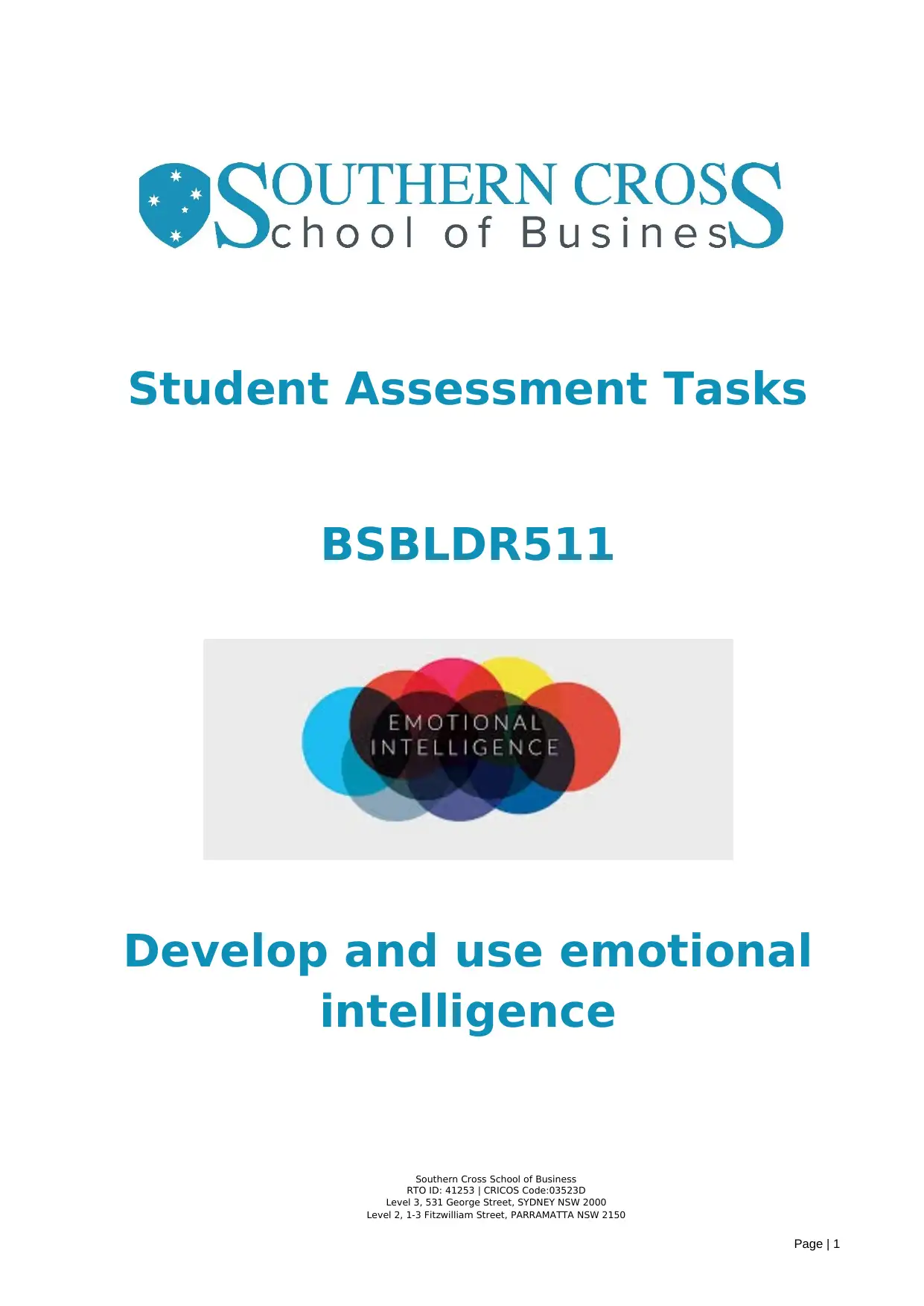
Student Assessment Tasks
BSBLDR511
Develop and use emotional
intelligence
Southern Cross School of Business
RTO ID: 41253 | CRICOS Code:03523D
Level 3, 531 George Street, SYDNEY NSW 2000
Level 2, 1-3 Fitzwilliam Street, PARRAMATTA NSW 2150
Page | 1
BSBLDR511
Develop and use emotional
intelligence
Southern Cross School of Business
RTO ID: 41253 | CRICOS Code:03523D
Level 3, 531 George Street, SYDNEY NSW 2000
Level 2, 1-3 Fitzwilliam Street, PARRAMATTA NSW 2150
Page | 1
Secure Best Marks with AI Grader
Need help grading? Try our AI Grader for instant feedback on your assignments.
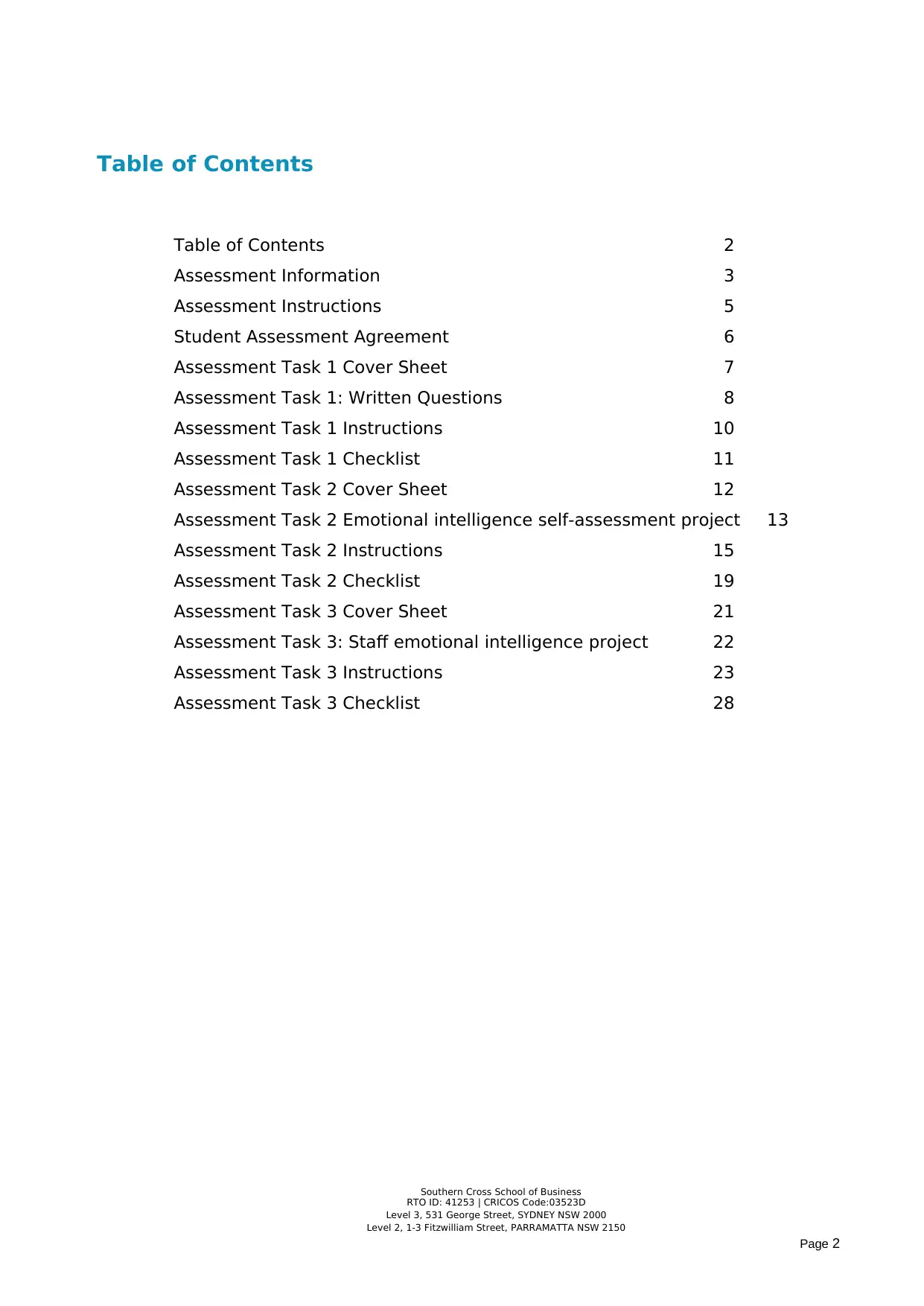
Table of Contents
Table of Contents 2
Assessment Information 3
Assessment Instructions 5
Student Assessment Agreement 6
Assessment Task 1 Cover Sheet 7
Assessment Task 1: Written Questions 8
Assessment Task 1 Instructions 10
Assessment Task 1 Checklist 11
Assessment Task 2 Cover Sheet 12
Assessment Task 2 Emotional intelligence self-assessment project 13
Assessment Task 2 Instructions 15
Assessment Task 2 Checklist 19
Assessment Task 3 Cover Sheet 21
Assessment Task 3: Staff emotional intelligence project 22
Assessment Task 3 Instructions 23
Assessment Task 3 Checklist 28
Southern Cross School of Business
RTO ID: 41253 | CRICOS Code:03523D
Level 3, 531 George Street, SYDNEY NSW 2000
Level 2, 1-3 Fitzwilliam Street, PARRAMATTA NSW 2150
Page 2
Table of Contents 2
Assessment Information 3
Assessment Instructions 5
Student Assessment Agreement 6
Assessment Task 1 Cover Sheet 7
Assessment Task 1: Written Questions 8
Assessment Task 1 Instructions 10
Assessment Task 1 Checklist 11
Assessment Task 2 Cover Sheet 12
Assessment Task 2 Emotional intelligence self-assessment project 13
Assessment Task 2 Instructions 15
Assessment Task 2 Checklist 19
Assessment Task 3 Cover Sheet 21
Assessment Task 3: Staff emotional intelligence project 22
Assessment Task 3 Instructions 23
Assessment Task 3 Checklist 28
Southern Cross School of Business
RTO ID: 41253 | CRICOS Code:03523D
Level 3, 531 George Street, SYDNEY NSW 2000
Level 2, 1-3 Fitzwilliam Street, PARRAMATTA NSW 2150
Page 2
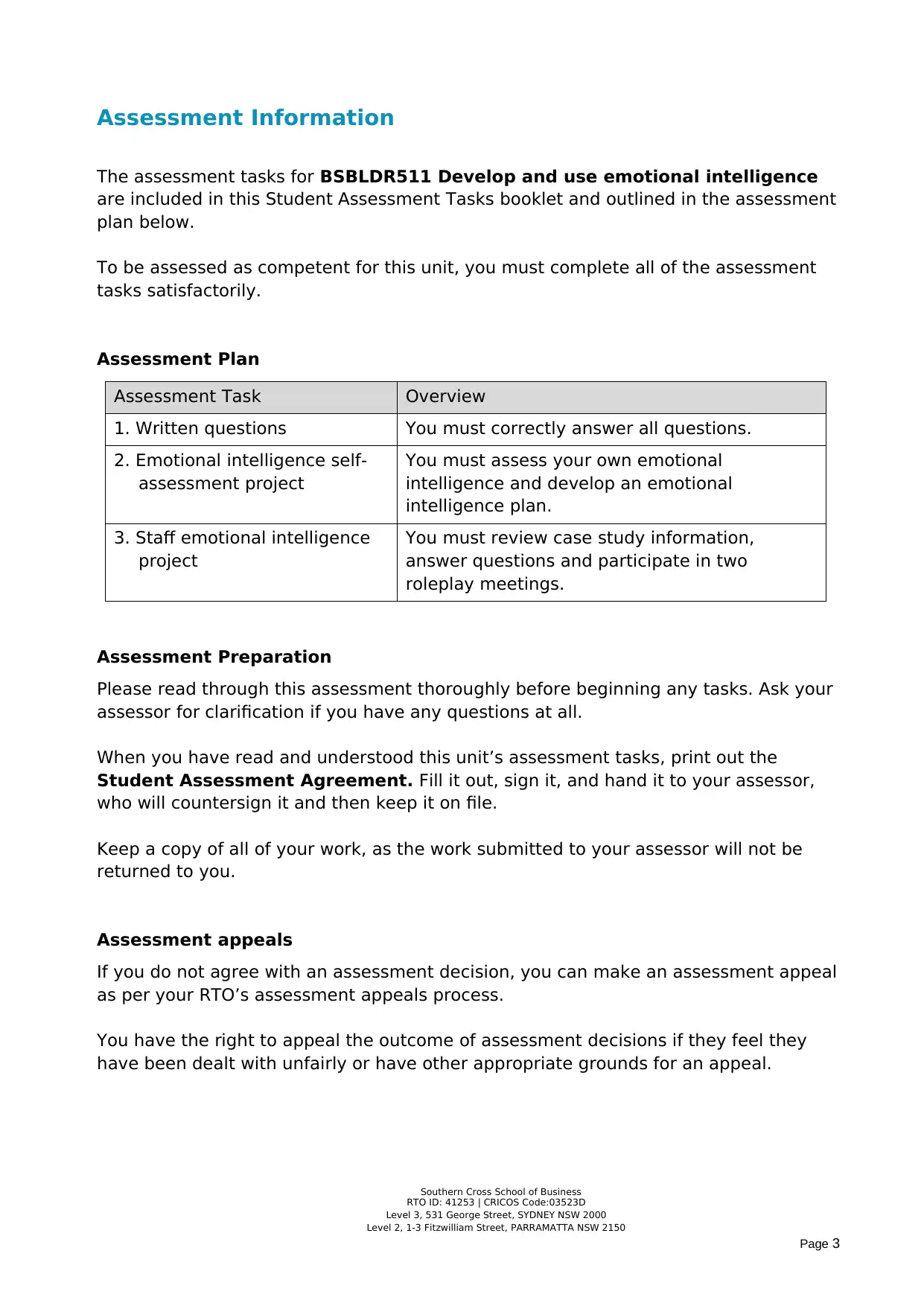
Assessment Information
The assessment tasks for BSBLDR511 Develop and use emotional intelligence
are included in this Student Assessment Tasks booklet and outlined in the assessment
plan below.
To be assessed as competent for this unit, you must complete all of the assessment
tasks satisfactorily.
Assessment Plan
Assessment Task Overview
1. Written questions You must correctly answer all questions.
2. Emotional intelligence self-
assessment project
You must assess your own emotional
intelligence and develop an emotional
intelligence plan.
3. Staff emotional intelligence
project
You must review case study information,
answer questions and participate in two
roleplay meetings.
Assessment Preparation
Please read through this assessment thoroughly before beginning any tasks. Ask your
assessor for clarification if you have any questions at all.
When you have read and understood this unit’s assessment tasks, print out the
Student Assessment Agreement. Fill it out, sign it, and hand it to your assessor,
who will countersign it and then keep it on file.
Keep a copy of all of your work, as the work submitted to your assessor will not be
returned to you.
Assessment appeals
If you do not agree with an assessment decision, you can make an assessment appeal
as per your RTO’s assessment appeals process.
You have the right to appeal the outcome of assessment decisions if they feel they
have been dealt with unfairly or have other appropriate grounds for an appeal.
Southern Cross School of Business
RTO ID: 41253 | CRICOS Code:03523D
Level 3, 531 George Street, SYDNEY NSW 2000
Level 2, 1-3 Fitzwilliam Street, PARRAMATTA NSW 2150
Page 3
The assessment tasks for BSBLDR511 Develop and use emotional intelligence
are included in this Student Assessment Tasks booklet and outlined in the assessment
plan below.
To be assessed as competent for this unit, you must complete all of the assessment
tasks satisfactorily.
Assessment Plan
Assessment Task Overview
1. Written questions You must correctly answer all questions.
2. Emotional intelligence self-
assessment project
You must assess your own emotional
intelligence and develop an emotional
intelligence plan.
3. Staff emotional intelligence
project
You must review case study information,
answer questions and participate in two
roleplay meetings.
Assessment Preparation
Please read through this assessment thoroughly before beginning any tasks. Ask your
assessor for clarification if you have any questions at all.
When you have read and understood this unit’s assessment tasks, print out the
Student Assessment Agreement. Fill it out, sign it, and hand it to your assessor,
who will countersign it and then keep it on file.
Keep a copy of all of your work, as the work submitted to your assessor will not be
returned to you.
Assessment appeals
If you do not agree with an assessment decision, you can make an assessment appeal
as per your RTO’s assessment appeals process.
You have the right to appeal the outcome of assessment decisions if they feel they
have been dealt with unfairly or have other appropriate grounds for an appeal.
Southern Cross School of Business
RTO ID: 41253 | CRICOS Code:03523D
Level 3, 531 George Street, SYDNEY NSW 2000
Level 2, 1-3 Fitzwilliam Street, PARRAMATTA NSW 2150
Page 3
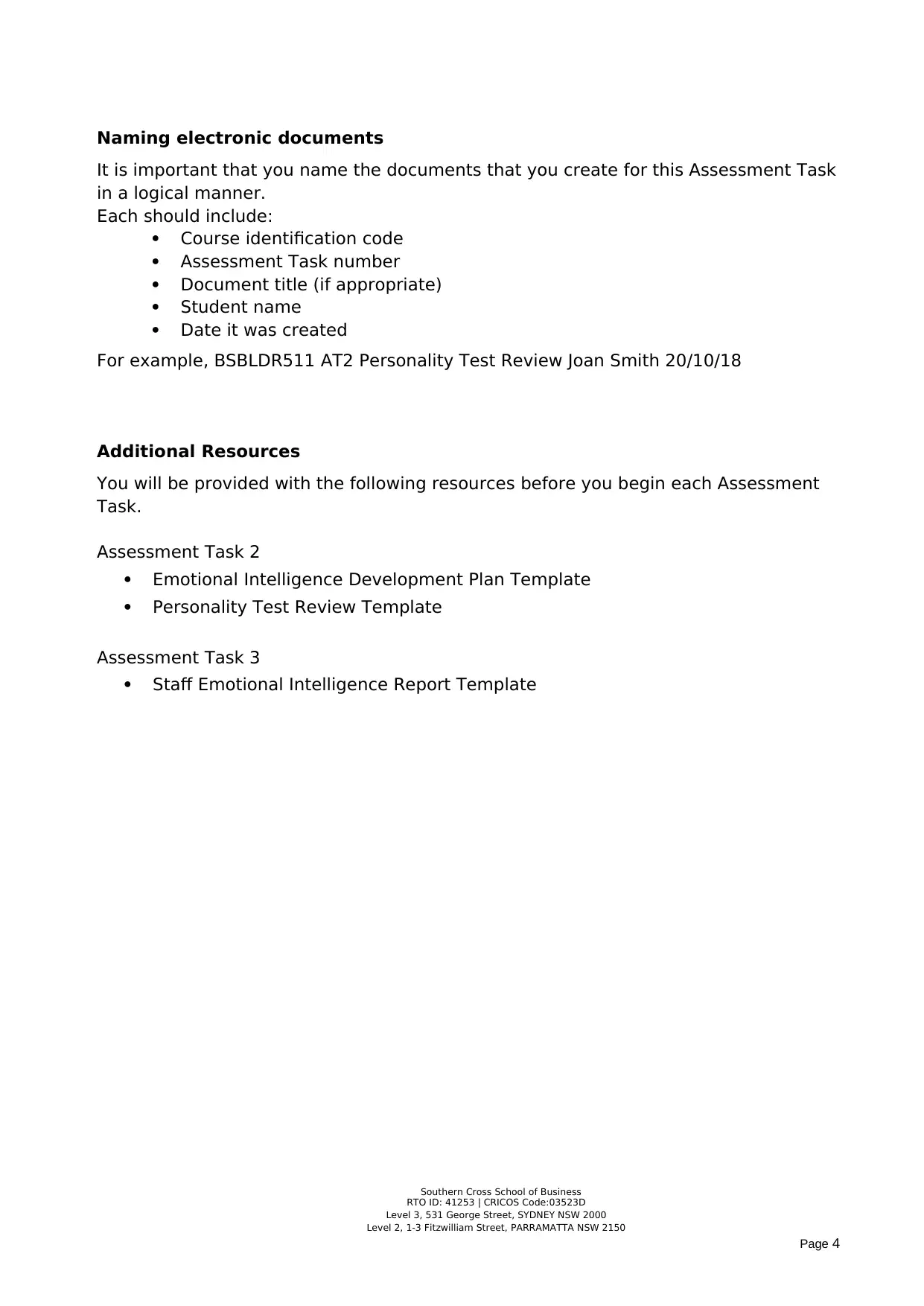
Naming electronic documents
It is important that you name the documents that you create for this Assessment Task
in a logical manner.
Each should include:
Course identification code
Assessment Task number
Document title (if appropriate)
Student name
Date it was created
For example, BSBLDR511 AT2 Personality Test Review Joan Smith 20/10/18
Additional Resources
You will be provided with the following resources before you begin each Assessment
Task.
Assessment Task 2
Emotional Intelligence Development Plan Template
Personality Test Review Template
Assessment Task 3
Staff Emotional Intelligence Report Template
Southern Cross School of Business
RTO ID: 41253 | CRICOS Code:03523D
Level 3, 531 George Street, SYDNEY NSW 2000
Level 2, 1-3 Fitzwilliam Street, PARRAMATTA NSW 2150
Page 4
It is important that you name the documents that you create for this Assessment Task
in a logical manner.
Each should include:
Course identification code
Assessment Task number
Document title (if appropriate)
Student name
Date it was created
For example, BSBLDR511 AT2 Personality Test Review Joan Smith 20/10/18
Additional Resources
You will be provided with the following resources before you begin each Assessment
Task.
Assessment Task 2
Emotional Intelligence Development Plan Template
Personality Test Review Template
Assessment Task 3
Staff Emotional Intelligence Report Template
Southern Cross School of Business
RTO ID: 41253 | CRICOS Code:03523D
Level 3, 531 George Street, SYDNEY NSW 2000
Level 2, 1-3 Fitzwilliam Street, PARRAMATTA NSW 2150
Page 4
Secure Best Marks with AI Grader
Need help grading? Try our AI Grader for instant feedback on your assignments.
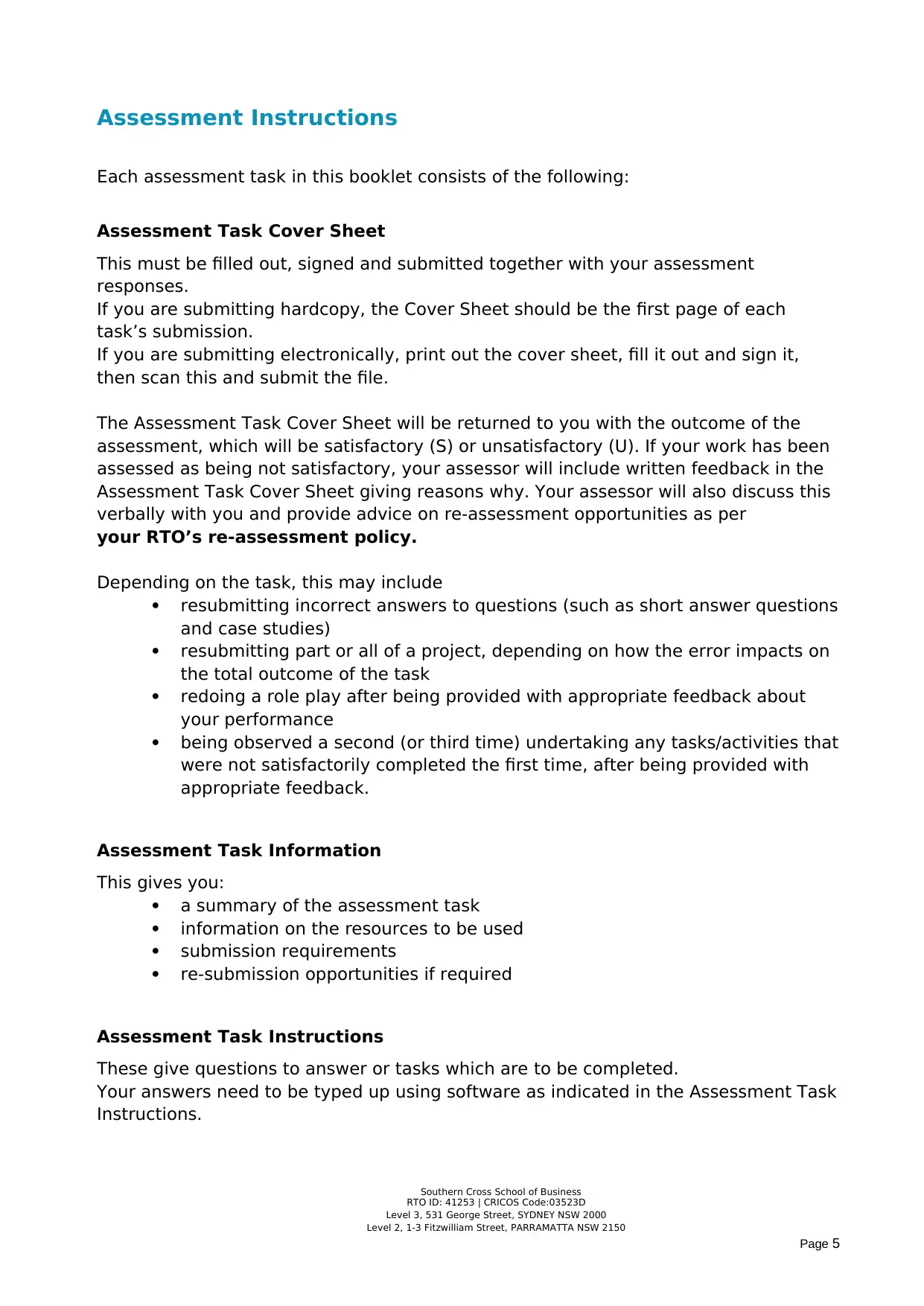
Assessment Instructions
Each assessment task in this booklet consists of the following:
Assessment Task Cover Sheet
This must be filled out, signed and submitted together with your assessment
responses.
If you are submitting hardcopy, the Cover Sheet should be the first page of each
task’s submission.
If you are submitting electronically, print out the cover sheet, fill it out and sign it,
then scan this and submit the file.
The Assessment Task Cover Sheet will be returned to you with the outcome of the
assessment, which will be satisfactory (S) or unsatisfactory (U). If your work has been
assessed as being not satisfactory, your assessor will include written feedback in the
Assessment Task Cover Sheet giving reasons why. Your assessor will also discuss this
verbally with you and provide advice on re-assessment opportunities as per
your RTO’s re-assessment policy.
Depending on the task, this may include
resubmitting incorrect answers to questions (such as short answer questions
and case studies)
resubmitting part or all of a project, depending on how the error impacts on
the total outcome of the task
redoing a role play after being provided with appropriate feedback about
your performance
being observed a second (or third time) undertaking any tasks/activities that
were not satisfactorily completed the first time, after being provided with
appropriate feedback.
Assessment Task Information
This gives you:
a summary of the assessment task
information on the resources to be used
submission requirements
re-submission opportunities if required
Assessment Task Instructions
These give questions to answer or tasks which are to be completed.
Your answers need to be typed up using software as indicated in the Assessment Task
Instructions.
Southern Cross School of Business
RTO ID: 41253 | CRICOS Code:03523D
Level 3, 531 George Street, SYDNEY NSW 2000
Level 2, 1-3 Fitzwilliam Street, PARRAMATTA NSW 2150
Page 5
Each assessment task in this booklet consists of the following:
Assessment Task Cover Sheet
This must be filled out, signed and submitted together with your assessment
responses.
If you are submitting hardcopy, the Cover Sheet should be the first page of each
task’s submission.
If you are submitting electronically, print out the cover sheet, fill it out and sign it,
then scan this and submit the file.
The Assessment Task Cover Sheet will be returned to you with the outcome of the
assessment, which will be satisfactory (S) or unsatisfactory (U). If your work has been
assessed as being not satisfactory, your assessor will include written feedback in the
Assessment Task Cover Sheet giving reasons why. Your assessor will also discuss this
verbally with you and provide advice on re-assessment opportunities as per
your RTO’s re-assessment policy.
Depending on the task, this may include
resubmitting incorrect answers to questions (such as short answer questions
and case studies)
resubmitting part or all of a project, depending on how the error impacts on
the total outcome of the task
redoing a role play after being provided with appropriate feedback about
your performance
being observed a second (or third time) undertaking any tasks/activities that
were not satisfactorily completed the first time, after being provided with
appropriate feedback.
Assessment Task Information
This gives you:
a summary of the assessment task
information on the resources to be used
submission requirements
re-submission opportunities if required
Assessment Task Instructions
These give questions to answer or tasks which are to be completed.
Your answers need to be typed up using software as indicated in the Assessment Task
Instructions.
Southern Cross School of Business
RTO ID: 41253 | CRICOS Code:03523D
Level 3, 531 George Street, SYDNEY NSW 2000
Level 2, 1-3 Fitzwilliam Street, PARRAMATTA NSW 2150
Page 5
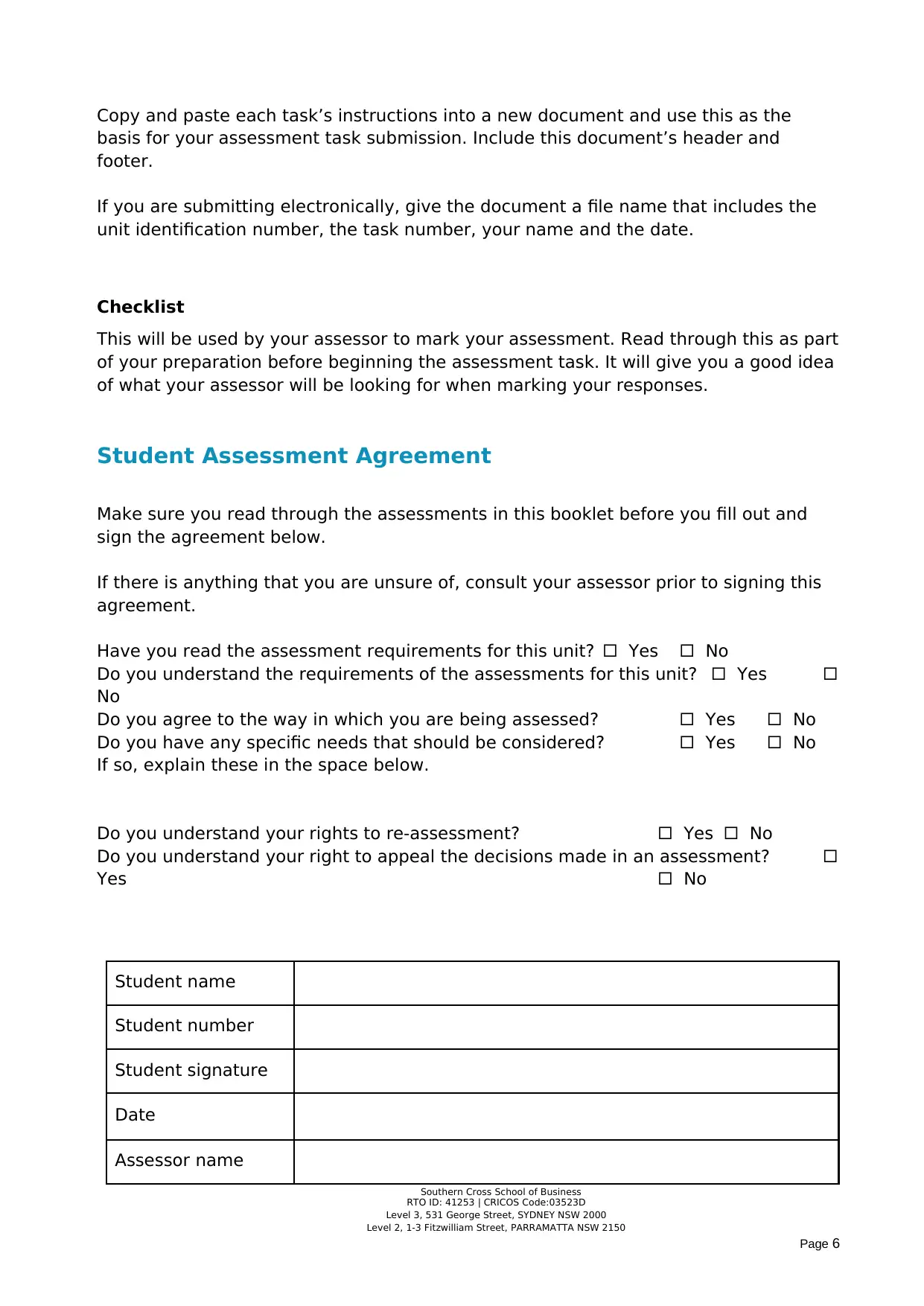
Copy and paste each task’s instructions into a new document and use this as the
basis for your assessment task submission. Include this document’s header and
footer.
If you are submitting electronically, give the document a file name that includes the
unit identification number, the task number, your name and the date.
Checklist
This will be used by your assessor to mark your assessment. Read through this as part
of your preparation before beginning the assessment task. It will give you a good idea
of what your assessor will be looking for when marking your responses.
Student Assessment Agreement
Make sure you read through the assessments in this booklet before you fill out and
sign the agreement below.
If there is anything that you are unsure of, consult your assessor prior to signing this
agreement.
Have you read the assessment requirements for this unit? Yes No
Do you understand the requirements of the assessments for this unit? Yes
No
Do you agree to the way in which you are being assessed? Yes No
Do you have any specific needs that should be considered? Yes No
If so, explain these in the space below.
Do you understand your rights to re-assessment? Yes No
Do you understand your right to appeal the decisions made in an assessment?
Yes No
Student name
Student number
Student signature
Date
Assessor name
Southern Cross School of Business
RTO ID: 41253 | CRICOS Code:03523D
Level 3, 531 George Street, SYDNEY NSW 2000
Level 2, 1-3 Fitzwilliam Street, PARRAMATTA NSW 2150
Page 6
basis for your assessment task submission. Include this document’s header and
footer.
If you are submitting electronically, give the document a file name that includes the
unit identification number, the task number, your name and the date.
Checklist
This will be used by your assessor to mark your assessment. Read through this as part
of your preparation before beginning the assessment task. It will give you a good idea
of what your assessor will be looking for when marking your responses.
Student Assessment Agreement
Make sure you read through the assessments in this booklet before you fill out and
sign the agreement below.
If there is anything that you are unsure of, consult your assessor prior to signing this
agreement.
Have you read the assessment requirements for this unit? Yes No
Do you understand the requirements of the assessments for this unit? Yes
No
Do you agree to the way in which you are being assessed? Yes No
Do you have any specific needs that should be considered? Yes No
If so, explain these in the space below.
Do you understand your rights to re-assessment? Yes No
Do you understand your right to appeal the decisions made in an assessment?
Yes No
Student name
Student number
Student signature
Date
Assessor name
Southern Cross School of Business
RTO ID: 41253 | CRICOS Code:03523D
Level 3, 531 George Street, SYDNEY NSW 2000
Level 2, 1-3 Fitzwilliam Street, PARRAMATTA NSW 2150
Page 6
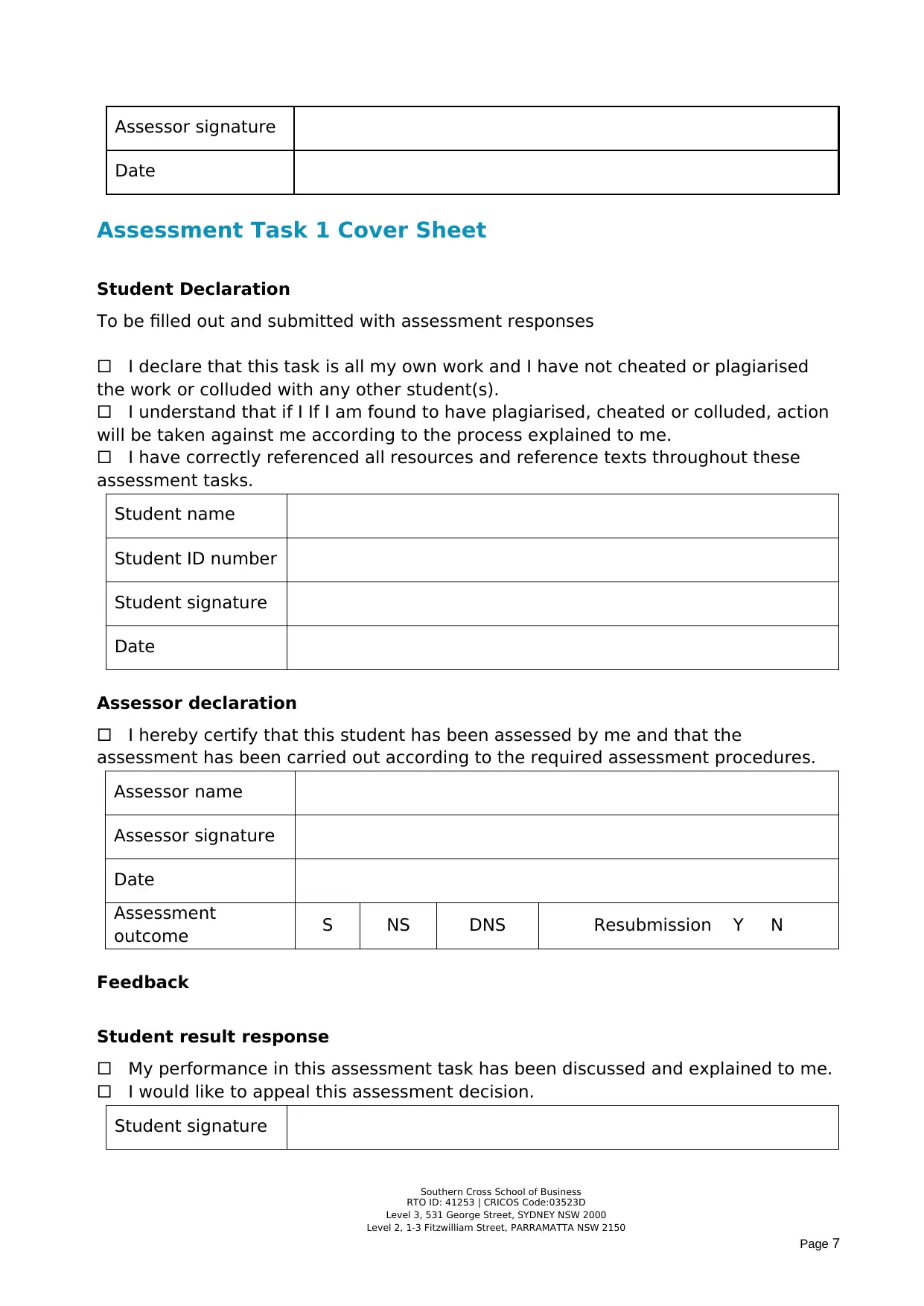
Assessor signature
Date
Assessment Task 1 Cover Sheet
Student Declaration
To be filled out and submitted with assessment responses
I declare that this task is all my own work and I have not cheated or plagiarised
the work or colluded with any other student(s).
I understand that if I If I am found to have plagiarised, cheated or colluded, action
will be taken against me according to the process explained to me.
I have correctly referenced all resources and reference texts throughout these
assessment tasks.
Student name
Student ID number
Student signature
Date
Assessor declaration
I hereby certify that this student has been assessed by me and that the
assessment has been carried out according to the required assessment procedures.
Assessor name
Assessor signature
Date
Assessment
outcome S NS DNS Resubmission Y N
Feedback
Student result response
My performance in this assessment task has been discussed and explained to me.
I would like to appeal this assessment decision.
Student signature
Southern Cross School of Business
RTO ID: 41253 | CRICOS Code:03523D
Level 3, 531 George Street, SYDNEY NSW 2000
Level 2, 1-3 Fitzwilliam Street, PARRAMATTA NSW 2150
Page 7
Date
Assessment Task 1 Cover Sheet
Student Declaration
To be filled out and submitted with assessment responses
I declare that this task is all my own work and I have not cheated or plagiarised
the work or colluded with any other student(s).
I understand that if I If I am found to have plagiarised, cheated or colluded, action
will be taken against me according to the process explained to me.
I have correctly referenced all resources and reference texts throughout these
assessment tasks.
Student name
Student ID number
Student signature
Date
Assessor declaration
I hereby certify that this student has been assessed by me and that the
assessment has been carried out according to the required assessment procedures.
Assessor name
Assessor signature
Date
Assessment
outcome S NS DNS Resubmission Y N
Feedback
Student result response
My performance in this assessment task has been discussed and explained to me.
I would like to appeal this assessment decision.
Student signature
Southern Cross School of Business
RTO ID: 41253 | CRICOS Code:03523D
Level 3, 531 George Street, SYDNEY NSW 2000
Level 2, 1-3 Fitzwilliam Street, PARRAMATTA NSW 2150
Page 7
Paraphrase This Document
Need a fresh take? Get an instant paraphrase of this document with our AI Paraphraser

Date
A copy of this page must be supplied to the office and kept in the student’s file with
the evidence.
Southern Cross School of Business
RTO ID: 41253 | CRICOS Code:03523D
Level 3, 531 George Street, SYDNEY NSW 2000
Level 2, 1-3 Fitzwilliam Street, PARRAMATTA NSW 2150
Page 8
A copy of this page must be supplied to the office and kept in the student’s file with
the evidence.
Southern Cross School of Business
RTO ID: 41253 | CRICOS Code:03523D
Level 3, 531 George Street, SYDNEY NSW 2000
Level 2, 1-3 Fitzwilliam Street, PARRAMATTA NSW 2150
Page 8
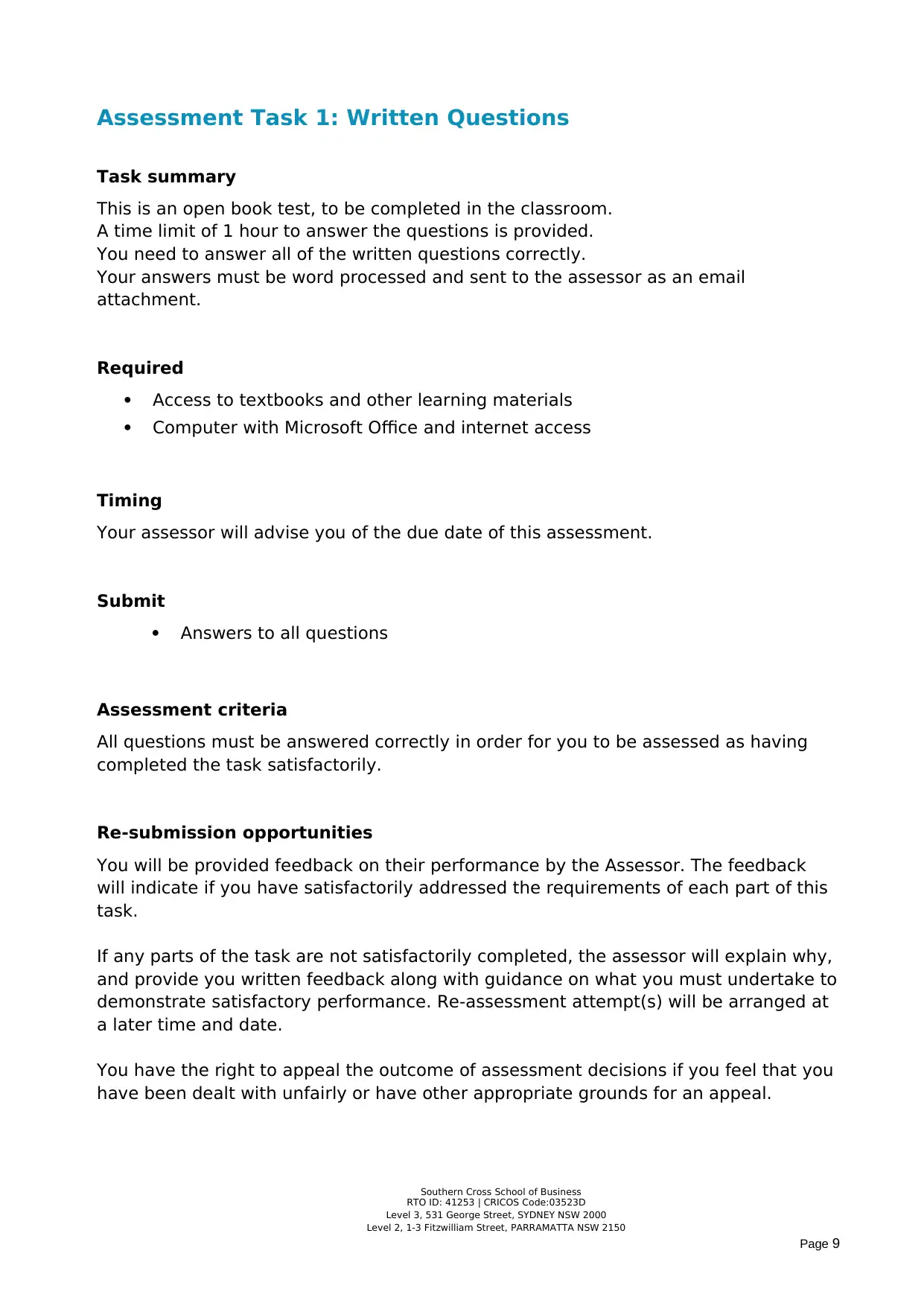
Assessment Task 1: Written Questions
Task summary
This is an open book test, to be completed in the classroom.
A time limit of 1 hour to answer the questions is provided.
You need to answer all of the written questions correctly.
Your answers must be word processed and sent to the assessor as an email
attachment.
Required
Access to textbooks and other learning materials
Computer with Microsoft Office and internet access
Timing
Your assessor will advise you of the due date of this assessment.
Submit
Answers to all questions
Assessment criteria
All questions must be answered correctly in order for you to be assessed as having
completed the task satisfactorily.
Re-submission opportunities
You will be provided feedback on their performance by the Assessor. The feedback
will indicate if you have satisfactorily addressed the requirements of each part of this
task.
If any parts of the task are not satisfactorily completed, the assessor will explain why,
and provide you written feedback along with guidance on what you must undertake to
demonstrate satisfactory performance. Re-assessment attempt(s) will be arranged at
a later time and date.
You have the right to appeal the outcome of assessment decisions if you feel that you
have been dealt with unfairly or have other appropriate grounds for an appeal.
Southern Cross School of Business
RTO ID: 41253 | CRICOS Code:03523D
Level 3, 531 George Street, SYDNEY NSW 2000
Level 2, 1-3 Fitzwilliam Street, PARRAMATTA NSW 2150
Page 9
Task summary
This is an open book test, to be completed in the classroom.
A time limit of 1 hour to answer the questions is provided.
You need to answer all of the written questions correctly.
Your answers must be word processed and sent to the assessor as an email
attachment.
Required
Access to textbooks and other learning materials
Computer with Microsoft Office and internet access
Timing
Your assessor will advise you of the due date of this assessment.
Submit
Answers to all questions
Assessment criteria
All questions must be answered correctly in order for you to be assessed as having
completed the task satisfactorily.
Re-submission opportunities
You will be provided feedback on their performance by the Assessor. The feedback
will indicate if you have satisfactorily addressed the requirements of each part of this
task.
If any parts of the task are not satisfactorily completed, the assessor will explain why,
and provide you written feedback along with guidance on what you must undertake to
demonstrate satisfactory performance. Re-assessment attempt(s) will be arranged at
a later time and date.
You have the right to appeal the outcome of assessment decisions if you feel that you
have been dealt with unfairly or have other appropriate grounds for an appeal.
Southern Cross School of Business
RTO ID: 41253 | CRICOS Code:03523D
Level 3, 531 George Street, SYDNEY NSW 2000
Level 2, 1-3 Fitzwilliam Street, PARRAMATTA NSW 2150
Page 9

You are encouraged to consult with the assessor prior to attempting this task if you do
not understand any part of this task or if you have any learning issues or needs that
may hinder you when attempting any part of the assessment.
Southern Cross School of Business
RTO ID: 41253 | CRICOS Code:03523D
Level 3, 531 George Street, SYDNEY NSW 2000
Level 2, 1-3 Fitzwilliam Street, PARRAMATTA NSW 2150
Page 10
not understand any part of this task or if you have any learning issues or needs that
may hinder you when attempting any part of the assessment.
Southern Cross School of Business
RTO ID: 41253 | CRICOS Code:03523D
Level 3, 531 George Street, SYDNEY NSW 2000
Level 2, 1-3 Fitzwilliam Street, PARRAMATTA NSW 2150
Page 10
Secure Best Marks with AI Grader
Need help grading? Try our AI Grader for instant feedback on your assignments.
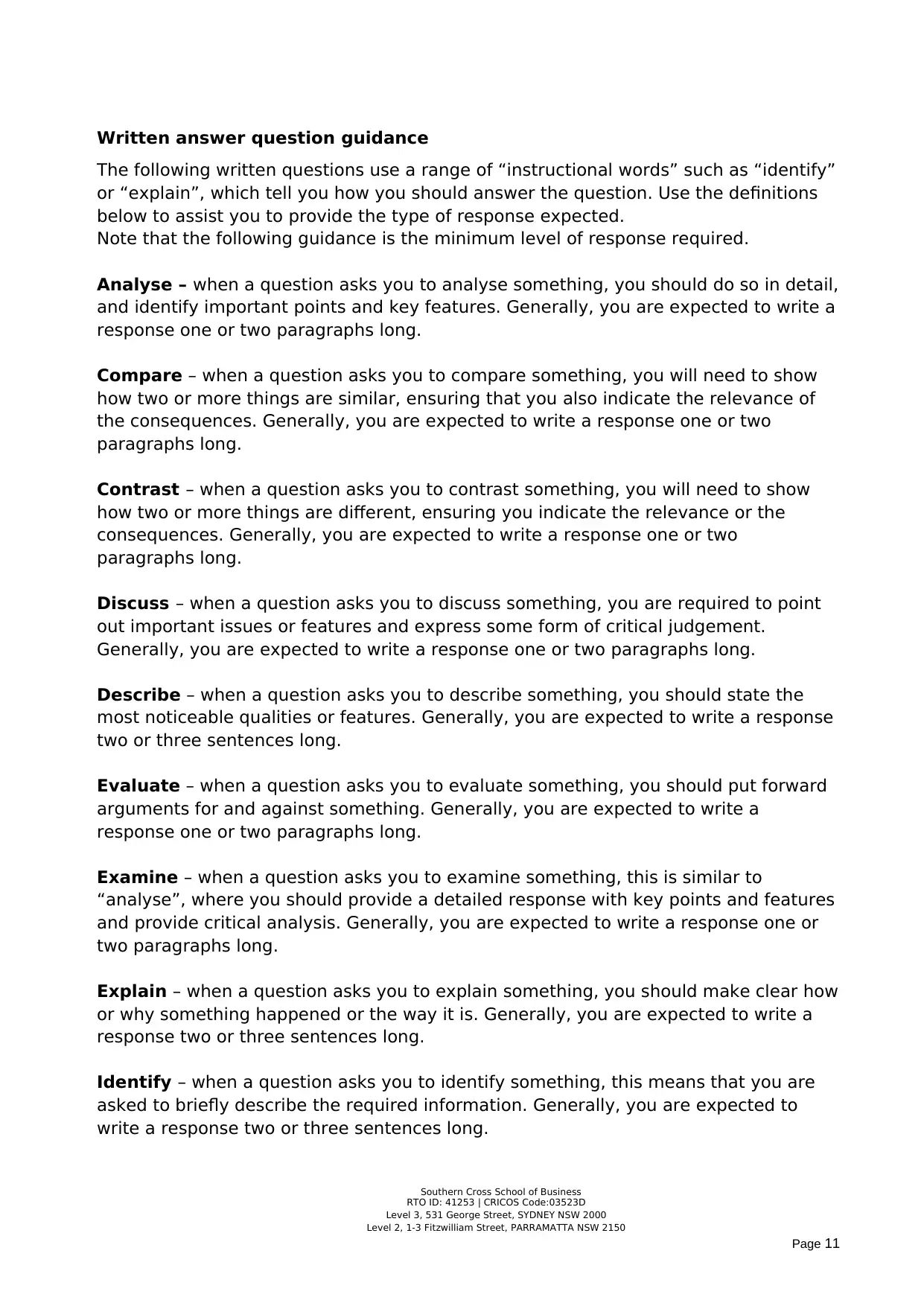
Written answer question guidance
The following written questions use a range of “instructional words” such as “identify”
or “explain”, which tell you how you should answer the question. Use the definitions
below to assist you to provide the type of response expected.
Note that the following guidance is the minimum level of response required.
Analyse – when a question asks you to analyse something, you should do so in detail,
and identify important points and key features. Generally, you are expected to write a
response one or two paragraphs long.
Compare – when a question asks you to compare something, you will need to show
how two or more things are similar, ensuring that you also indicate the relevance of
the consequences. Generally, you are expected to write a response one or two
paragraphs long.
Contrast – when a question asks you to contrast something, you will need to show
how two or more things are different, ensuring you indicate the relevance or the
consequences. Generally, you are expected to write a response one or two
paragraphs long.
Discuss – when a question asks you to discuss something, you are required to point
out important issues or features and express some form of critical judgement.
Generally, you are expected to write a response one or two paragraphs long.
Describe – when a question asks you to describe something, you should state the
most noticeable qualities or features. Generally, you are expected to write a response
two or three sentences long.
Evaluate – when a question asks you to evaluate something, you should put forward
arguments for and against something. Generally, you are expected to write a
response one or two paragraphs long.
Examine – when a question asks you to examine something, this is similar to
“analyse”, where you should provide a detailed response with key points and features
and provide critical analysis. Generally, you are expected to write a response one or
two paragraphs long.
Explain – when a question asks you to explain something, you should make clear how
or why something happened or the way it is. Generally, you are expected to write a
response two or three sentences long.
Identify – when a question asks you to identify something, this means that you are
asked to briefly describe the required information. Generally, you are expected to
write a response two or three sentences long.
Southern Cross School of Business
RTO ID: 41253 | CRICOS Code:03523D
Level 3, 531 George Street, SYDNEY NSW 2000
Level 2, 1-3 Fitzwilliam Street, PARRAMATTA NSW 2150
Page 11
The following written questions use a range of “instructional words” such as “identify”
or “explain”, which tell you how you should answer the question. Use the definitions
below to assist you to provide the type of response expected.
Note that the following guidance is the minimum level of response required.
Analyse – when a question asks you to analyse something, you should do so in detail,
and identify important points and key features. Generally, you are expected to write a
response one or two paragraphs long.
Compare – when a question asks you to compare something, you will need to show
how two or more things are similar, ensuring that you also indicate the relevance of
the consequences. Generally, you are expected to write a response one or two
paragraphs long.
Contrast – when a question asks you to contrast something, you will need to show
how two or more things are different, ensuring you indicate the relevance or the
consequences. Generally, you are expected to write a response one or two
paragraphs long.
Discuss – when a question asks you to discuss something, you are required to point
out important issues or features and express some form of critical judgement.
Generally, you are expected to write a response one or two paragraphs long.
Describe – when a question asks you to describe something, you should state the
most noticeable qualities or features. Generally, you are expected to write a response
two or three sentences long.
Evaluate – when a question asks you to evaluate something, you should put forward
arguments for and against something. Generally, you are expected to write a
response one or two paragraphs long.
Examine – when a question asks you to examine something, this is similar to
“analyse”, where you should provide a detailed response with key points and features
and provide critical analysis. Generally, you are expected to write a response one or
two paragraphs long.
Explain – when a question asks you to explain something, you should make clear how
or why something happened or the way it is. Generally, you are expected to write a
response two or three sentences long.
Identify – when a question asks you to identify something, this means that you are
asked to briefly describe the required information. Generally, you are expected to
write a response two or three sentences long.
Southern Cross School of Business
RTO ID: 41253 | CRICOS Code:03523D
Level 3, 531 George Street, SYDNEY NSW 2000
Level 2, 1-3 Fitzwilliam Street, PARRAMATTA NSW 2150
Page 11
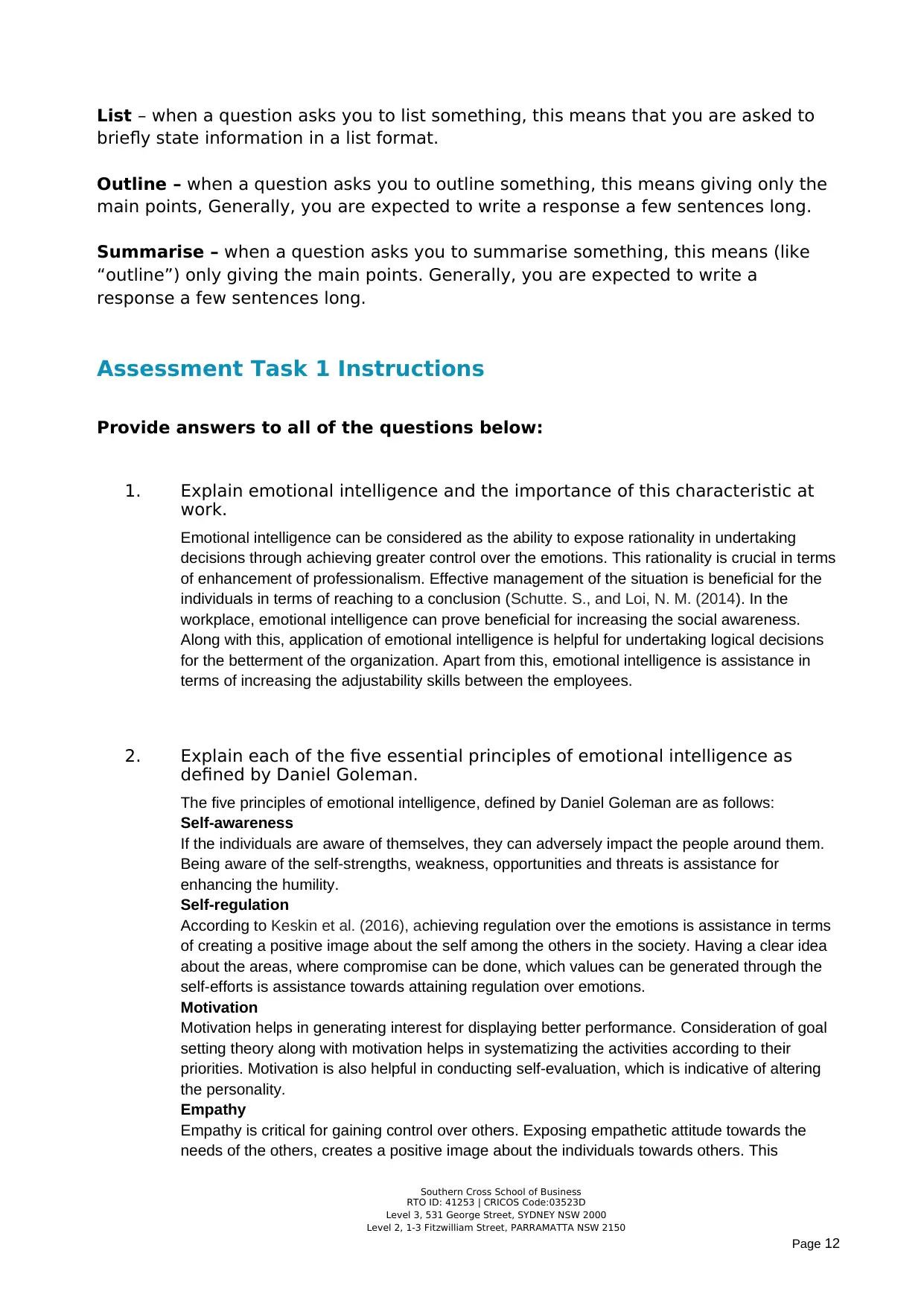
List – when a question asks you to list something, this means that you are asked to
briefly state information in a list format.
Outline – when a question asks you to outline something, this means giving only the
main points, Generally, you are expected to write a response a few sentences long.
Summarise – when a question asks you to summarise something, this means (like
“outline”) only giving the main points. Generally, you are expected to write a
response a few sentences long.
Assessment Task 1 Instructions
Provide answers to all of the questions below:
1. Explain emotional intelligence and the importance of this characteristic at
work.
Emotional intelligence can be considered as the ability to expose rationality in undertaking
decisions through achieving greater control over the emotions. This rationality is crucial in terms
of enhancement of professionalism. Effective management of the situation is beneficial for the
individuals in terms of reaching to a conclusion (Schutte. S., and Loi, N. M. (2014). In the
workplace, emotional intelligence can prove beneficial for increasing the social awareness.
Along with this, application of emotional intelligence is helpful for undertaking logical decisions
for the betterment of the organization. Apart from this, emotional intelligence is assistance in
terms of increasing the adjustability skills between the employees.
2. Explain each of the five essential principles of emotional intelligence as
defined by Daniel Goleman.
The five principles of emotional intelligence, defined by Daniel Goleman are as follows:
Self-awareness
If the individuals are aware of themselves, they can adversely impact the people around them.
Being aware of the self-strengths, weakness, opportunities and threats is assistance for
enhancing the humility.
Self-regulation
According to Keskin et al. (2016), achieving regulation over the emotions is assistance in terms
of creating a positive image about the self among the others in the society. Having a clear idea
about the areas, where compromise can be done, which values can be generated through the
self-efforts is assistance towards attaining regulation over emotions.
Motivation
Motivation helps in generating interest for displaying better performance. Consideration of goal
setting theory along with motivation helps in systematizing the activities according to their
priorities. Motivation is also helpful in conducting self-evaluation, which is indicative of altering
the personality.
Empathy
Empathy is critical for gaining control over others. Exposing empathetic attitude towards the
needs of the others, creates a positive image about the individuals towards others. This
Southern Cross School of Business
RTO ID: 41253 | CRICOS Code:03523D
Level 3, 531 George Street, SYDNEY NSW 2000
Level 2, 1-3 Fitzwilliam Street, PARRAMATTA NSW 2150
Page 12
briefly state information in a list format.
Outline – when a question asks you to outline something, this means giving only the
main points, Generally, you are expected to write a response a few sentences long.
Summarise – when a question asks you to summarise something, this means (like
“outline”) only giving the main points. Generally, you are expected to write a
response a few sentences long.
Assessment Task 1 Instructions
Provide answers to all of the questions below:
1. Explain emotional intelligence and the importance of this characteristic at
work.
Emotional intelligence can be considered as the ability to expose rationality in undertaking
decisions through achieving greater control over the emotions. This rationality is crucial in terms
of enhancement of professionalism. Effective management of the situation is beneficial for the
individuals in terms of reaching to a conclusion (Schutte. S., and Loi, N. M. (2014). In the
workplace, emotional intelligence can prove beneficial for increasing the social awareness.
Along with this, application of emotional intelligence is helpful for undertaking logical decisions
for the betterment of the organization. Apart from this, emotional intelligence is assistance in
terms of increasing the adjustability skills between the employees.
2. Explain each of the five essential principles of emotional intelligence as
defined by Daniel Goleman.
The five principles of emotional intelligence, defined by Daniel Goleman are as follows:
Self-awareness
If the individuals are aware of themselves, they can adversely impact the people around them.
Being aware of the self-strengths, weakness, opportunities and threats is assistance for
enhancing the humility.
Self-regulation
According to Keskin et al. (2016), achieving regulation over the emotions is assistance in terms
of creating a positive image about the self among the others in the society. Having a clear idea
about the areas, where compromise can be done, which values can be generated through the
self-efforts is assistance towards attaining regulation over emotions.
Motivation
Motivation helps in generating interest for displaying better performance. Consideration of goal
setting theory along with motivation helps in systematizing the activities according to their
priorities. Motivation is also helpful in conducting self-evaluation, which is indicative of altering
the personality.
Empathy
Empathy is critical for gaining control over others. Exposing empathetic attitude towards the
needs of the others, creates a positive image about the individuals towards others. This
Southern Cross School of Business
RTO ID: 41253 | CRICOS Code:03523D
Level 3, 531 George Street, SYDNEY NSW 2000
Level 2, 1-3 Fitzwilliam Street, PARRAMATTA NSW 2150
Page 12

understanding nature is effective for enhancing the unity and collaboration within the team
members.
Social skills
Individuals, who have high command over the social skills are great communicators. They have
great adjustability skills, which helps them to mix well with the people in the surroundings
(Krishnakumar et al. 2016).
Southern Cross School of Business
RTO ID: 41253 | CRICOS Code:03523D
Level 3, 531 George Street, SYDNEY NSW 2000
Level 2, 1-3 Fitzwilliam Street, PARRAMATTA NSW 2150
Page 13
members.
Social skills
Individuals, who have high command over the social skills are great communicators. They have
great adjustability skills, which helps them to mix well with the people in the surroundings
(Krishnakumar et al. 2016).
Southern Cross School of Business
RTO ID: 41253 | CRICOS Code:03523D
Level 3, 531 George Street, SYDNEY NSW 2000
Level 2, 1-3 Fitzwilliam Street, PARRAMATTA NSW 2150
Page 13
Paraphrase This Document
Need a fresh take? Get an instant paraphrase of this document with our AI Paraphraser
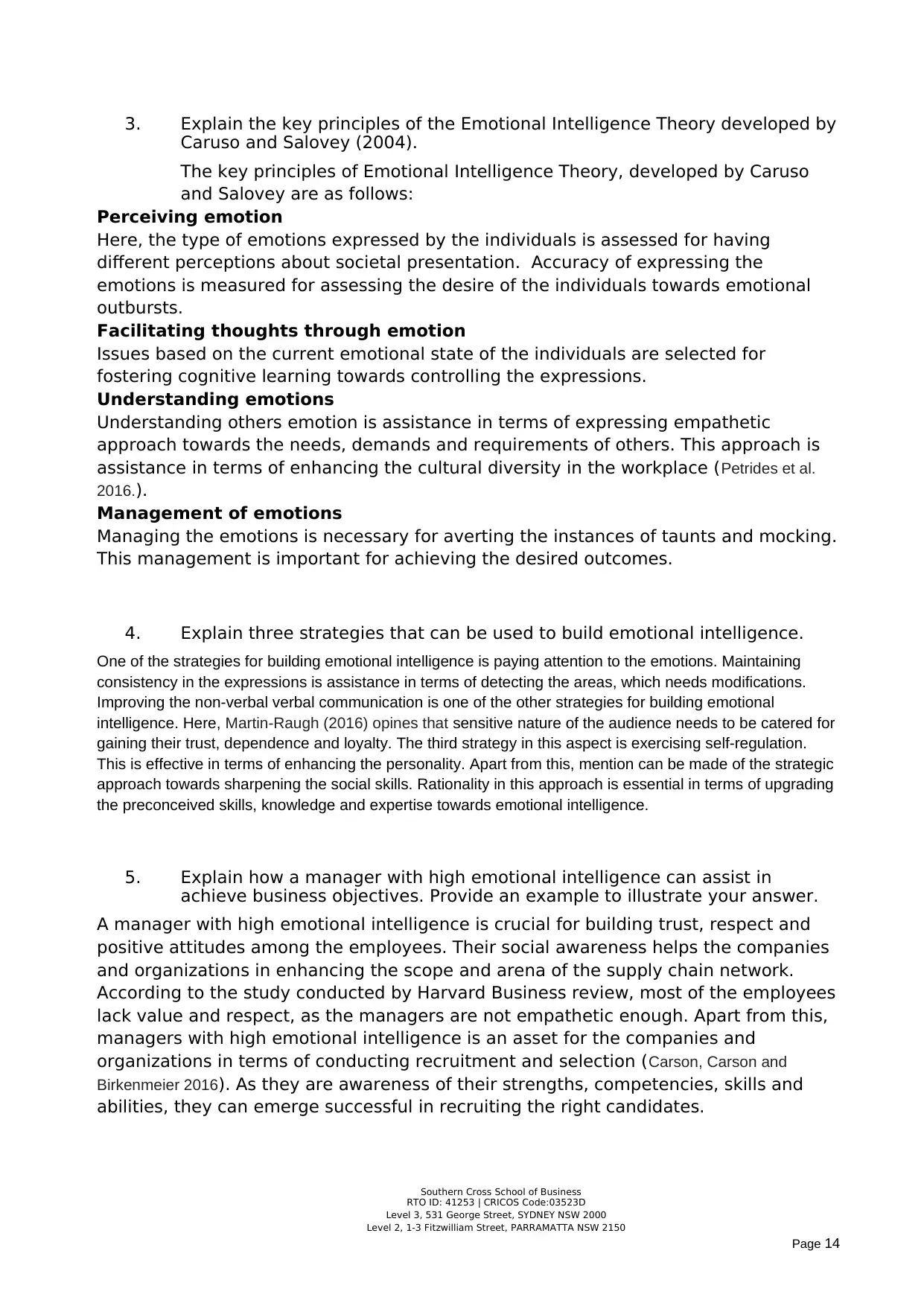
3. Explain the key principles of the Emotional Intelligence Theory developed by
Caruso and Salovey (2004).
The key principles of Emotional Intelligence Theory, developed by Caruso
and Salovey are as follows:
Perceiving emotion
Here, the type of emotions expressed by the individuals is assessed for having
different perceptions about societal presentation. Accuracy of expressing the
emotions is measured for assessing the desire of the individuals towards emotional
outbursts.
Facilitating thoughts through emotion
Issues based on the current emotional state of the individuals are selected for
fostering cognitive learning towards controlling the expressions.
Understanding emotions
Understanding others emotion is assistance in terms of expressing empathetic
approach towards the needs, demands and requirements of others. This approach is
assistance in terms of enhancing the cultural diversity in the workplace (Petrides et al.
2016.).
Management of emotions
Managing the emotions is necessary for averting the instances of taunts and mocking.
This management is important for achieving the desired outcomes.
4. Explain three strategies that can be used to build emotional intelligence.
One of the strategies for building emotional intelligence is paying attention to the emotions. Maintaining
consistency in the expressions is assistance in terms of detecting the areas, which needs modifications.
Improving the non-verbal verbal communication is one of the other strategies for building emotional
intelligence. Here, Martin-Raugh (2016) opines that sensitive nature of the audience needs to be catered for
gaining their trust, dependence and loyalty. The third strategy in this aspect is exercising self-regulation.
This is effective in terms of enhancing the personality. Apart from this, mention can be made of the strategic
approach towards sharpening the social skills. Rationality in this approach is essential in terms of upgrading
the preconceived skills, knowledge and expertise towards emotional intelligence.
5. Explain how a manager with high emotional intelligence can assist in
achieve business objectives. Provide an example to illustrate your answer.
A manager with high emotional intelligence is crucial for building trust, respect and
positive attitudes among the employees. Their social awareness helps the companies
and organizations in enhancing the scope and arena of the supply chain network.
According to the study conducted by Harvard Business review, most of the employees
lack value and respect, as the managers are not empathetic enough. Apart from this,
managers with high emotional intelligence is an asset for the companies and
organizations in terms of conducting recruitment and selection (Carson, Carson and
Birkenmeier 2016). As they are awareness of their strengths, competencies, skills and
abilities, they can emerge successful in recruiting the right candidates.
Southern Cross School of Business
RTO ID: 41253 | CRICOS Code:03523D
Level 3, 531 George Street, SYDNEY NSW 2000
Level 2, 1-3 Fitzwilliam Street, PARRAMATTA NSW 2150
Page 14
Caruso and Salovey (2004).
The key principles of Emotional Intelligence Theory, developed by Caruso
and Salovey are as follows:
Perceiving emotion
Here, the type of emotions expressed by the individuals is assessed for having
different perceptions about societal presentation. Accuracy of expressing the
emotions is measured for assessing the desire of the individuals towards emotional
outbursts.
Facilitating thoughts through emotion
Issues based on the current emotional state of the individuals are selected for
fostering cognitive learning towards controlling the expressions.
Understanding emotions
Understanding others emotion is assistance in terms of expressing empathetic
approach towards the needs, demands and requirements of others. This approach is
assistance in terms of enhancing the cultural diversity in the workplace (Petrides et al.
2016.).
Management of emotions
Managing the emotions is necessary for averting the instances of taunts and mocking.
This management is important for achieving the desired outcomes.
4. Explain three strategies that can be used to build emotional intelligence.
One of the strategies for building emotional intelligence is paying attention to the emotions. Maintaining
consistency in the expressions is assistance in terms of detecting the areas, which needs modifications.
Improving the non-verbal verbal communication is one of the other strategies for building emotional
intelligence. Here, Martin-Raugh (2016) opines that sensitive nature of the audience needs to be catered for
gaining their trust, dependence and loyalty. The third strategy in this aspect is exercising self-regulation.
This is effective in terms of enhancing the personality. Apart from this, mention can be made of the strategic
approach towards sharpening the social skills. Rationality in this approach is essential in terms of upgrading
the preconceived skills, knowledge and expertise towards emotional intelligence.
5. Explain how a manager with high emotional intelligence can assist in
achieve business objectives. Provide an example to illustrate your answer.
A manager with high emotional intelligence is crucial for building trust, respect and
positive attitudes among the employees. Their social awareness helps the companies
and organizations in enhancing the scope and arena of the supply chain network.
According to the study conducted by Harvard Business review, most of the employees
lack value and respect, as the managers are not empathetic enough. Apart from this,
managers with high emotional intelligence is an asset for the companies and
organizations in terms of conducting recruitment and selection (Carson, Carson and
Birkenmeier 2016). As they are awareness of their strengths, competencies, skills and
abilities, they can emerge successful in recruiting the right candidates.
Southern Cross School of Business
RTO ID: 41253 | CRICOS Code:03523D
Level 3, 531 George Street, SYDNEY NSW 2000
Level 2, 1-3 Fitzwilliam Street, PARRAMATTA NSW 2150
Page 14
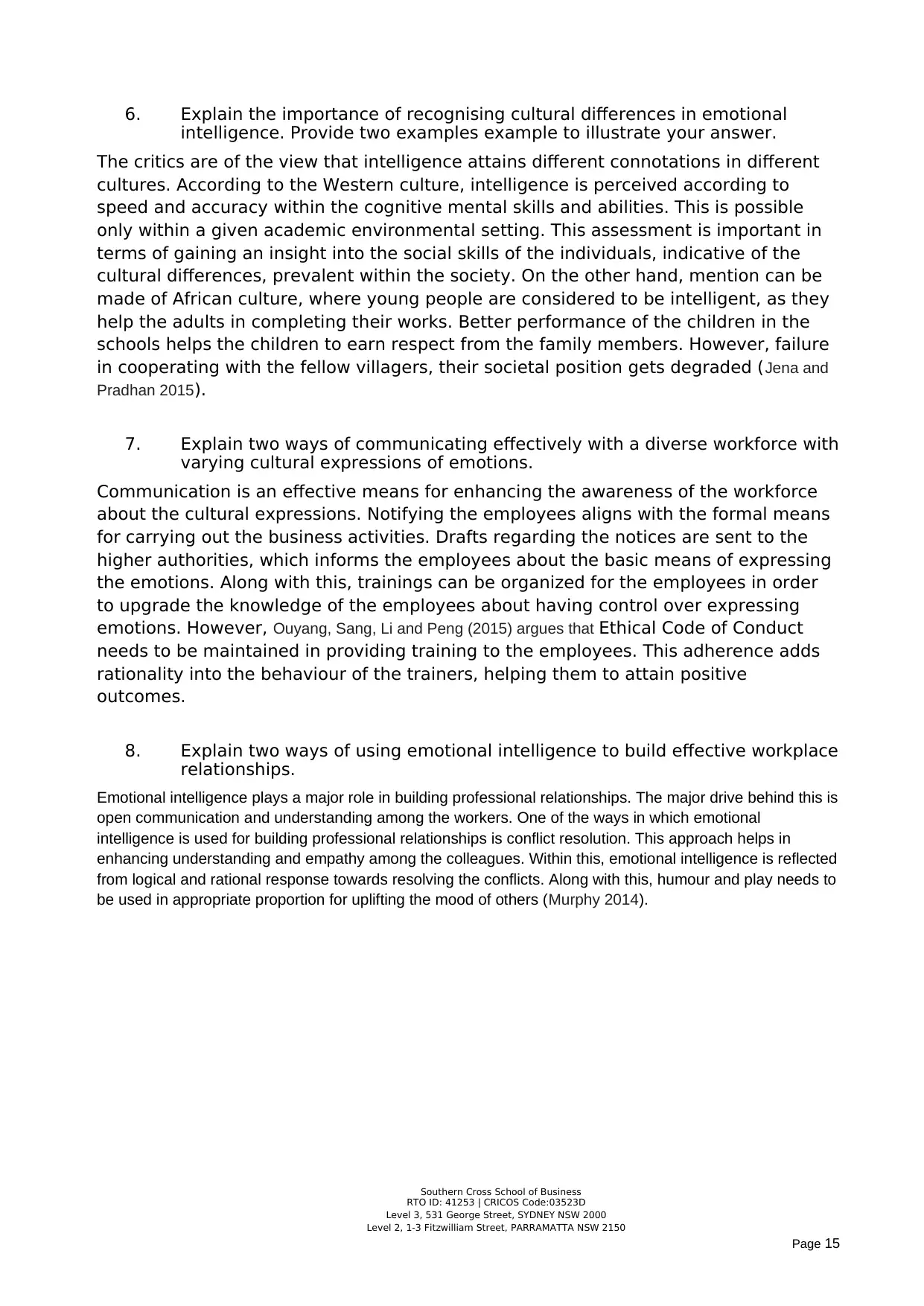
6. Explain the importance of recognising cultural differences in emotional
intelligence. Provide two examples example to illustrate your answer.
The critics are of the view that intelligence attains different connotations in different
cultures. According to the Western culture, intelligence is perceived according to
speed and accuracy within the cognitive mental skills and abilities. This is possible
only within a given academic environmental setting. This assessment is important in
terms of gaining an insight into the social skills of the individuals, indicative of the
cultural differences, prevalent within the society. On the other hand, mention can be
made of African culture, where young people are considered to be intelligent, as they
help the adults in completing their works. Better performance of the children in the
schools helps the children to earn respect from the family members. However, failure
in cooperating with the fellow villagers, their societal position gets degraded (Jena and
Pradhan 2015).
7. Explain two ways of communicating effectively with a diverse workforce with
varying cultural expressions of emotions.
Communication is an effective means for enhancing the awareness of the workforce
about the cultural expressions. Notifying the employees aligns with the formal means
for carrying out the business activities. Drafts regarding the notices are sent to the
higher authorities, which informs the employees about the basic means of expressing
the emotions. Along with this, trainings can be organized for the employees in order
to upgrade the knowledge of the employees about having control over expressing
emotions. However, Ouyang, Sang, Li and Peng (2015) argues that Ethical Code of Conduct
needs to be maintained in providing training to the employees. This adherence adds
rationality into the behaviour of the trainers, helping them to attain positive
outcomes.
8. Explain two ways of using emotional intelligence to build effective workplace
relationships.
Emotional intelligence plays a major role in building professional relationships. The major drive behind this is
open communication and understanding among the workers. One of the ways in which emotional
intelligence is used for building professional relationships is conflict resolution. This approach helps in
enhancing understanding and empathy among the colleagues. Within this, emotional intelligence is reflected
from logical and rational response towards resolving the conflicts. Along with this, humour and play needs to
be used in appropriate proportion for uplifting the mood of others (Murphy 2014).
Southern Cross School of Business
RTO ID: 41253 | CRICOS Code:03523D
Level 3, 531 George Street, SYDNEY NSW 2000
Level 2, 1-3 Fitzwilliam Street, PARRAMATTA NSW 2150
Page 15
intelligence. Provide two examples example to illustrate your answer.
The critics are of the view that intelligence attains different connotations in different
cultures. According to the Western culture, intelligence is perceived according to
speed and accuracy within the cognitive mental skills and abilities. This is possible
only within a given academic environmental setting. This assessment is important in
terms of gaining an insight into the social skills of the individuals, indicative of the
cultural differences, prevalent within the society. On the other hand, mention can be
made of African culture, where young people are considered to be intelligent, as they
help the adults in completing their works. Better performance of the children in the
schools helps the children to earn respect from the family members. However, failure
in cooperating with the fellow villagers, their societal position gets degraded (Jena and
Pradhan 2015).
7. Explain two ways of communicating effectively with a diverse workforce with
varying cultural expressions of emotions.
Communication is an effective means for enhancing the awareness of the workforce
about the cultural expressions. Notifying the employees aligns with the formal means
for carrying out the business activities. Drafts regarding the notices are sent to the
higher authorities, which informs the employees about the basic means of expressing
the emotions. Along with this, trainings can be organized for the employees in order
to upgrade the knowledge of the employees about having control over expressing
emotions. However, Ouyang, Sang, Li and Peng (2015) argues that Ethical Code of Conduct
needs to be maintained in providing training to the employees. This adherence adds
rationality into the behaviour of the trainers, helping them to attain positive
outcomes.
8. Explain two ways of using emotional intelligence to build effective workplace
relationships.
Emotional intelligence plays a major role in building professional relationships. The major drive behind this is
open communication and understanding among the workers. One of the ways in which emotional
intelligence is used for building professional relationships is conflict resolution. This approach helps in
enhancing understanding and empathy among the colleagues. Within this, emotional intelligence is reflected
from logical and rational response towards resolving the conflicts. Along with this, humour and play needs to
be used in appropriate proportion for uplifting the mood of others (Murphy 2014).
Southern Cross School of Business
RTO ID: 41253 | CRICOS Code:03523D
Level 3, 531 George Street, SYDNEY NSW 2000
Level 2, 1-3 Fitzwilliam Street, PARRAMATTA NSW 2150
Page 15
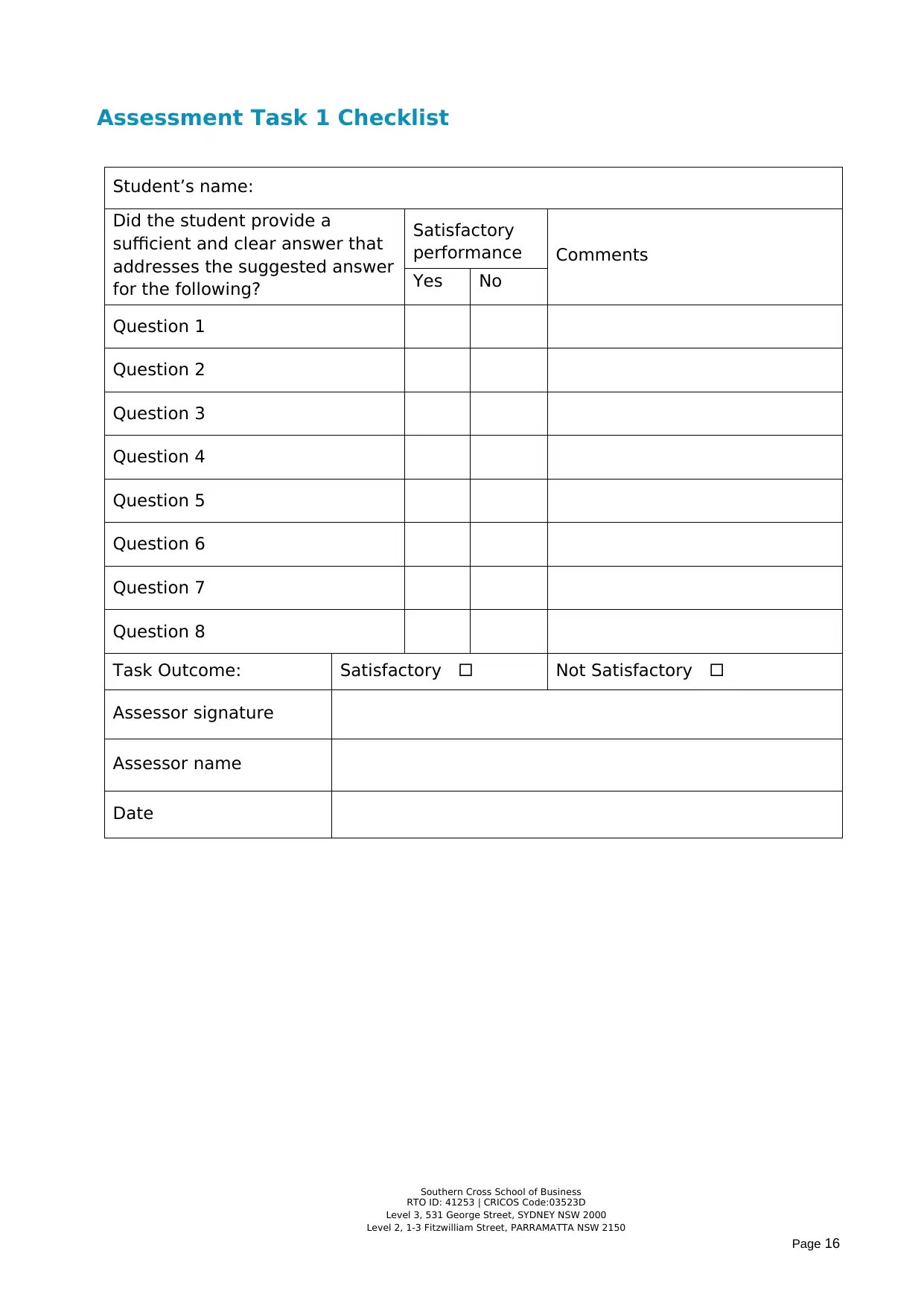
Assessment Task 1 Checklist
Student’s name:
Did the student provide a
sufficient and clear answer that
addresses the suggested answer
for the following?
Satisfactory
performance Comments
Yes No
Question 1
Question 2
Question 3
Question 4
Question 5
Question 6
Question 7
Question 8
Task Outcome: Satisfactory Not Satisfactory
Assessor signature
Assessor name
Date
Southern Cross School of Business
RTO ID: 41253 | CRICOS Code:03523D
Level 3, 531 George Street, SYDNEY NSW 2000
Level 2, 1-3 Fitzwilliam Street, PARRAMATTA NSW 2150
Page 16
Student’s name:
Did the student provide a
sufficient and clear answer that
addresses the suggested answer
for the following?
Satisfactory
performance Comments
Yes No
Question 1
Question 2
Question 3
Question 4
Question 5
Question 6
Question 7
Question 8
Task Outcome: Satisfactory Not Satisfactory
Assessor signature
Assessor name
Date
Southern Cross School of Business
RTO ID: 41253 | CRICOS Code:03523D
Level 3, 531 George Street, SYDNEY NSW 2000
Level 2, 1-3 Fitzwilliam Street, PARRAMATTA NSW 2150
Page 16
Secure Best Marks with AI Grader
Need help grading? Try our AI Grader for instant feedback on your assignments.
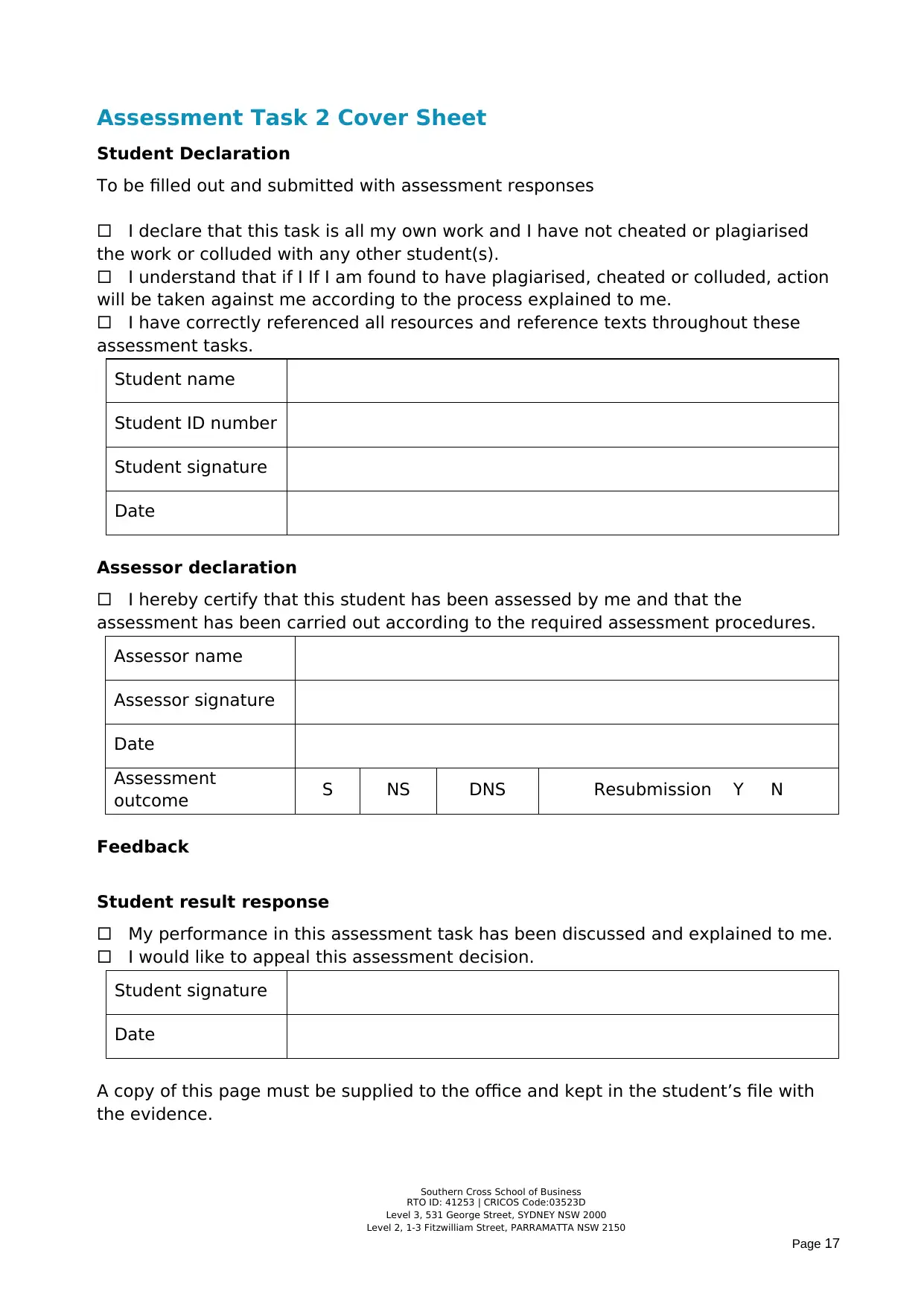
Assessment Task 2 Cover Sheet
Student Declaration
To be filled out and submitted with assessment responses
I declare that this task is all my own work and I have not cheated or plagiarised
the work or colluded with any other student(s).
I understand that if I If I am found to have plagiarised, cheated or colluded, action
will be taken against me according to the process explained to me.
I have correctly referenced all resources and reference texts throughout these
assessment tasks.
Student name
Student ID number
Student signature
Date
Assessor declaration
I hereby certify that this student has been assessed by me and that the
assessment has been carried out according to the required assessment procedures.
Assessor name
Assessor signature
Date
Assessment
outcome S NS DNS Resubmission Y N
Feedback
Student result response
My performance in this assessment task has been discussed and explained to me.
I would like to appeal this assessment decision.
Student signature
Date
A copy of this page must be supplied to the office and kept in the student’s file with
the evidence.
Southern Cross School of Business
RTO ID: 41253 | CRICOS Code:03523D
Level 3, 531 George Street, SYDNEY NSW 2000
Level 2, 1-3 Fitzwilliam Street, PARRAMATTA NSW 2150
Page 17
Student Declaration
To be filled out and submitted with assessment responses
I declare that this task is all my own work and I have not cheated or plagiarised
the work or colluded with any other student(s).
I understand that if I If I am found to have plagiarised, cheated or colluded, action
will be taken against me according to the process explained to me.
I have correctly referenced all resources and reference texts throughout these
assessment tasks.
Student name
Student ID number
Student signature
Date
Assessor declaration
I hereby certify that this student has been assessed by me and that the
assessment has been carried out according to the required assessment procedures.
Assessor name
Assessor signature
Date
Assessment
outcome S NS DNS Resubmission Y N
Feedback
Student result response
My performance in this assessment task has been discussed and explained to me.
I would like to appeal this assessment decision.
Student signature
Date
A copy of this page must be supplied to the office and kept in the student’s file with
the evidence.
Southern Cross School of Business
RTO ID: 41253 | CRICOS Code:03523D
Level 3, 531 George Street, SYDNEY NSW 2000
Level 2, 1-3 Fitzwilliam Street, PARRAMATTA NSW 2150
Page 17
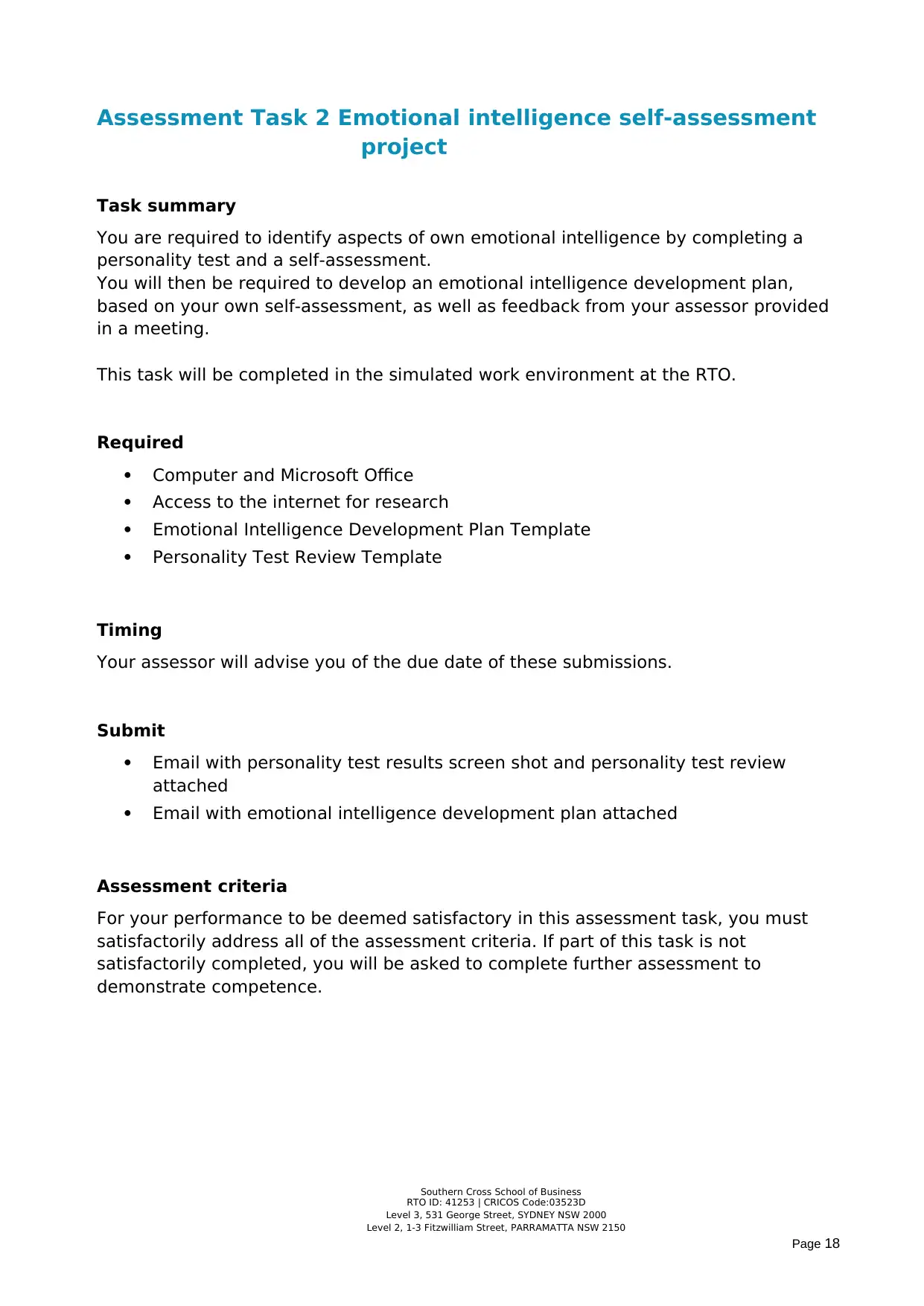
Assessment Task 2 Emotional intelligence self-assessment
project
Task summary
You are required to identify aspects of own emotional intelligence by completing a
personality test and a self-assessment.
You will then be required to develop an emotional intelligence development plan,
based on your own self-assessment, as well as feedback from your assessor provided
in a meeting.
This task will be completed in the simulated work environment at the RTO.
Required
Computer and Microsoft Office
Access to the internet for research
Emotional Intelligence Development Plan Template
Personality Test Review Template
Timing
Your assessor will advise you of the due date of these submissions.
Submit
Email with personality test results screen shot and personality test review
attached
Email with emotional intelligence development plan attached
Assessment criteria
For your performance to be deemed satisfactory in this assessment task, you must
satisfactorily address all of the assessment criteria. If part of this task is not
satisfactorily completed, you will be asked to complete further assessment to
demonstrate competence.
Southern Cross School of Business
RTO ID: 41253 | CRICOS Code:03523D
Level 3, 531 George Street, SYDNEY NSW 2000
Level 2, 1-3 Fitzwilliam Street, PARRAMATTA NSW 2150
Page 18
project
Task summary
You are required to identify aspects of own emotional intelligence by completing a
personality test and a self-assessment.
You will then be required to develop an emotional intelligence development plan,
based on your own self-assessment, as well as feedback from your assessor provided
in a meeting.
This task will be completed in the simulated work environment at the RTO.
Required
Computer and Microsoft Office
Access to the internet for research
Emotional Intelligence Development Plan Template
Personality Test Review Template
Timing
Your assessor will advise you of the due date of these submissions.
Submit
Email with personality test results screen shot and personality test review
attached
Email with emotional intelligence development plan attached
Assessment criteria
For your performance to be deemed satisfactory in this assessment task, you must
satisfactorily address all of the assessment criteria. If part of this task is not
satisfactorily completed, you will be asked to complete further assessment to
demonstrate competence.
Southern Cross School of Business
RTO ID: 41253 | CRICOS Code:03523D
Level 3, 531 George Street, SYDNEY NSW 2000
Level 2, 1-3 Fitzwilliam Street, PARRAMATTA NSW 2150
Page 18
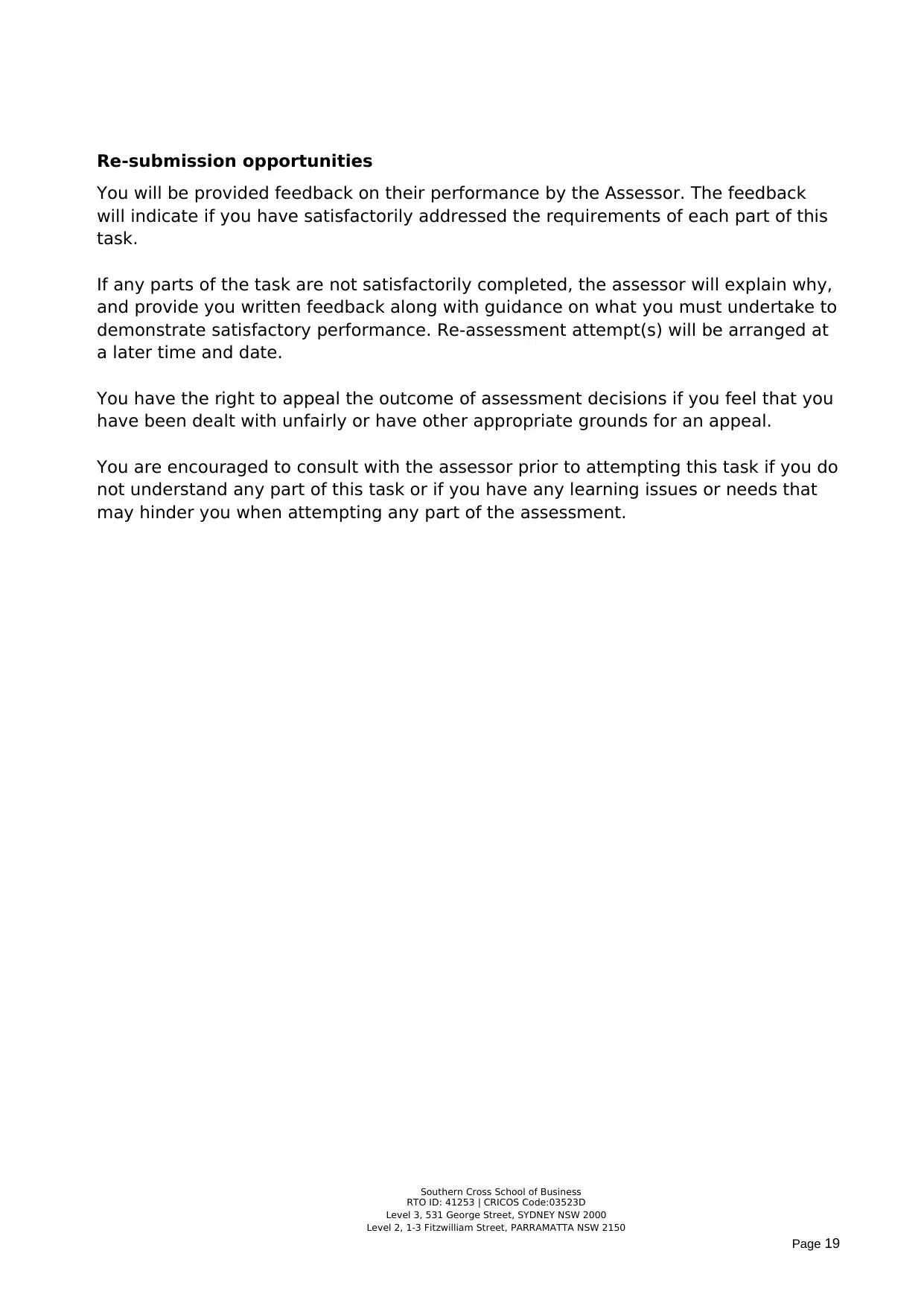
Re-submission opportunities
You will be provided feedback on their performance by the Assessor. The feedback
will indicate if you have satisfactorily addressed the requirements of each part of this
task.
If any parts of the task are not satisfactorily completed, the assessor will explain why,
and provide you written feedback along with guidance on what you must undertake to
demonstrate satisfactory performance. Re-assessment attempt(s) will be arranged at
a later time and date.
You have the right to appeal the outcome of assessment decisions if you feel that you
have been dealt with unfairly or have other appropriate grounds for an appeal.
You are encouraged to consult with the assessor prior to attempting this task if you do
not understand any part of this task or if you have any learning issues or needs that
may hinder you when attempting any part of the assessment.
Southern Cross School of Business
RTO ID: 41253 | CRICOS Code:03523D
Level 3, 531 George Street, SYDNEY NSW 2000
Level 2, 1-3 Fitzwilliam Street, PARRAMATTA NSW 2150
Page 19
You will be provided feedback on their performance by the Assessor. The feedback
will indicate if you have satisfactorily addressed the requirements of each part of this
task.
If any parts of the task are not satisfactorily completed, the assessor will explain why,
and provide you written feedback along with guidance on what you must undertake to
demonstrate satisfactory performance. Re-assessment attempt(s) will be arranged at
a later time and date.
You have the right to appeal the outcome of assessment decisions if you feel that you
have been dealt with unfairly or have other appropriate grounds for an appeal.
You are encouraged to consult with the assessor prior to attempting this task if you do
not understand any part of this task or if you have any learning issues or needs that
may hinder you when attempting any part of the assessment.
Southern Cross School of Business
RTO ID: 41253 | CRICOS Code:03523D
Level 3, 531 George Street, SYDNEY NSW 2000
Level 2, 1-3 Fitzwilliam Street, PARRAMATTA NSW 2150
Page 19
Paraphrase This Document
Need a fresh take? Get an instant paraphrase of this document with our AI Paraphraser
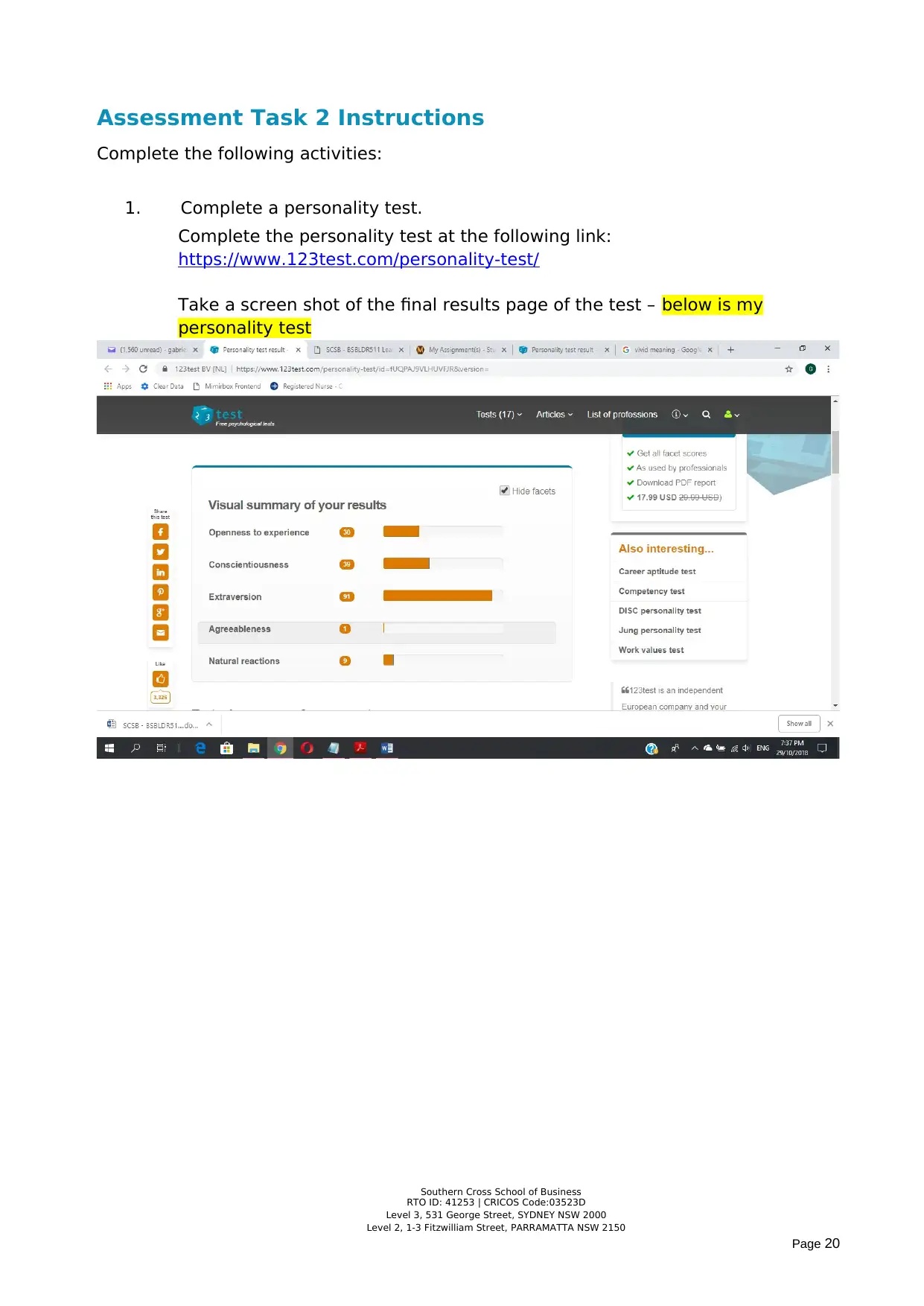
Assessment Task 2 Instructions
Complete the following activities:
1. Complete a personality test.
Complete the personality test at the following link:
https://www.123test.com/personality-test/
Take a screen shot of the final results page of the test – below is my
personality test
Southern Cross School of Business
RTO ID: 41253 | CRICOS Code:03523D
Level 3, 531 George Street, SYDNEY NSW 2000
Level 2, 1-3 Fitzwilliam Street, PARRAMATTA NSW 2150
Page 20
Complete the following activities:
1. Complete a personality test.
Complete the personality test at the following link:
https://www.123test.com/personality-test/
Take a screen shot of the final results page of the test – below is my
personality test
Southern Cross School of Business
RTO ID: 41253 | CRICOS Code:03523D
Level 3, 531 George Street, SYDNEY NSW 2000
Level 2, 1-3 Fitzwilliam Street, PARRAMATTA NSW 2150
Page 20
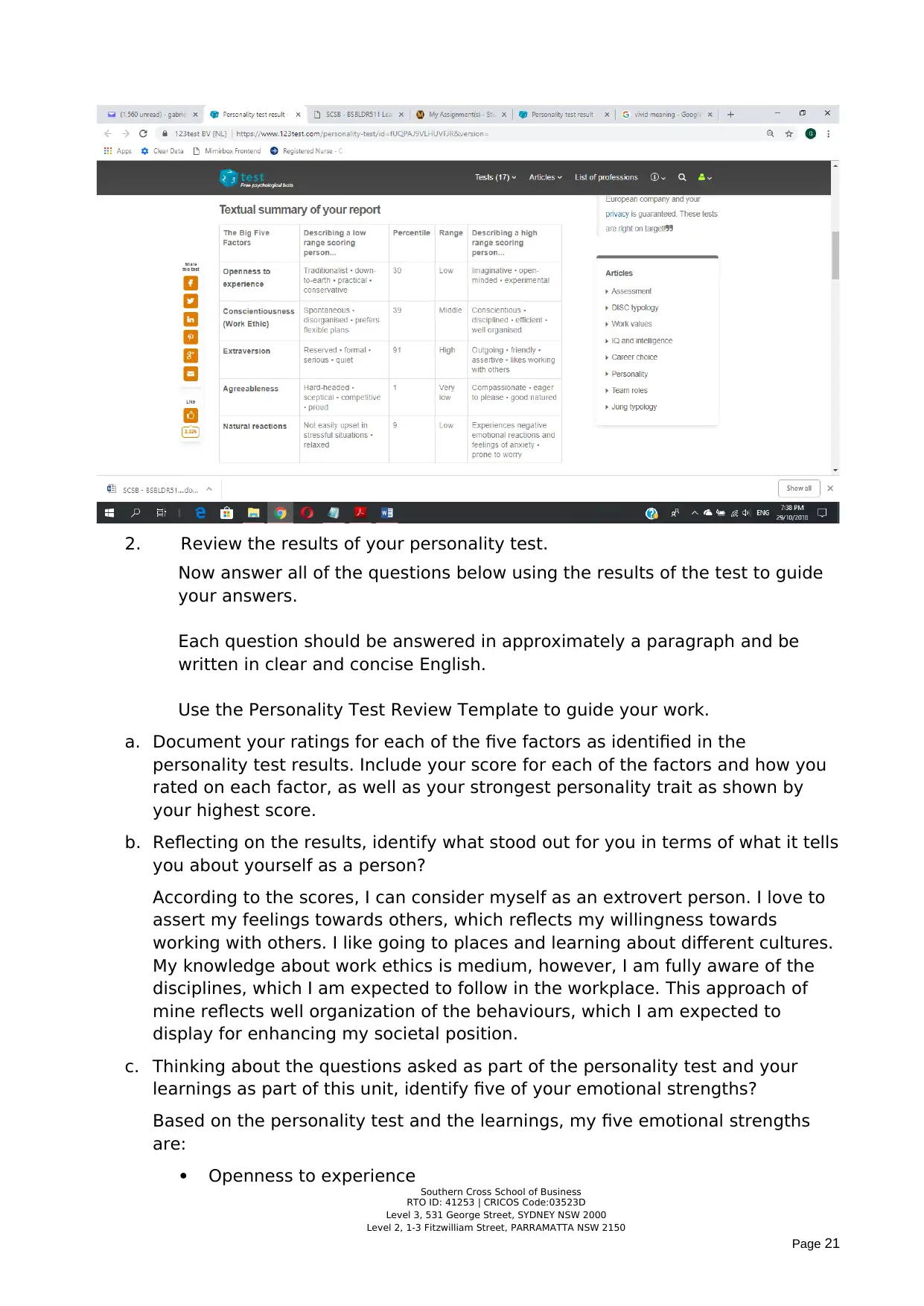
2. Review the results of your personality test.
Now answer all of the questions below using the results of the test to guide
your answers.
Each question should be answered in approximately a paragraph and be
written in clear and concise English.
Use the Personality Test Review Template to guide your work.
a. Document your ratings for each of the five factors as identified in the
personality test results. Include your score for each of the factors and how you
rated on each factor, as well as your strongest personality trait as shown by
your highest score.
b. Reflecting on the results, identify what stood out for you in terms of what it tells
you about yourself as a person?
According to the scores, I can consider myself as an extrovert person. I love to
assert my feelings towards others, which reflects my willingness towards
working with others. I like going to places and learning about different cultures.
My knowledge about work ethics is medium, however, I am fully aware of the
disciplines, which I am expected to follow in the workplace. This approach of
mine reflects well organization of the behaviours, which I am expected to
display for enhancing my societal position.
c. Thinking about the questions asked as part of the personality test and your
learnings as part of this unit, identify five of your emotional strengths?
Based on the personality test and the learnings, my five emotional strengths
are:
Openness to experience Southern Cross School of Business
RTO ID: 41253 | CRICOS Code:03523D
Level 3, 531 George Street, SYDNEY NSW 2000
Level 2, 1-3 Fitzwilliam Street, PARRAMATTA NSW 2150
Page 21
Now answer all of the questions below using the results of the test to guide
your answers.
Each question should be answered in approximately a paragraph and be
written in clear and concise English.
Use the Personality Test Review Template to guide your work.
a. Document your ratings for each of the five factors as identified in the
personality test results. Include your score for each of the factors and how you
rated on each factor, as well as your strongest personality trait as shown by
your highest score.
b. Reflecting on the results, identify what stood out for you in terms of what it tells
you about yourself as a person?
According to the scores, I can consider myself as an extrovert person. I love to
assert my feelings towards others, which reflects my willingness towards
working with others. I like going to places and learning about different cultures.
My knowledge about work ethics is medium, however, I am fully aware of the
disciplines, which I am expected to follow in the workplace. This approach of
mine reflects well organization of the behaviours, which I am expected to
display for enhancing my societal position.
c. Thinking about the questions asked as part of the personality test and your
learnings as part of this unit, identify five of your emotional strengths?
Based on the personality test and the learnings, my five emotional strengths
are:
Openness to experience Southern Cross School of Business
RTO ID: 41253 | CRICOS Code:03523D
Level 3, 531 George Street, SYDNEY NSW 2000
Level 2, 1-3 Fitzwilliam Street, PARRAMATTA NSW 2150
Page 21
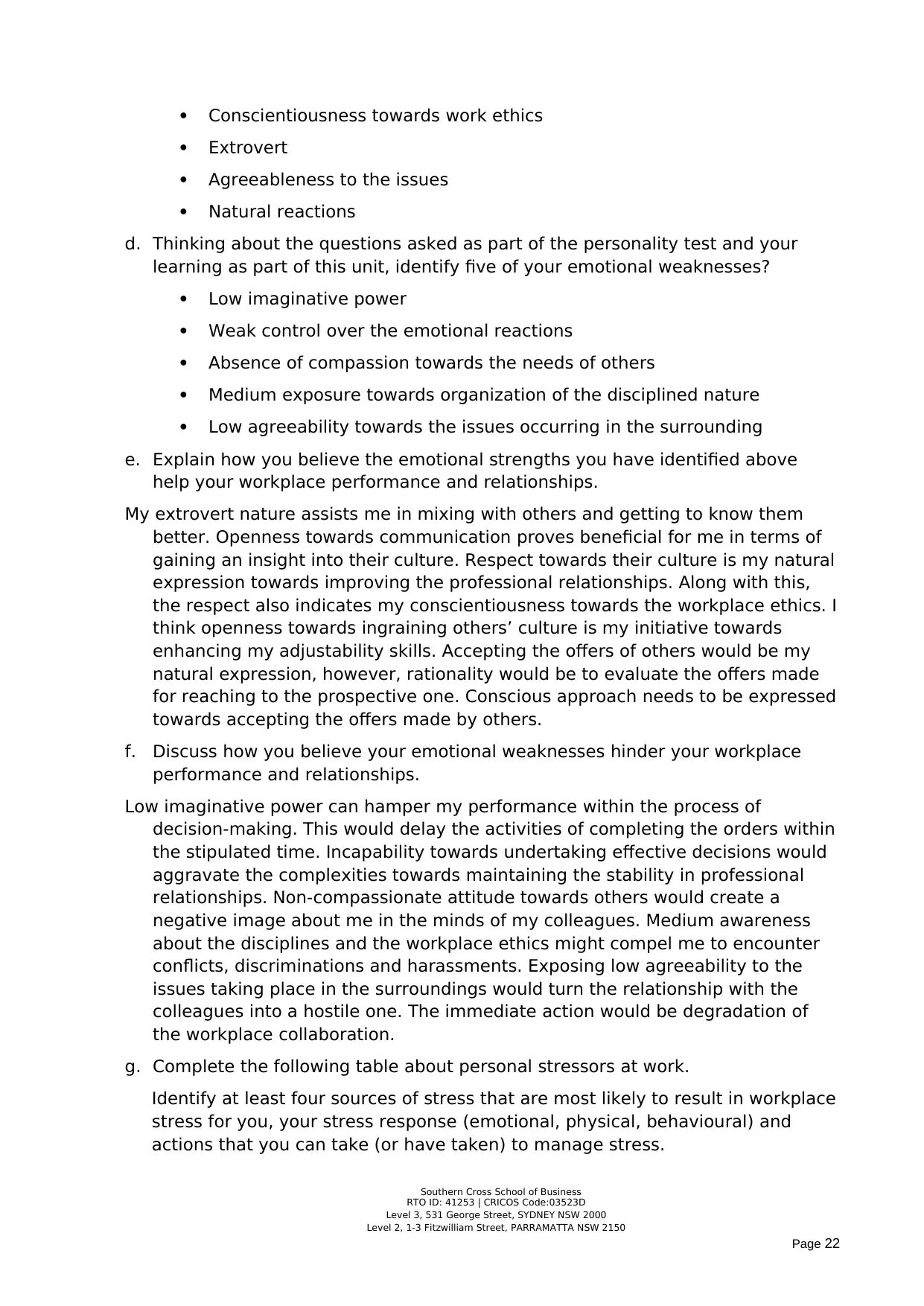
Conscientiousness towards work ethics
Extrovert
Agreeableness to the issues
Natural reactions
d. Thinking about the questions asked as part of the personality test and your
learning as part of this unit, identify five of your emotional weaknesses?
Low imaginative power
Weak control over the emotional reactions
Absence of compassion towards the needs of others
Medium exposure towards organization of the disciplined nature
Low agreeability towards the issues occurring in the surrounding
e. Explain how you believe the emotional strengths you have identified above
help your workplace performance and relationships.
My extrovert nature assists me in mixing with others and getting to know them
better. Openness towards communication proves beneficial for me in terms of
gaining an insight into their culture. Respect towards their culture is my natural
expression towards improving the professional relationships. Along with this,
the respect also indicates my conscientiousness towards the workplace ethics. I
think openness towards ingraining others’ culture is my initiative towards
enhancing my adjustability skills. Accepting the offers of others would be my
natural expression, however, rationality would be to evaluate the offers made
for reaching to the prospective one. Conscious approach needs to be expressed
towards accepting the offers made by others.
f. Discuss how you believe your emotional weaknesses hinder your workplace
performance and relationships.
Low imaginative power can hamper my performance within the process of
decision-making. This would delay the activities of completing the orders within
the stipulated time. Incapability towards undertaking effective decisions would
aggravate the complexities towards maintaining the stability in professional
relationships. Non-compassionate attitude towards others would create a
negative image about me in the minds of my colleagues. Medium awareness
about the disciplines and the workplace ethics might compel me to encounter
conflicts, discriminations and harassments. Exposing low agreeability to the
issues taking place in the surroundings would turn the relationship with the
colleagues into a hostile one. The immediate action would be degradation of
the workplace collaboration.
g. Complete the following table about personal stressors at work.
Identify at least four sources of stress that are most likely to result in workplace
stress for you, your stress response (emotional, physical, behavioural) and
actions that you can take (or have taken) to manage stress.
Southern Cross School of Business
RTO ID: 41253 | CRICOS Code:03523D
Level 3, 531 George Street, SYDNEY NSW 2000
Level 2, 1-3 Fitzwilliam Street, PARRAMATTA NSW 2150
Page 22
Extrovert
Agreeableness to the issues
Natural reactions
d. Thinking about the questions asked as part of the personality test and your
learning as part of this unit, identify five of your emotional weaknesses?
Low imaginative power
Weak control over the emotional reactions
Absence of compassion towards the needs of others
Medium exposure towards organization of the disciplined nature
Low agreeability towards the issues occurring in the surrounding
e. Explain how you believe the emotional strengths you have identified above
help your workplace performance and relationships.
My extrovert nature assists me in mixing with others and getting to know them
better. Openness towards communication proves beneficial for me in terms of
gaining an insight into their culture. Respect towards their culture is my natural
expression towards improving the professional relationships. Along with this,
the respect also indicates my conscientiousness towards the workplace ethics. I
think openness towards ingraining others’ culture is my initiative towards
enhancing my adjustability skills. Accepting the offers of others would be my
natural expression, however, rationality would be to evaluate the offers made
for reaching to the prospective one. Conscious approach needs to be expressed
towards accepting the offers made by others.
f. Discuss how you believe your emotional weaknesses hinder your workplace
performance and relationships.
Low imaginative power can hamper my performance within the process of
decision-making. This would delay the activities of completing the orders within
the stipulated time. Incapability towards undertaking effective decisions would
aggravate the complexities towards maintaining the stability in professional
relationships. Non-compassionate attitude towards others would create a
negative image about me in the minds of my colleagues. Medium awareness
about the disciplines and the workplace ethics might compel me to encounter
conflicts, discriminations and harassments. Exposing low agreeability to the
issues taking place in the surroundings would turn the relationship with the
colleagues into a hostile one. The immediate action would be degradation of
the workplace collaboration.
g. Complete the following table about personal stressors at work.
Identify at least four sources of stress that are most likely to result in workplace
stress for you, your stress response (emotional, physical, behavioural) and
actions that you can take (or have taken) to manage stress.
Southern Cross School of Business
RTO ID: 41253 | CRICOS Code:03523D
Level 3, 531 George Street, SYDNEY NSW 2000
Level 2, 1-3 Fitzwilliam Street, PARRAMATTA NSW 2150
Page 22
Secure Best Marks with AI Grader
Need help grading? Try our AI Grader for instant feedback on your assignments.
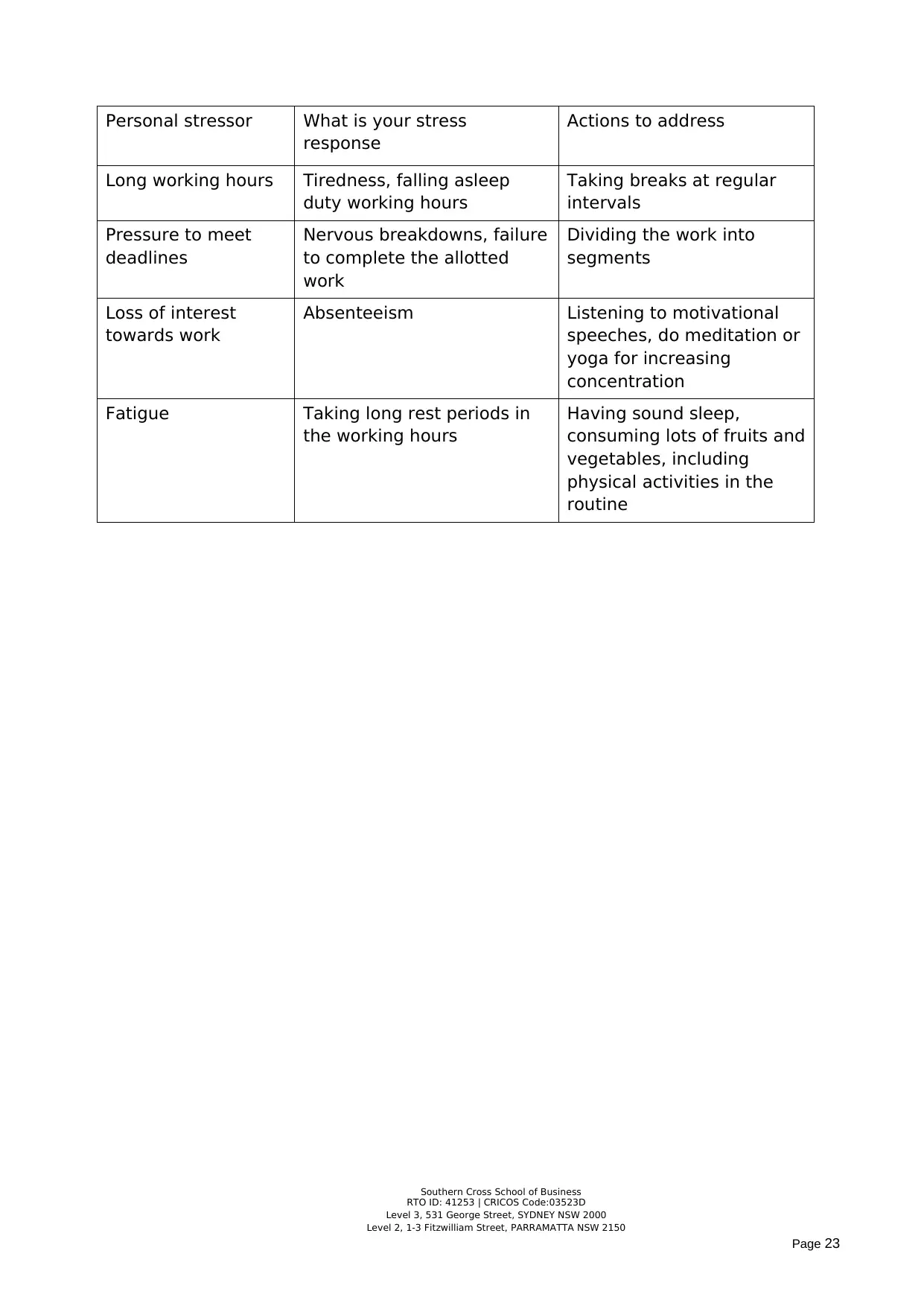
Personal stressor What is your stress
response
Actions to address
Long working hours Tiredness, falling asleep
duty working hours
Taking breaks at regular
intervals
Pressure to meet
deadlines
Nervous breakdowns, failure
to complete the allotted
work
Dividing the work into
segments
Loss of interest
towards work
Absenteeism Listening to motivational
speeches, do meditation or
yoga for increasing
concentration
Fatigue Taking long rest periods in
the working hours
Having sound sleep,
consuming lots of fruits and
vegetables, including
physical activities in the
routine
Southern Cross School of Business
RTO ID: 41253 | CRICOS Code:03523D
Level 3, 531 George Street, SYDNEY NSW 2000
Level 2, 1-3 Fitzwilliam Street, PARRAMATTA NSW 2150
Page 23
response
Actions to address
Long working hours Tiredness, falling asleep
duty working hours
Taking breaks at regular
intervals
Pressure to meet
deadlines
Nervous breakdowns, failure
to complete the allotted
work
Dividing the work into
segments
Loss of interest
towards work
Absenteeism Listening to motivational
speeches, do meditation or
yoga for increasing
concentration
Fatigue Taking long rest periods in
the working hours
Having sound sleep,
consuming lots of fruits and
vegetables, including
physical activities in the
routine
Southern Cross School of Business
RTO ID: 41253 | CRICOS Code:03523D
Level 3, 531 George Street, SYDNEY NSW 2000
Level 2, 1-3 Fitzwilliam Street, PARRAMATTA NSW 2150
Page 23
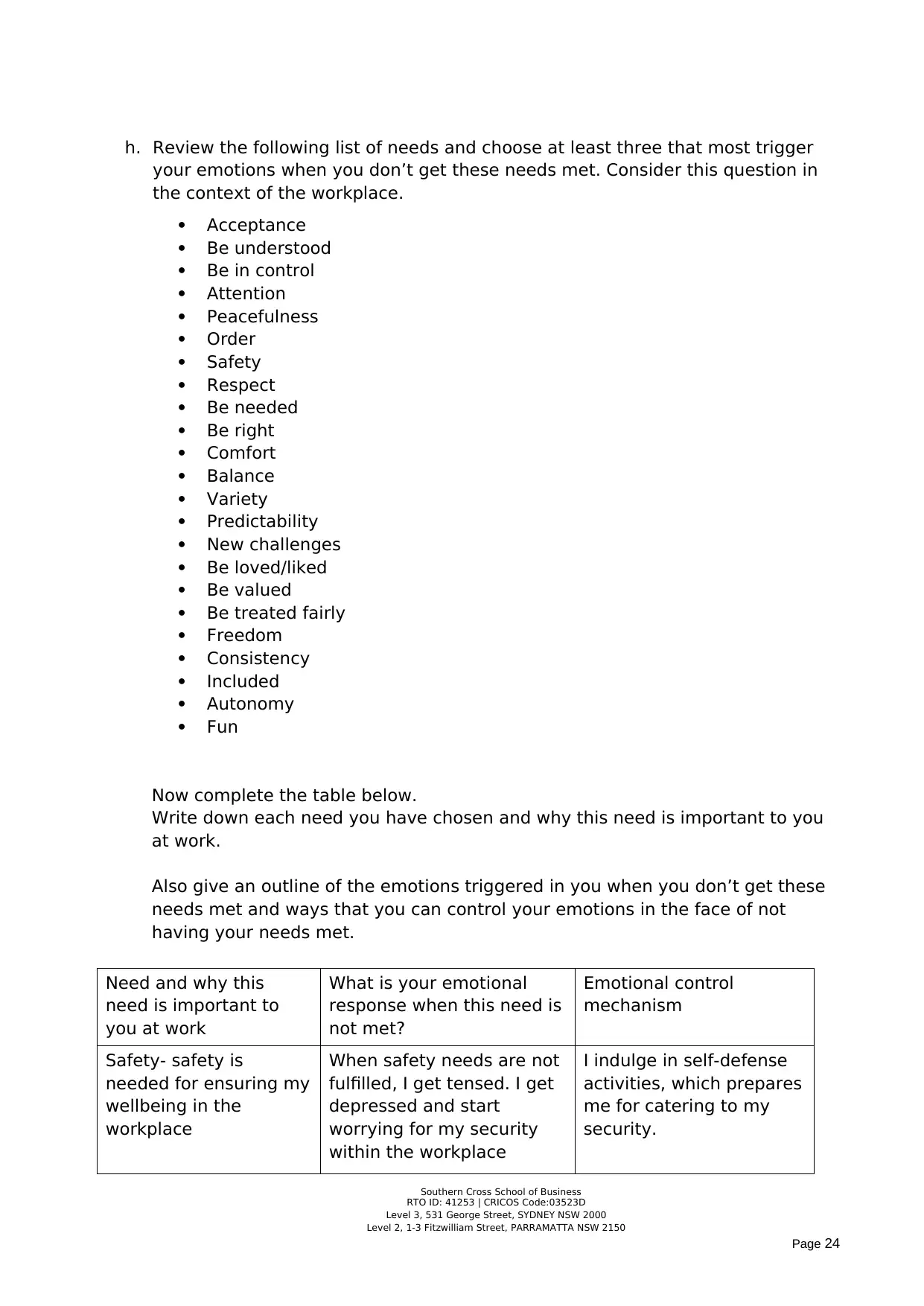
h. Review the following list of needs and choose at least three that most trigger
your emotions when you don’t get these needs met. Consider this question in
the context of the workplace.
Acceptance
Be understood
Be in control
Attention
Peacefulness
Order
Safety
Respect
Be needed
Be right
Comfort
Balance
Variety
Predictability
New challenges
Be loved/liked
Be valued
Be treated fairly
Freedom
Consistency
Included
Autonomy
Fun
Now complete the table below.
Write down each need you have chosen and why this need is important to you
at work.
Also give an outline of the emotions triggered in you when you don’t get these
needs met and ways that you can control your emotions in the face of not
having your needs met.
Need and why this
need is important to
you at work
What is your emotional
response when this need is
not met?
Emotional control
mechanism
Safety- safety is
needed for ensuring my
wellbeing in the
workplace
When safety needs are not
fulfilled, I get tensed. I get
depressed and start
worrying for my security
within the workplace
I indulge in self-defense
activities, which prepares
me for catering to my
security.
Southern Cross School of Business
RTO ID: 41253 | CRICOS Code:03523D
Level 3, 531 George Street, SYDNEY NSW 2000
Level 2, 1-3 Fitzwilliam Street, PARRAMATTA NSW 2150
Page 24
your emotions when you don’t get these needs met. Consider this question in
the context of the workplace.
Acceptance
Be understood
Be in control
Attention
Peacefulness
Order
Safety
Respect
Be needed
Be right
Comfort
Balance
Variety
Predictability
New challenges
Be loved/liked
Be valued
Be treated fairly
Freedom
Consistency
Included
Autonomy
Fun
Now complete the table below.
Write down each need you have chosen and why this need is important to you
at work.
Also give an outline of the emotions triggered in you when you don’t get these
needs met and ways that you can control your emotions in the face of not
having your needs met.
Need and why this
need is important to
you at work
What is your emotional
response when this need is
not met?
Emotional control
mechanism
Safety- safety is
needed for ensuring my
wellbeing in the
workplace
When safety needs are not
fulfilled, I get tensed. I get
depressed and start
worrying for my security
within the workplace
I indulge in self-defense
activities, which prepares
me for catering to my
security.
Southern Cross School of Business
RTO ID: 41253 | CRICOS Code:03523D
Level 3, 531 George Street, SYDNEY NSW 2000
Level 2, 1-3 Fitzwilliam Street, PARRAMATTA NSW 2150
Page 24
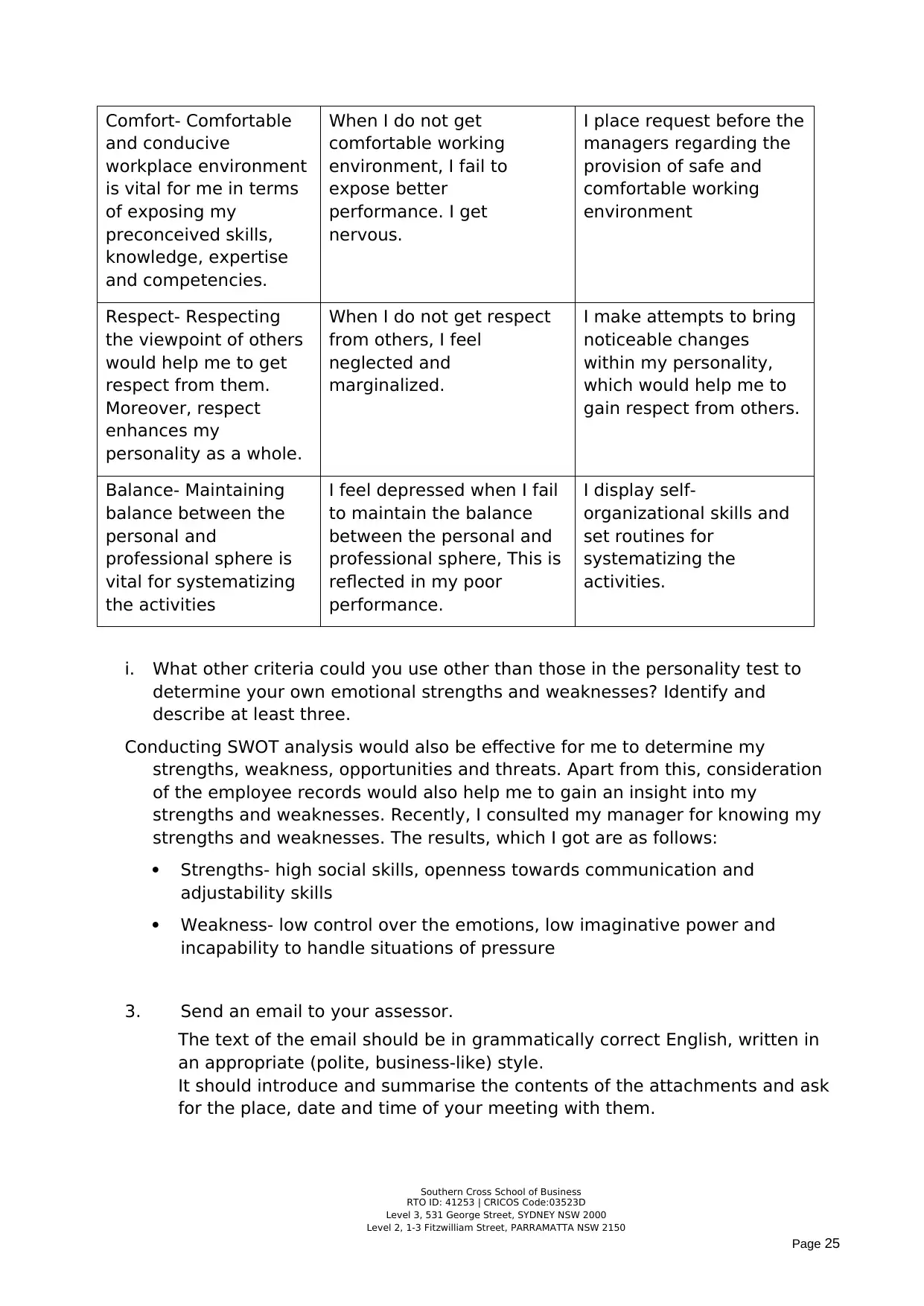
Comfort- Comfortable
and conducive
workplace environment
is vital for me in terms
of exposing my
preconceived skills,
knowledge, expertise
and competencies.
When I do not get
comfortable working
environment, I fail to
expose better
performance. I get
nervous.
I place request before the
managers regarding the
provision of safe and
comfortable working
environment
Respect- Respecting
the viewpoint of others
would help me to get
respect from them.
Moreover, respect
enhances my
personality as a whole.
When I do not get respect
from others, I feel
neglected and
marginalized.
I make attempts to bring
noticeable changes
within my personality,
which would help me to
gain respect from others.
Balance- Maintaining
balance between the
personal and
professional sphere is
vital for systematizing
the activities
I feel depressed when I fail
to maintain the balance
between the personal and
professional sphere, This is
reflected in my poor
performance.
I display self-
organizational skills and
set routines for
systematizing the
activities.
i. What other criteria could you use other than those in the personality test to
determine your own emotional strengths and weaknesses? Identify and
describe at least three.
Conducting SWOT analysis would also be effective for me to determine my
strengths, weakness, opportunities and threats. Apart from this, consideration
of the employee records would also help me to gain an insight into my
strengths and weaknesses. Recently, I consulted my manager for knowing my
strengths and weaknesses. The results, which I got are as follows:
Strengths- high social skills, openness towards communication and
adjustability skills
Weakness- low control over the emotions, low imaginative power and
incapability to handle situations of pressure
3. Send an email to your assessor.
The text of the email should be in grammatically correct English, written in
an appropriate (polite, business-like) style.
It should introduce and summarise the contents of the attachments and ask
for the place, date and time of your meeting with them.
Southern Cross School of Business
RTO ID: 41253 | CRICOS Code:03523D
Level 3, 531 George Street, SYDNEY NSW 2000
Level 2, 1-3 Fitzwilliam Street, PARRAMATTA NSW 2150
Page 25
and conducive
workplace environment
is vital for me in terms
of exposing my
preconceived skills,
knowledge, expertise
and competencies.
When I do not get
comfortable working
environment, I fail to
expose better
performance. I get
nervous.
I place request before the
managers regarding the
provision of safe and
comfortable working
environment
Respect- Respecting
the viewpoint of others
would help me to get
respect from them.
Moreover, respect
enhances my
personality as a whole.
When I do not get respect
from others, I feel
neglected and
marginalized.
I make attempts to bring
noticeable changes
within my personality,
which would help me to
gain respect from others.
Balance- Maintaining
balance between the
personal and
professional sphere is
vital for systematizing
the activities
I feel depressed when I fail
to maintain the balance
between the personal and
professional sphere, This is
reflected in my poor
performance.
I display self-
organizational skills and
set routines for
systematizing the
activities.
i. What other criteria could you use other than those in the personality test to
determine your own emotional strengths and weaknesses? Identify and
describe at least three.
Conducting SWOT analysis would also be effective for me to determine my
strengths, weakness, opportunities and threats. Apart from this, consideration
of the employee records would also help me to gain an insight into my
strengths and weaknesses. Recently, I consulted my manager for knowing my
strengths and weaknesses. The results, which I got are as follows:
Strengths- high social skills, openness towards communication and
adjustability skills
Weakness- low control over the emotions, low imaginative power and
incapability to handle situations of pressure
3. Send an email to your assessor.
The text of the email should be in grammatically correct English, written in
an appropriate (polite, business-like) style.
It should introduce and summarise the contents of the attachments and ask
for the place, date and time of your meeting with them.
Southern Cross School of Business
RTO ID: 41253 | CRICOS Code:03523D
Level 3, 531 George Street, SYDNEY NSW 2000
Level 2, 1-3 Fitzwilliam Street, PARRAMATTA NSW 2150
Page 25
Paraphrase This Document
Need a fresh take? Get an instant paraphrase of this document with our AI Paraphraser
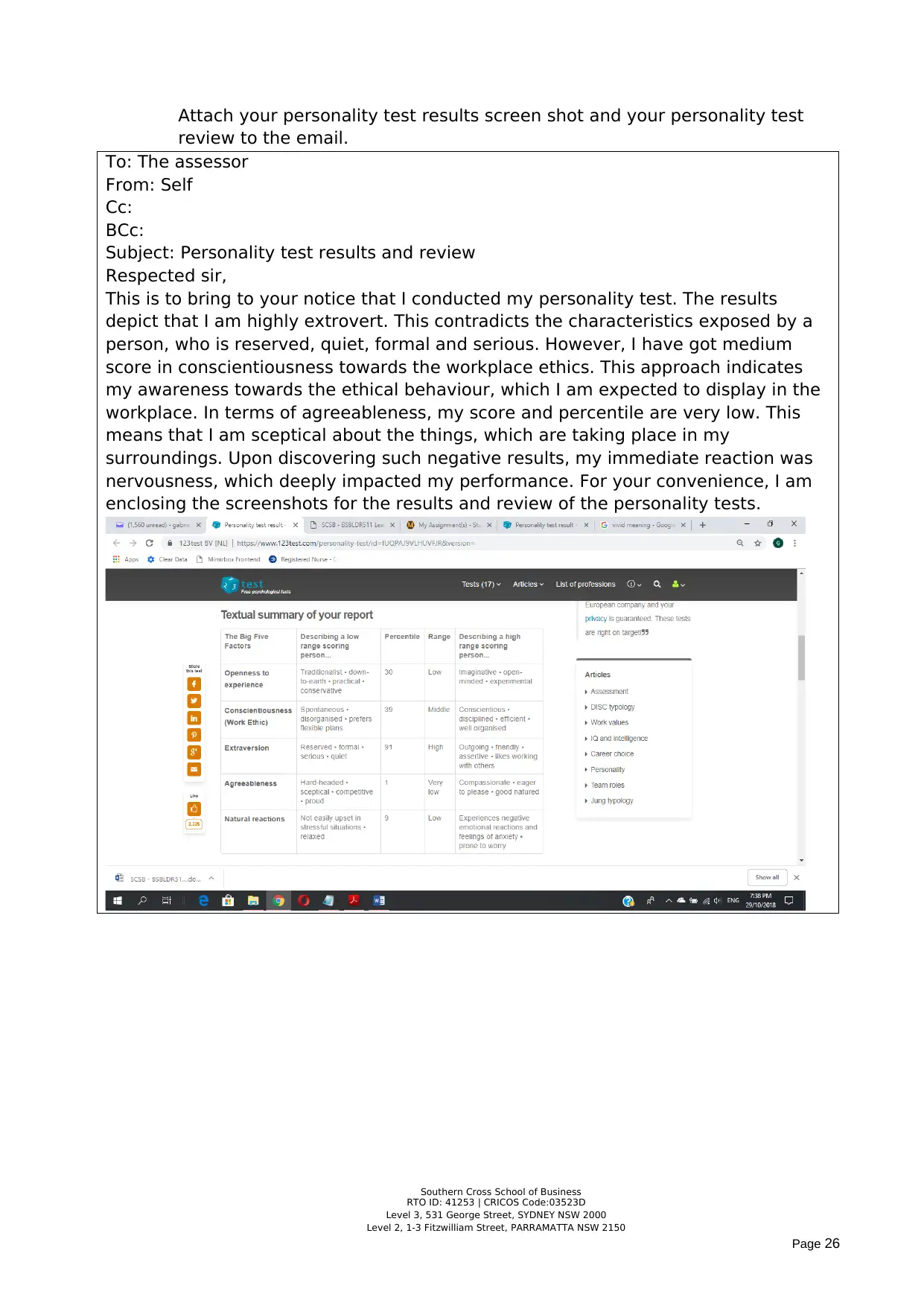
Attach your personality test results screen shot and your personality test
review to the email.
To: The assessor
From: Self
Cc:
BCc:
Subject: Personality test results and review
Respected sir,
This is to bring to your notice that I conducted my personality test. The results
depict that I am highly extrovert. This contradicts the characteristics exposed by a
person, who is reserved, quiet, formal and serious. However, I have got medium
score in conscientiousness towards the workplace ethics. This approach indicates
my awareness towards the ethical behaviour, which I am expected to display in the
workplace. In terms of agreeableness, my score and percentile are very low. This
means that I am sceptical about the things, which are taking place in my
surroundings. Upon discovering such negative results, my immediate reaction was
nervousness, which deeply impacted my performance. For your convenience, I am
enclosing the screenshots for the results and review of the personality tests.
Southern Cross School of Business
RTO ID: 41253 | CRICOS Code:03523D
Level 3, 531 George Street, SYDNEY NSW 2000
Level 2, 1-3 Fitzwilliam Street, PARRAMATTA NSW 2150
Page 26
review to the email.
To: The assessor
From: Self
Cc:
BCc:
Subject: Personality test results and review
Respected sir,
This is to bring to your notice that I conducted my personality test. The results
depict that I am highly extrovert. This contradicts the characteristics exposed by a
person, who is reserved, quiet, formal and serious. However, I have got medium
score in conscientiousness towards the workplace ethics. This approach indicates
my awareness towards the ethical behaviour, which I am expected to display in the
workplace. In terms of agreeableness, my score and percentile are very low. This
means that I am sceptical about the things, which are taking place in my
surroundings. Upon discovering such negative results, my immediate reaction was
nervousness, which deeply impacted my performance. For your convenience, I am
enclosing the screenshots for the results and review of the personality tests.
Southern Cross School of Business
RTO ID: 41253 | CRICOS Code:03523D
Level 3, 531 George Street, SYDNEY NSW 2000
Level 2, 1-3 Fitzwilliam Street, PARRAMATTA NSW 2150
Page 26
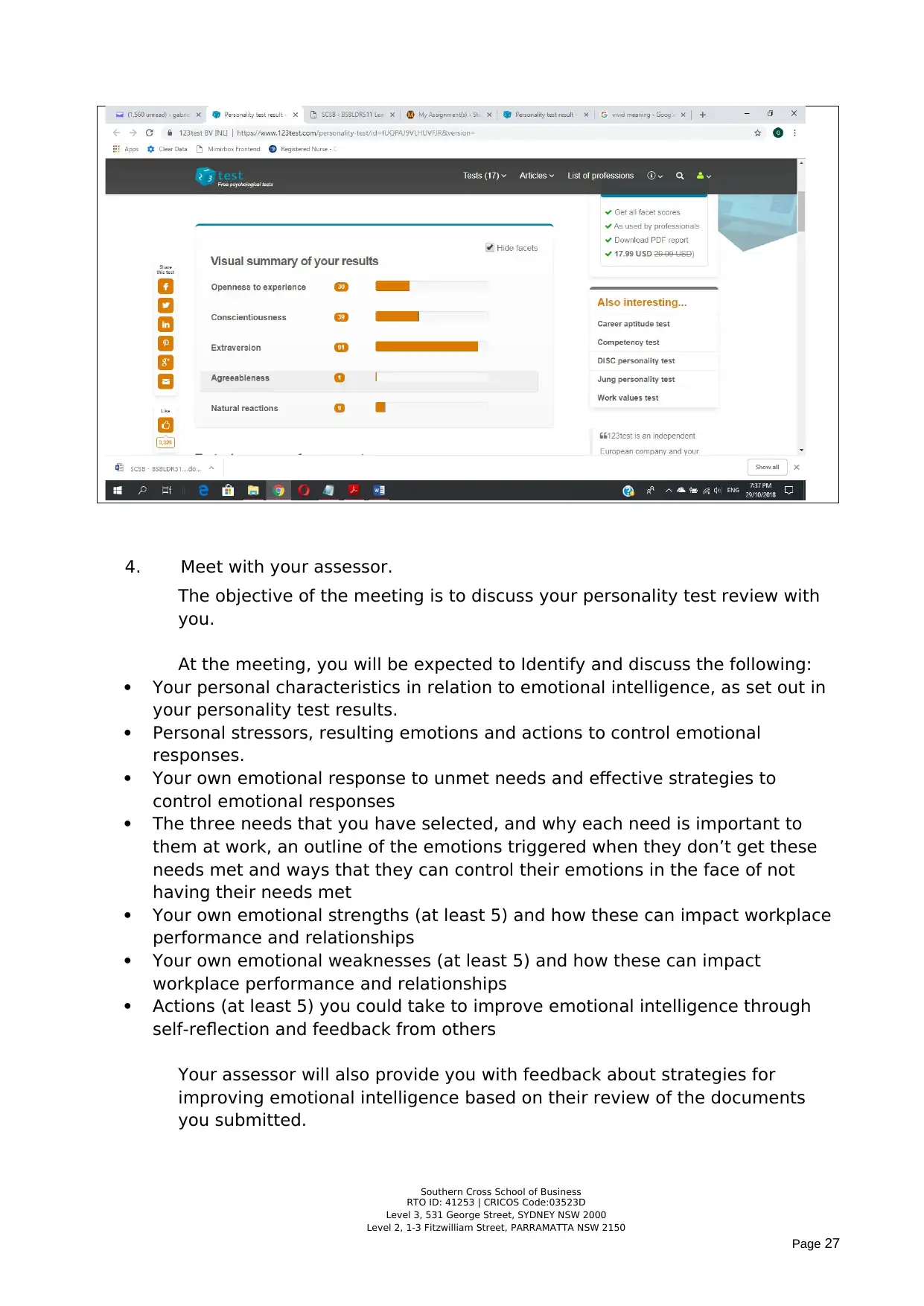
4. Meet with your assessor.
The objective of the meeting is to discuss your personality test review with
you.
At the meeting, you will be expected to Identify and discuss the following:
Your personal characteristics in relation to emotional intelligence, as set out in
your personality test results.
Personal stressors, resulting emotions and actions to control emotional
responses.
Your own emotional response to unmet needs and effective strategies to
control emotional responses
The three needs that you have selected, and why each need is important to
them at work, an outline of the emotions triggered when they don’t get these
needs met and ways that they can control their emotions in the face of not
having their needs met
Your own emotional strengths (at least 5) and how these can impact workplace
performance and relationships
Your own emotional weaknesses (at least 5) and how these can impact
workplace performance and relationships
Actions (at least 5) you could take to improve emotional intelligence through
self-reflection and feedback from others
Your assessor will also provide you with feedback about strategies for
improving emotional intelligence based on their review of the documents
you submitted.
Southern Cross School of Business
RTO ID: 41253 | CRICOS Code:03523D
Level 3, 531 George Street, SYDNEY NSW 2000
Level 2, 1-3 Fitzwilliam Street, PARRAMATTA NSW 2150
Page 27
The objective of the meeting is to discuss your personality test review with
you.
At the meeting, you will be expected to Identify and discuss the following:
Your personal characteristics in relation to emotional intelligence, as set out in
your personality test results.
Personal stressors, resulting emotions and actions to control emotional
responses.
Your own emotional response to unmet needs and effective strategies to
control emotional responses
The three needs that you have selected, and why each need is important to
them at work, an outline of the emotions triggered when they don’t get these
needs met and ways that they can control their emotions in the face of not
having their needs met
Your own emotional strengths (at least 5) and how these can impact workplace
performance and relationships
Your own emotional weaknesses (at least 5) and how these can impact
workplace performance and relationships
Actions (at least 5) you could take to improve emotional intelligence through
self-reflection and feedback from others
Your assessor will also provide you with feedback about strategies for
improving emotional intelligence based on their review of the documents
you submitted.
Southern Cross School of Business
RTO ID: 41253 | CRICOS Code:03523D
Level 3, 531 George Street, SYDNEY NSW 2000
Level 2, 1-3 Fitzwilliam Street, PARRAMATTA NSW 2150
Page 27
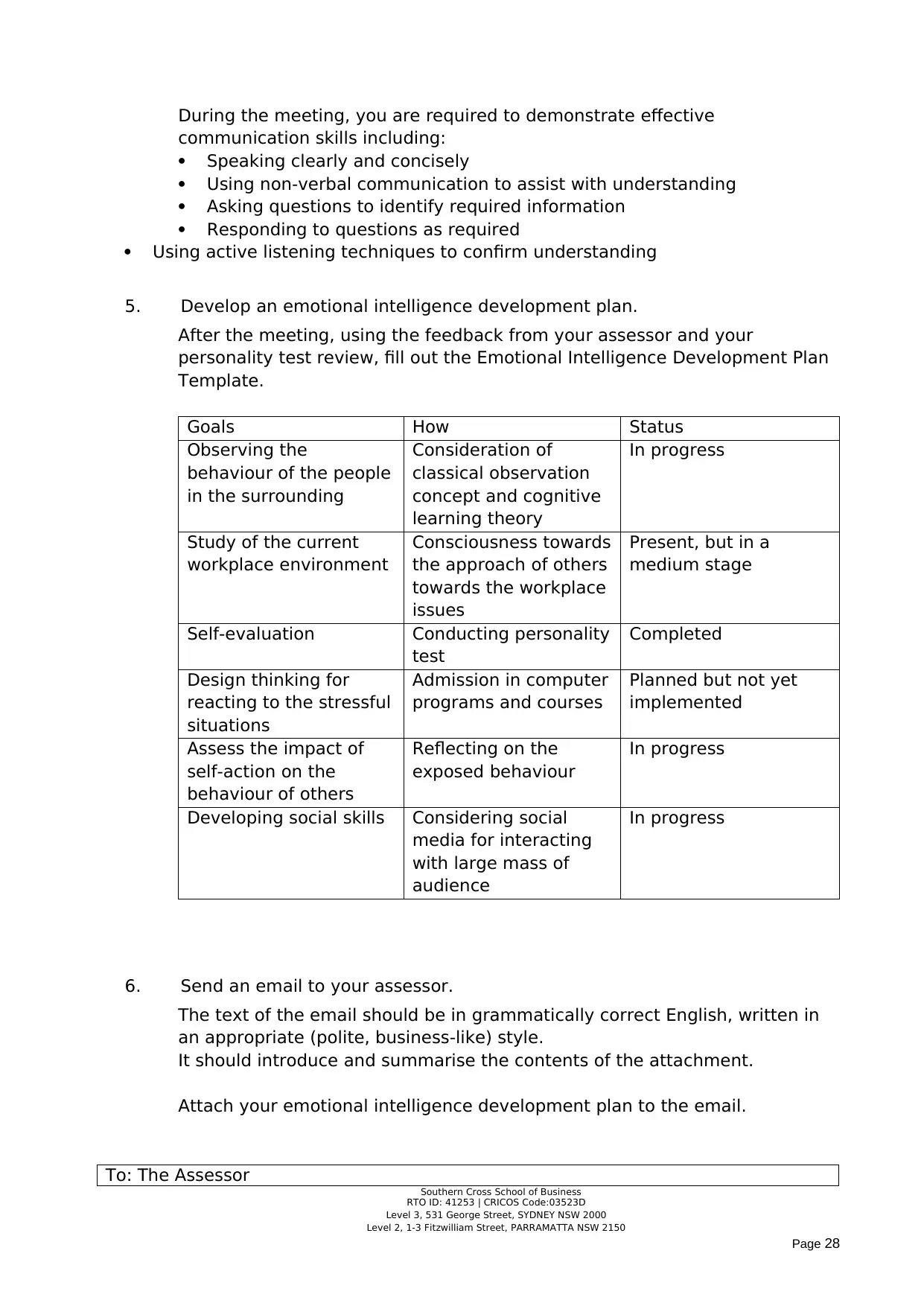
During the meeting, you are required to demonstrate effective
communication skills including:
Speaking clearly and concisely
Using non-verbal communication to assist with understanding
Asking questions to identify required information
Responding to questions as required
Using active listening techniques to confirm understanding
5. Develop an emotional intelligence development plan.
After the meeting, using the feedback from your assessor and your
personality test review, fill out the Emotional Intelligence Development Plan
Template.
Goals How Status
Observing the
behaviour of the people
in the surrounding
Consideration of
classical observation
concept and cognitive
learning theory
In progress
Study of the current
workplace environment
Consciousness towards
the approach of others
towards the workplace
issues
Present, but in a
medium stage
Self-evaluation Conducting personality
test
Completed
Design thinking for
reacting to the stressful
situations
Admission in computer
programs and courses
Planned but not yet
implemented
Assess the impact of
self-action on the
behaviour of others
Reflecting on the
exposed behaviour
In progress
Developing social skills Considering social
media for interacting
with large mass of
audience
In progress
6. Send an email to your assessor.
The text of the email should be in grammatically correct English, written in
an appropriate (polite, business-like) style.
It should introduce and summarise the contents of the attachment.
Attach your emotional intelligence development plan to the email.
To: The Assessor Southern Cross School of Business
RTO ID: 41253 | CRICOS Code:03523D
Level 3, 531 George Street, SYDNEY NSW 2000
Level 2, 1-3 Fitzwilliam Street, PARRAMATTA NSW 2150
Page 28
communication skills including:
Speaking clearly and concisely
Using non-verbal communication to assist with understanding
Asking questions to identify required information
Responding to questions as required
Using active listening techniques to confirm understanding
5. Develop an emotional intelligence development plan.
After the meeting, using the feedback from your assessor and your
personality test review, fill out the Emotional Intelligence Development Plan
Template.
Goals How Status
Observing the
behaviour of the people
in the surrounding
Consideration of
classical observation
concept and cognitive
learning theory
In progress
Study of the current
workplace environment
Consciousness towards
the approach of others
towards the workplace
issues
Present, but in a
medium stage
Self-evaluation Conducting personality
test
Completed
Design thinking for
reacting to the stressful
situations
Admission in computer
programs and courses
Planned but not yet
implemented
Assess the impact of
self-action on the
behaviour of others
Reflecting on the
exposed behaviour
In progress
Developing social skills Considering social
media for interacting
with large mass of
audience
In progress
6. Send an email to your assessor.
The text of the email should be in grammatically correct English, written in
an appropriate (polite, business-like) style.
It should introduce and summarise the contents of the attachment.
Attach your emotional intelligence development plan to the email.
To: The Assessor Southern Cross School of Business
RTO ID: 41253 | CRICOS Code:03523D
Level 3, 531 George Street, SYDNEY NSW 2000
Level 2, 1-3 Fitzwilliam Street, PARRAMATTA NSW 2150
Page 28
Secure Best Marks with AI Grader
Need help grading? Try our AI Grader for instant feedback on your assignments.
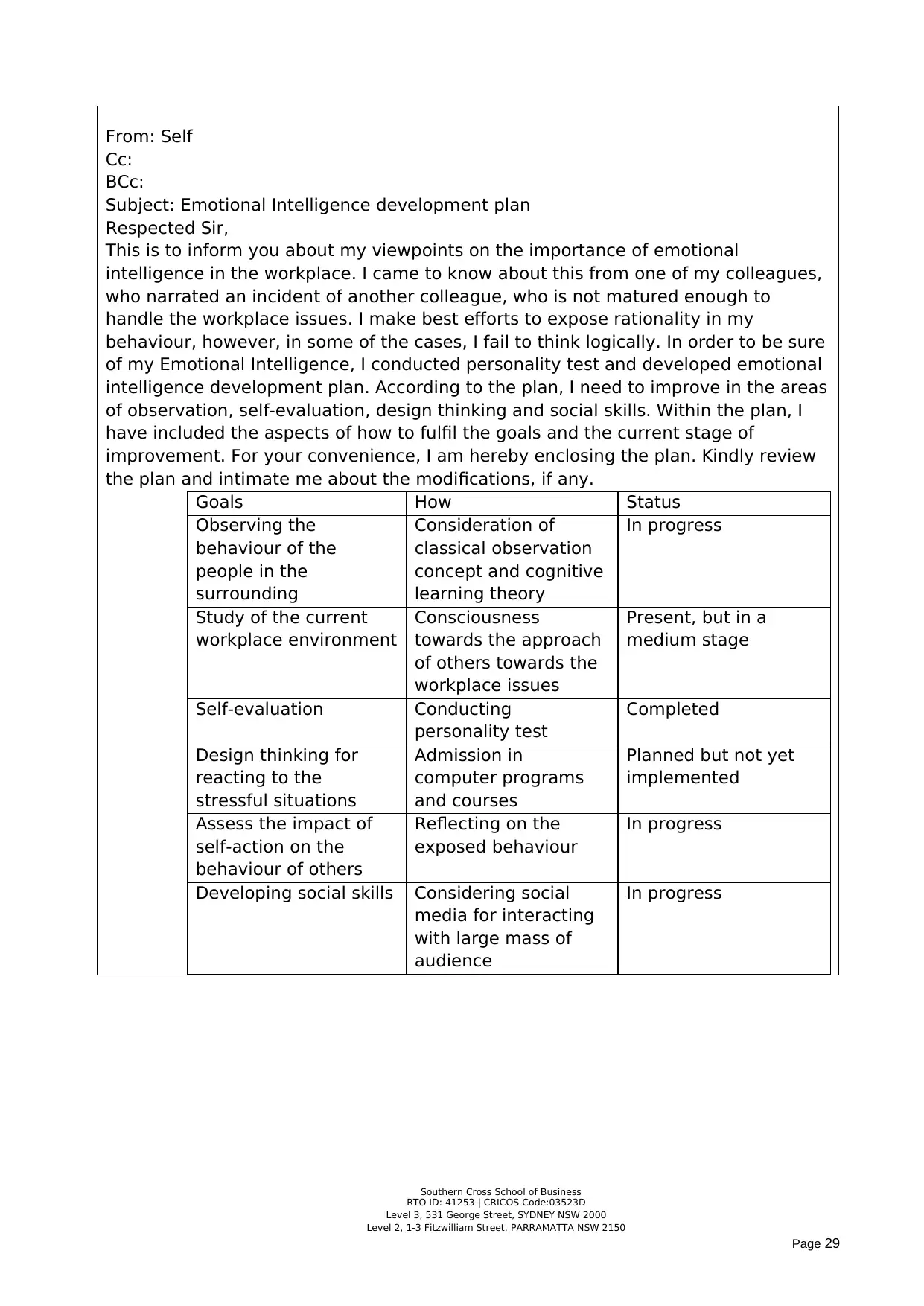
From: Self
Cc:
BCc:
Subject: Emotional Intelligence development plan
Respected Sir,
This is to inform you about my viewpoints on the importance of emotional
intelligence in the workplace. I came to know about this from one of my colleagues,
who narrated an incident of another colleague, who is not matured enough to
handle the workplace issues. I make best efforts to expose rationality in my
behaviour, however, in some of the cases, I fail to think logically. In order to be sure
of my Emotional Intelligence, I conducted personality test and developed emotional
intelligence development plan. According to the plan, I need to improve in the areas
of observation, self-evaluation, design thinking and social skills. Within the plan, I
have included the aspects of how to fulfil the goals and the current stage of
improvement. For your convenience, I am hereby enclosing the plan. Kindly review
the plan and intimate me about the modifications, if any.
Goals How Status
Observing the
behaviour of the
people in the
surrounding
Consideration of
classical observation
concept and cognitive
learning theory
In progress
Study of the current
workplace environment
Consciousness
towards the approach
of others towards the
workplace issues
Present, but in a
medium stage
Self-evaluation Conducting
personality test
Completed
Design thinking for
reacting to the
stressful situations
Admission in
computer programs
and courses
Planned but not yet
implemented
Assess the impact of
self-action on the
behaviour of others
Reflecting on the
exposed behaviour
In progress
Developing social skills Considering social
media for interacting
with large mass of
audience
In progress
Southern Cross School of Business
RTO ID: 41253 | CRICOS Code:03523D
Level 3, 531 George Street, SYDNEY NSW 2000
Level 2, 1-3 Fitzwilliam Street, PARRAMATTA NSW 2150
Page 29
Cc:
BCc:
Subject: Emotional Intelligence development plan
Respected Sir,
This is to inform you about my viewpoints on the importance of emotional
intelligence in the workplace. I came to know about this from one of my colleagues,
who narrated an incident of another colleague, who is not matured enough to
handle the workplace issues. I make best efforts to expose rationality in my
behaviour, however, in some of the cases, I fail to think logically. In order to be sure
of my Emotional Intelligence, I conducted personality test and developed emotional
intelligence development plan. According to the plan, I need to improve in the areas
of observation, self-evaluation, design thinking and social skills. Within the plan, I
have included the aspects of how to fulfil the goals and the current stage of
improvement. For your convenience, I am hereby enclosing the plan. Kindly review
the plan and intimate me about the modifications, if any.
Goals How Status
Observing the
behaviour of the
people in the
surrounding
Consideration of
classical observation
concept and cognitive
learning theory
In progress
Study of the current
workplace environment
Consciousness
towards the approach
of others towards the
workplace issues
Present, but in a
medium stage
Self-evaluation Conducting
personality test
Completed
Design thinking for
reacting to the
stressful situations
Admission in
computer programs
and courses
Planned but not yet
implemented
Assess the impact of
self-action on the
behaviour of others
Reflecting on the
exposed behaviour
In progress
Developing social skills Considering social
media for interacting
with large mass of
audience
In progress
Southern Cross School of Business
RTO ID: 41253 | CRICOS Code:03523D
Level 3, 531 George Street, SYDNEY NSW 2000
Level 2, 1-3 Fitzwilliam Street, PARRAMATTA NSW 2150
Page 29
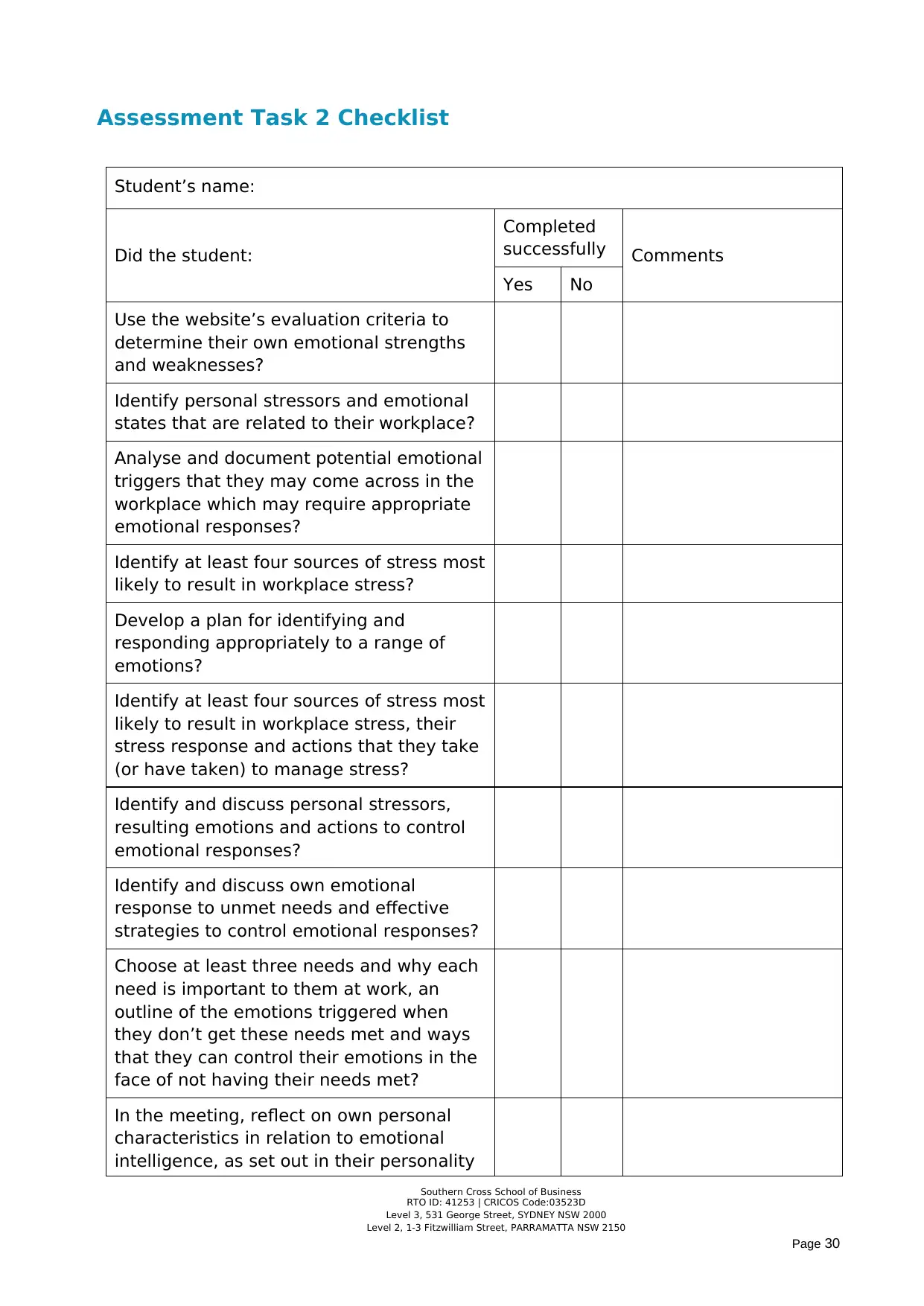
Assessment Task 2 Checklist
Student’s name:
Did the student:
Completed
successfully Comments
Yes No
Use the website’s evaluation criteria to
determine their own emotional strengths
and weaknesses?
Identify personal stressors and emotional
states that are related to their workplace?
Analyse and document potential emotional
triggers that they may come across in the
workplace which may require appropriate
emotional responses?
Identify at least four sources of stress most
likely to result in workplace stress?
Develop a plan for identifying and
responding appropriately to a range of
emotions?
Identify at least four sources of stress most
likely to result in workplace stress, their
stress response and actions that they take
(or have taken) to manage stress?
Identify and discuss personal stressors,
resulting emotions and actions to control
emotional responses?
Identify and discuss own emotional
response to unmet needs and effective
strategies to control emotional responses?
Choose at least three needs and why each
need is important to them at work, an
outline of the emotions triggered when
they don’t get these needs met and ways
that they can control their emotions in the
face of not having their needs met?
In the meeting, reflect on own personal
characteristics in relation to emotional
intelligence, as set out in their personality
Southern Cross School of Business
RTO ID: 41253 | CRICOS Code:03523D
Level 3, 531 George Street, SYDNEY NSW 2000
Level 2, 1-3 Fitzwilliam Street, PARRAMATTA NSW 2150
Page 30
Student’s name:
Did the student:
Completed
successfully Comments
Yes No
Use the website’s evaluation criteria to
determine their own emotional strengths
and weaknesses?
Identify personal stressors and emotional
states that are related to their workplace?
Analyse and document potential emotional
triggers that they may come across in the
workplace which may require appropriate
emotional responses?
Identify at least four sources of stress most
likely to result in workplace stress?
Develop a plan for identifying and
responding appropriately to a range of
emotions?
Identify at least four sources of stress most
likely to result in workplace stress, their
stress response and actions that they take
(or have taken) to manage stress?
Identify and discuss personal stressors,
resulting emotions and actions to control
emotional responses?
Identify and discuss own emotional
response to unmet needs and effective
strategies to control emotional responses?
Choose at least three needs and why each
need is important to them at work, an
outline of the emotions triggered when
they don’t get these needs met and ways
that they can control their emotions in the
face of not having their needs met?
In the meeting, reflect on own personal
characteristics in relation to emotional
intelligence, as set out in their personality
Southern Cross School of Business
RTO ID: 41253 | CRICOS Code:03523D
Level 3, 531 George Street, SYDNEY NSW 2000
Level 2, 1-3 Fitzwilliam Street, PARRAMATTA NSW 2150
Page 30
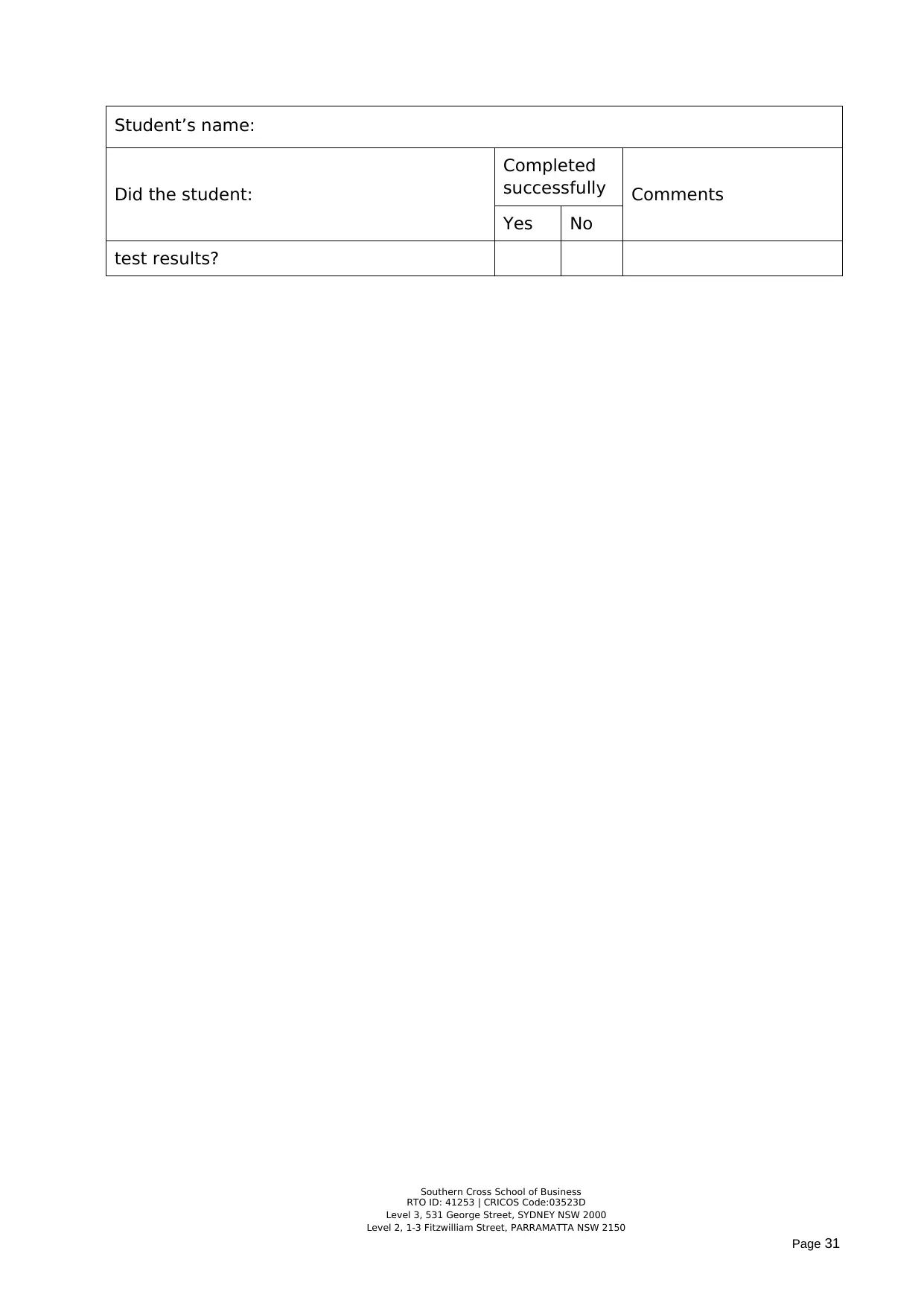
Student’s name:
Did the student:
Completed
successfully Comments
Yes No
test results?
Southern Cross School of Business
RTO ID: 41253 | CRICOS Code:03523D
Level 3, 531 George Street, SYDNEY NSW 2000
Level 2, 1-3 Fitzwilliam Street, PARRAMATTA NSW 2150
Page 31
Did the student:
Completed
successfully Comments
Yes No
test results?
Southern Cross School of Business
RTO ID: 41253 | CRICOS Code:03523D
Level 3, 531 George Street, SYDNEY NSW 2000
Level 2, 1-3 Fitzwilliam Street, PARRAMATTA NSW 2150
Page 31
Paraphrase This Document
Need a fresh take? Get an instant paraphrase of this document with our AI Paraphraser
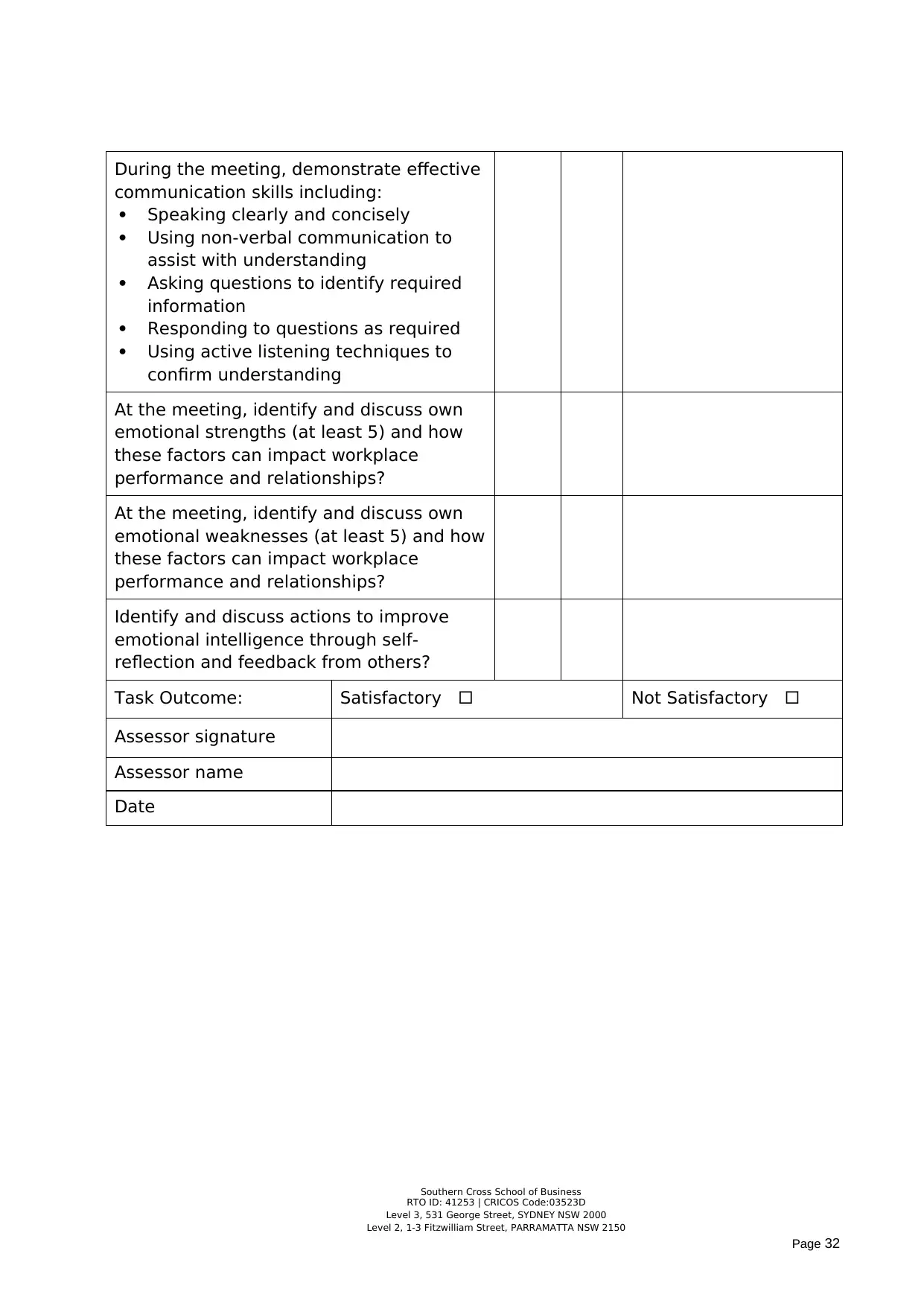
During the meeting, demonstrate effective
communication skills including:
Speaking clearly and concisely
Using non-verbal communication to
assist with understanding
Asking questions to identify required
information
Responding to questions as required
Using active listening techniques to
confirm understanding
At the meeting, identify and discuss own
emotional strengths (at least 5) and how
these factors can impact workplace
performance and relationships?
At the meeting, identify and discuss own
emotional weaknesses (at least 5) and how
these factors can impact workplace
performance and relationships?
Identify and discuss actions to improve
emotional intelligence through self-
reflection and feedback from others?
Task Outcome: Satisfactory Not Satisfactory
Assessor signature
Assessor name
Date
Southern Cross School of Business
RTO ID: 41253 | CRICOS Code:03523D
Level 3, 531 George Street, SYDNEY NSW 2000
Level 2, 1-3 Fitzwilliam Street, PARRAMATTA NSW 2150
Page 32
communication skills including:
Speaking clearly and concisely
Using non-verbal communication to
assist with understanding
Asking questions to identify required
information
Responding to questions as required
Using active listening techniques to
confirm understanding
At the meeting, identify and discuss own
emotional strengths (at least 5) and how
these factors can impact workplace
performance and relationships?
At the meeting, identify and discuss own
emotional weaknesses (at least 5) and how
these factors can impact workplace
performance and relationships?
Identify and discuss actions to improve
emotional intelligence through self-
reflection and feedback from others?
Task Outcome: Satisfactory Not Satisfactory
Assessor signature
Assessor name
Date
Southern Cross School of Business
RTO ID: 41253 | CRICOS Code:03523D
Level 3, 531 George Street, SYDNEY NSW 2000
Level 2, 1-3 Fitzwilliam Street, PARRAMATTA NSW 2150
Page 32
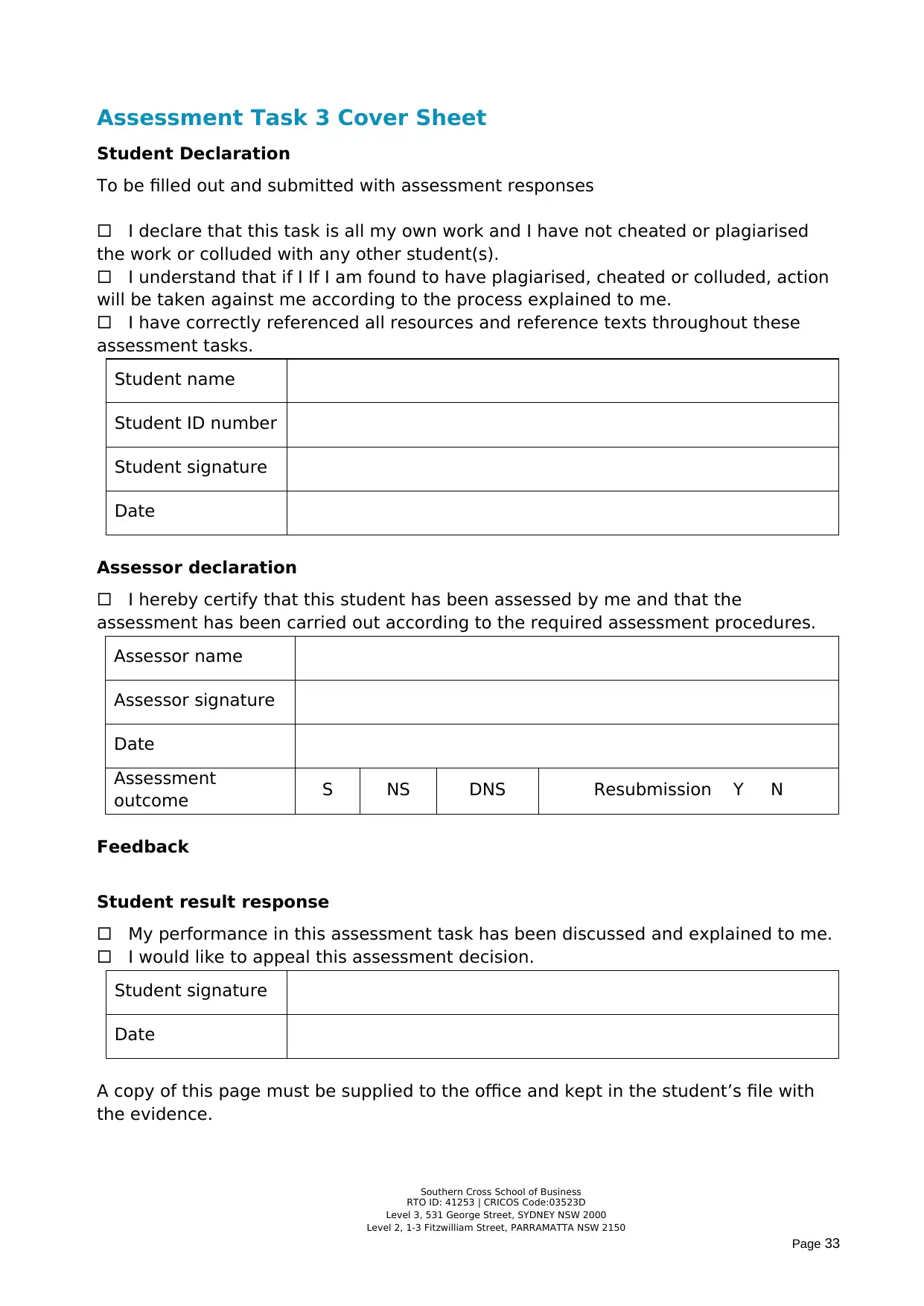
Assessment Task 3 Cover Sheet
Student Declaration
To be filled out and submitted with assessment responses
I declare that this task is all my own work and I have not cheated or plagiarised
the work or colluded with any other student(s).
I understand that if I If I am found to have plagiarised, cheated or colluded, action
will be taken against me according to the process explained to me.
I have correctly referenced all resources and reference texts throughout these
assessment tasks.
Student name
Student ID number
Student signature
Date
Assessor declaration
I hereby certify that this student has been assessed by me and that the
assessment has been carried out according to the required assessment procedures.
Assessor name
Assessor signature
Date
Assessment
outcome S NS DNS Resubmission Y N
Feedback
Student result response
My performance in this assessment task has been discussed and explained to me.
I would like to appeal this assessment decision.
Student signature
Date
A copy of this page must be supplied to the office and kept in the student’s file with
the evidence.
Southern Cross School of Business
RTO ID: 41253 | CRICOS Code:03523D
Level 3, 531 George Street, SYDNEY NSW 2000
Level 2, 1-3 Fitzwilliam Street, PARRAMATTA NSW 2150
Page 33
Student Declaration
To be filled out and submitted with assessment responses
I declare that this task is all my own work and I have not cheated or plagiarised
the work or colluded with any other student(s).
I understand that if I If I am found to have plagiarised, cheated or colluded, action
will be taken against me according to the process explained to me.
I have correctly referenced all resources and reference texts throughout these
assessment tasks.
Student name
Student ID number
Student signature
Date
Assessor declaration
I hereby certify that this student has been assessed by me and that the
assessment has been carried out according to the required assessment procedures.
Assessor name
Assessor signature
Date
Assessment
outcome S NS DNS Resubmission Y N
Feedback
Student result response
My performance in this assessment task has been discussed and explained to me.
I would like to appeal this assessment decision.
Student signature
Date
A copy of this page must be supplied to the office and kept in the student’s file with
the evidence.
Southern Cross School of Business
RTO ID: 41253 | CRICOS Code:03523D
Level 3, 531 George Street, SYDNEY NSW 2000
Level 2, 1-3 Fitzwilliam Street, PARRAMATTA NSW 2150
Page 33
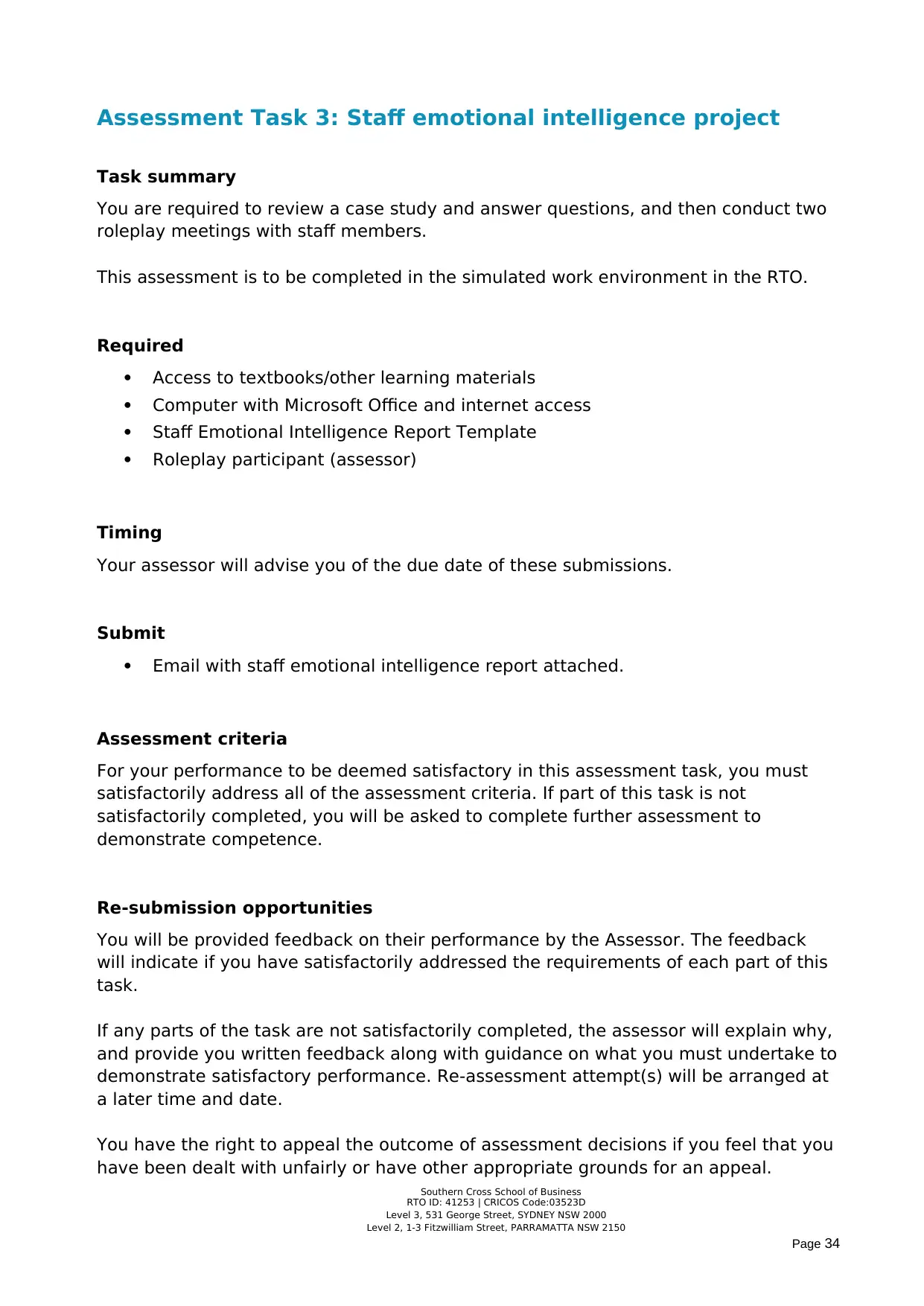
Assessment Task 3: Staff emotional intelligence project
Task summary
You are required to review a case study and answer questions, and then conduct two
roleplay meetings with staff members.
This assessment is to be completed in the simulated work environment in the RTO.
Required
Access to textbooks/other learning materials
Computer with Microsoft Office and internet access
Staff Emotional Intelligence Report Template
Roleplay participant (assessor)
Timing
Your assessor will advise you of the due date of these submissions.
Submit
Email with staff emotional intelligence report attached.
Assessment criteria
For your performance to be deemed satisfactory in this assessment task, you must
satisfactorily address all of the assessment criteria. If part of this task is not
satisfactorily completed, you will be asked to complete further assessment to
demonstrate competence.
Re-submission opportunities
You will be provided feedback on their performance by the Assessor. The feedback
will indicate if you have satisfactorily addressed the requirements of each part of this
task.
If any parts of the task are not satisfactorily completed, the assessor will explain why,
and provide you written feedback along with guidance on what you must undertake to
demonstrate satisfactory performance. Re-assessment attempt(s) will be arranged at
a later time and date.
You have the right to appeal the outcome of assessment decisions if you feel that you
have been dealt with unfairly or have other appropriate grounds for an appeal.
Southern Cross School of Business
RTO ID: 41253 | CRICOS Code:03523D
Level 3, 531 George Street, SYDNEY NSW 2000
Level 2, 1-3 Fitzwilliam Street, PARRAMATTA NSW 2150
Page 34
Task summary
You are required to review a case study and answer questions, and then conduct two
roleplay meetings with staff members.
This assessment is to be completed in the simulated work environment in the RTO.
Required
Access to textbooks/other learning materials
Computer with Microsoft Office and internet access
Staff Emotional Intelligence Report Template
Roleplay participant (assessor)
Timing
Your assessor will advise you of the due date of these submissions.
Submit
Email with staff emotional intelligence report attached.
Assessment criteria
For your performance to be deemed satisfactory in this assessment task, you must
satisfactorily address all of the assessment criteria. If part of this task is not
satisfactorily completed, you will be asked to complete further assessment to
demonstrate competence.
Re-submission opportunities
You will be provided feedback on their performance by the Assessor. The feedback
will indicate if you have satisfactorily addressed the requirements of each part of this
task.
If any parts of the task are not satisfactorily completed, the assessor will explain why,
and provide you written feedback along with guidance on what you must undertake to
demonstrate satisfactory performance. Re-assessment attempt(s) will be arranged at
a later time and date.
You have the right to appeal the outcome of assessment decisions if you feel that you
have been dealt with unfairly or have other appropriate grounds for an appeal.
Southern Cross School of Business
RTO ID: 41253 | CRICOS Code:03523D
Level 3, 531 George Street, SYDNEY NSW 2000
Level 2, 1-3 Fitzwilliam Street, PARRAMATTA NSW 2150
Page 34
Secure Best Marks with AI Grader
Need help grading? Try our AI Grader for instant feedback on your assignments.
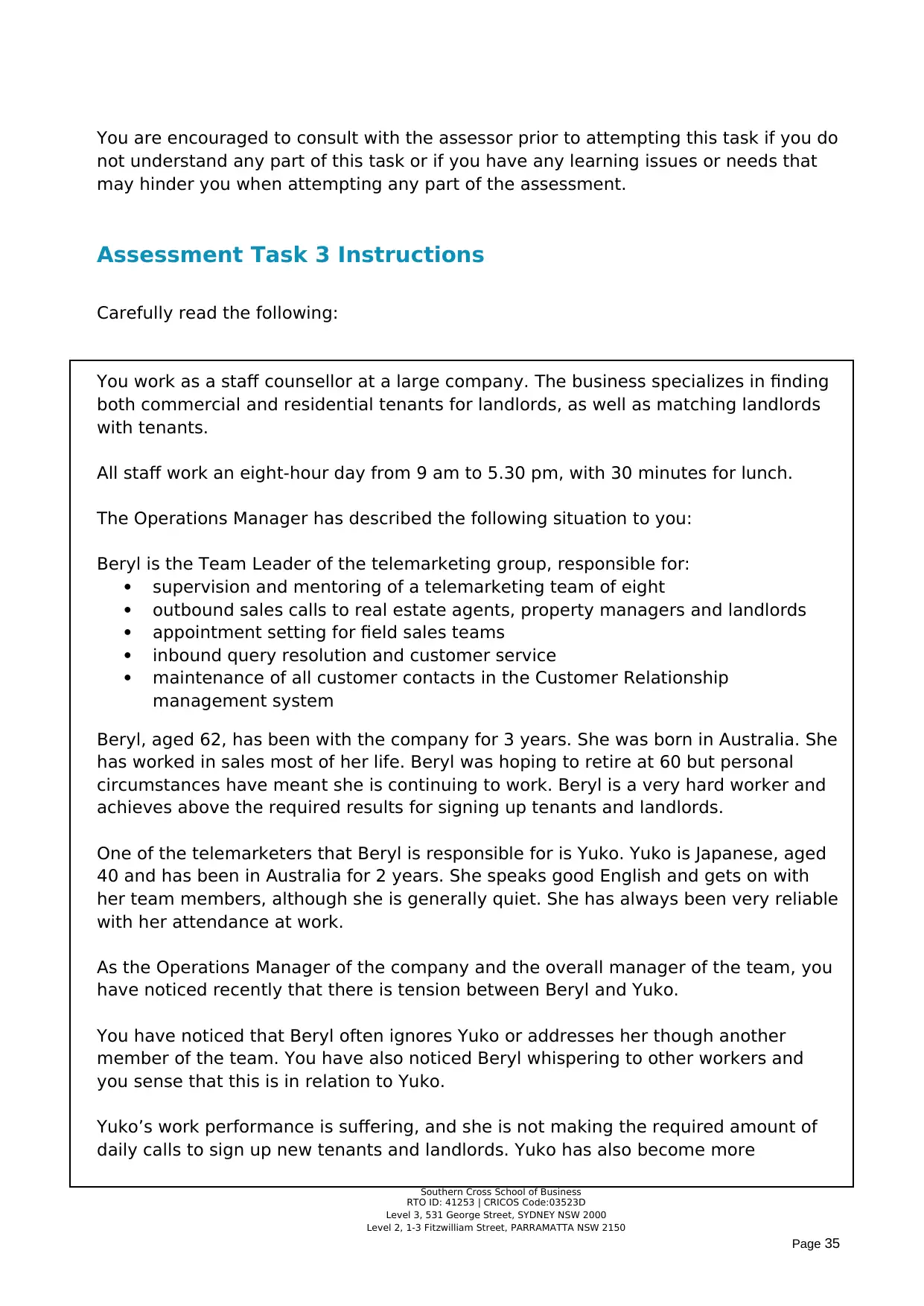
You are encouraged to consult with the assessor prior to attempting this task if you do
not understand any part of this task or if you have any learning issues or needs that
may hinder you when attempting any part of the assessment.
Assessment Task 3 Instructions
Carefully read the following:
You work as a staff counsellor at a large company. The business specializes in finding
both commercial and residential tenants for landlords, as well as matching landlords
with tenants.
All staff work an eight-hour day from 9 am to 5.30 pm, with 30 minutes for lunch.
The Operations Manager has described the following situation to you:
Beryl is the Team Leader of the telemarketing group, responsible for:
supervision and mentoring of a telemarketing team of eight
outbound sales calls to real estate agents, property managers and landlords
appointment setting for field sales teams
inbound query resolution and customer service
maintenance of all customer contacts in the Customer Relationship
management system
Beryl, aged 62, has been with the company for 3 years. She was born in Australia. She
has worked in sales most of her life. Beryl was hoping to retire at 60 but personal
circumstances have meant she is continuing to work. Beryl is a very hard worker and
achieves above the required results for signing up tenants and landlords.
One of the telemarketers that Beryl is responsible for is Yuko. Yuko is Japanese, aged
40 and has been in Australia for 2 years. She speaks good English and gets on with
her team members, although she is generally quiet. She has always been very reliable
with her attendance at work.
As the Operations Manager of the company and the overall manager of the team, you
have noticed recently that there is tension between Beryl and Yuko.
You have noticed that Beryl often ignores Yuko or addresses her though another
member of the team. You have also noticed Beryl whispering to other workers and
you sense that this is in relation to Yuko.
Yuko’s work performance is suffering, and she is not making the required amount of
daily calls to sign up new tenants and landlords. Yuko has also become more
Southern Cross School of Business
RTO ID: 41253 | CRICOS Code:03523D
Level 3, 531 George Street, SYDNEY NSW 2000
Level 2, 1-3 Fitzwilliam Street, PARRAMATTA NSW 2150
Page 35
not understand any part of this task or if you have any learning issues or needs that
may hinder you when attempting any part of the assessment.
Assessment Task 3 Instructions
Carefully read the following:
You work as a staff counsellor at a large company. The business specializes in finding
both commercial and residential tenants for landlords, as well as matching landlords
with tenants.
All staff work an eight-hour day from 9 am to 5.30 pm, with 30 minutes for lunch.
The Operations Manager has described the following situation to you:
Beryl is the Team Leader of the telemarketing group, responsible for:
supervision and mentoring of a telemarketing team of eight
outbound sales calls to real estate agents, property managers and landlords
appointment setting for field sales teams
inbound query resolution and customer service
maintenance of all customer contacts in the Customer Relationship
management system
Beryl, aged 62, has been with the company for 3 years. She was born in Australia. She
has worked in sales most of her life. Beryl was hoping to retire at 60 but personal
circumstances have meant she is continuing to work. Beryl is a very hard worker and
achieves above the required results for signing up tenants and landlords.
One of the telemarketers that Beryl is responsible for is Yuko. Yuko is Japanese, aged
40 and has been in Australia for 2 years. She speaks good English and gets on with
her team members, although she is generally quiet. She has always been very reliable
with her attendance at work.
As the Operations Manager of the company and the overall manager of the team, you
have noticed recently that there is tension between Beryl and Yuko.
You have noticed that Beryl often ignores Yuko or addresses her though another
member of the team. You have also noticed Beryl whispering to other workers and
you sense that this is in relation to Yuko.
Yuko’s work performance is suffering, and she is not making the required amount of
daily calls to sign up new tenants and landlords. Yuko has also become more
Southern Cross School of Business
RTO ID: 41253 | CRICOS Code:03523D
Level 3, 531 George Street, SYDNEY NSW 2000
Level 2, 1-3 Fitzwilliam Street, PARRAMATTA NSW 2150
Page 35
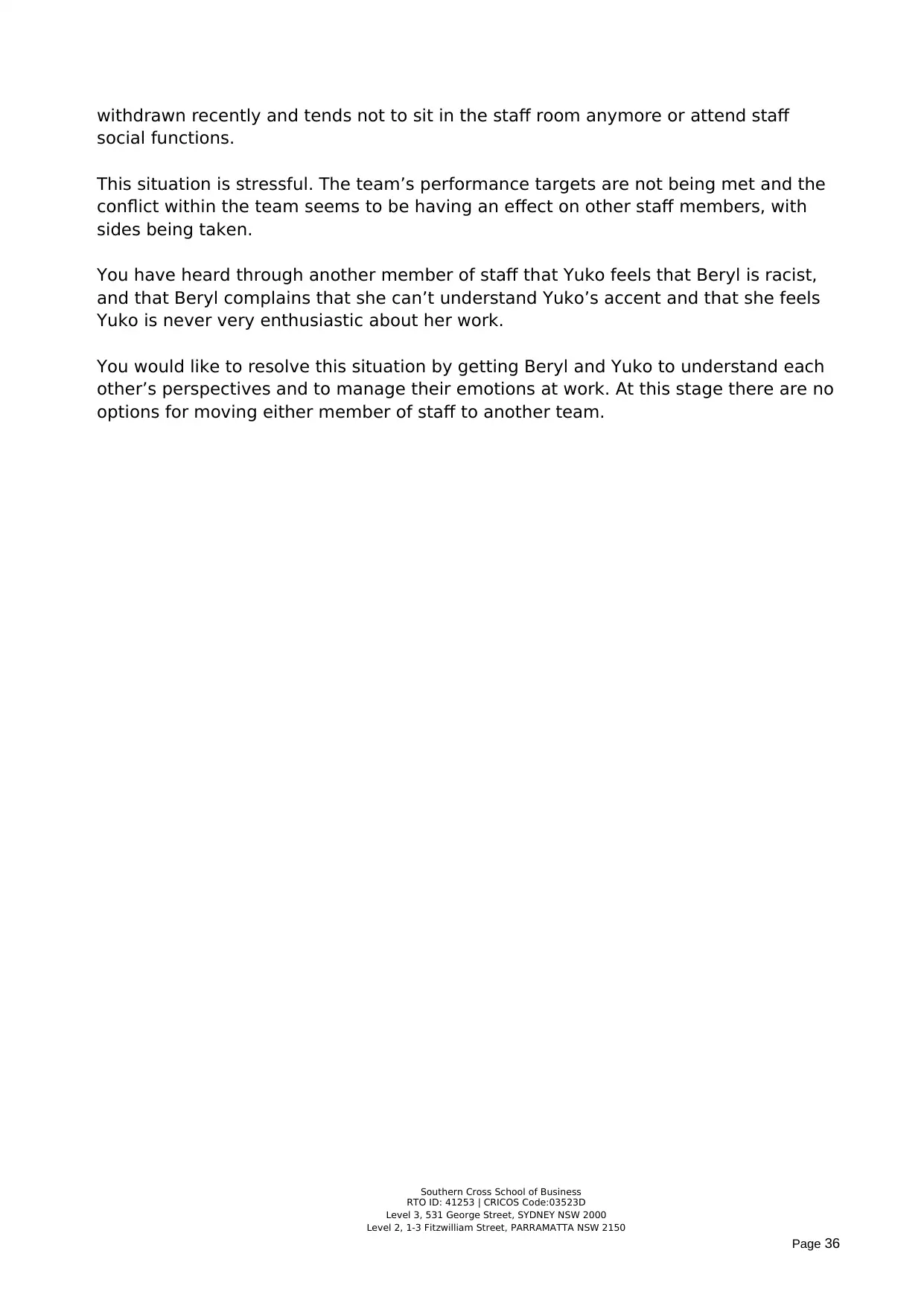
withdrawn recently and tends not to sit in the staff room anymore or attend staff
social functions.
This situation is stressful. The team’s performance targets are not being met and the
conflict within the team seems to be having an effect on other staff members, with
sides being taken.
You have heard through another member of staff that Yuko feels that Beryl is racist,
and that Beryl complains that she can’t understand Yuko’s accent and that she feels
Yuko is never very enthusiastic about her work.
You would like to resolve this situation by getting Beryl and Yuko to understand each
other’s perspectives and to manage their emotions at work. At this stage there are no
options for moving either member of staff to another team.
Southern Cross School of Business
RTO ID: 41253 | CRICOS Code:03523D
Level 3, 531 George Street, SYDNEY NSW 2000
Level 2, 1-3 Fitzwilliam Street, PARRAMATTA NSW 2150
Page 36
social functions.
This situation is stressful. The team’s performance targets are not being met and the
conflict within the team seems to be having an effect on other staff members, with
sides being taken.
You have heard through another member of staff that Yuko feels that Beryl is racist,
and that Beryl complains that she can’t understand Yuko’s accent and that she feels
Yuko is never very enthusiastic about her work.
You would like to resolve this situation by getting Beryl and Yuko to understand each
other’s perspectives and to manage their emotions at work. At this stage there are no
options for moving either member of staff to another team.
Southern Cross School of Business
RTO ID: 41253 | CRICOS Code:03523D
Level 3, 531 George Street, SYDNEY NSW 2000
Level 2, 1-3 Fitzwilliam Street, PARRAMATTA NSW 2150
Page 36
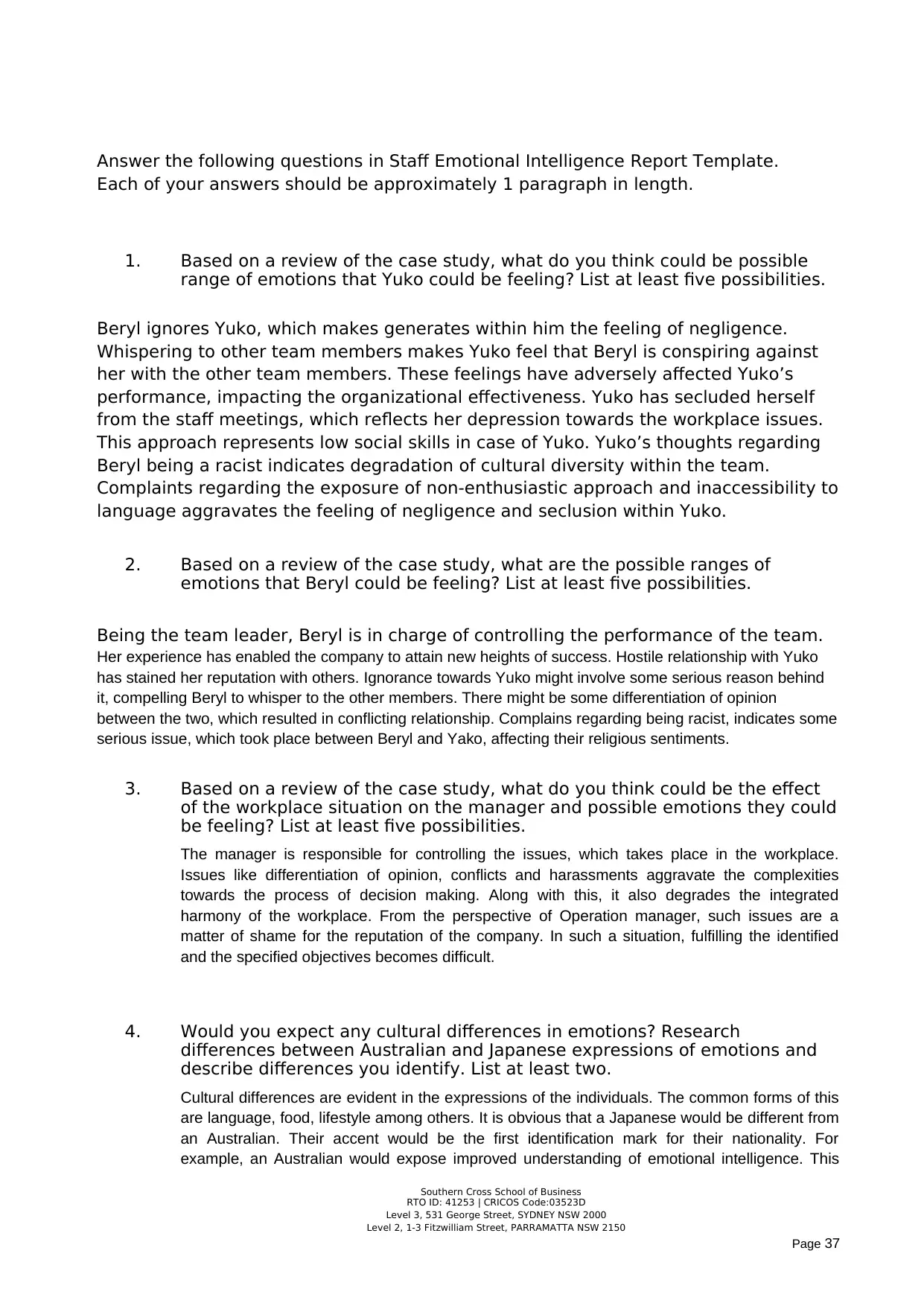
Answer the following questions in Staff Emotional Intelligence Report Template.
Each of your answers should be approximately 1 paragraph in length.
1. Based on a review of the case study, what do you think could be possible
range of emotions that Yuko could be feeling? List at least five possibilities.
Beryl ignores Yuko, which makes generates within him the feeling of negligence.
Whispering to other team members makes Yuko feel that Beryl is conspiring against
her with the other team members. These feelings have adversely affected Yuko’s
performance, impacting the organizational effectiveness. Yuko has secluded herself
from the staff meetings, which reflects her depression towards the workplace issues.
This approach represents low social skills in case of Yuko. Yuko’s thoughts regarding
Beryl being a racist indicates degradation of cultural diversity within the team.
Complaints regarding the exposure of non-enthusiastic approach and inaccessibility to
language aggravates the feeling of negligence and seclusion within Yuko.
2. Based on a review of the case study, what are the possible ranges of
emotions that Beryl could be feeling? List at least five possibilities.
Being the team leader, Beryl is in charge of controlling the performance of the team.
Her experience has enabled the company to attain new heights of success. Hostile relationship with Yuko
has stained her reputation with others. Ignorance towards Yuko might involve some serious reason behind
it, compelling Beryl to whisper to the other members. There might be some differentiation of opinion
between the two, which resulted in conflicting relationship. Complains regarding being racist, indicates some
serious issue, which took place between Beryl and Yako, affecting their religious sentiments.
3. Based on a review of the case study, what do you think could be the effect
of the workplace situation on the manager and possible emotions they could
be feeling? List at least five possibilities.
The manager is responsible for controlling the issues, which takes place in the workplace.
Issues like differentiation of opinion, conflicts and harassments aggravate the complexities
towards the process of decision making. Along with this, it also degrades the integrated
harmony of the workplace. From the perspective of Operation manager, such issues are a
matter of shame for the reputation of the company. In such a situation, fulfilling the identified
and the specified objectives becomes difficult.
4. Would you expect any cultural differences in emotions? Research
differences between Australian and Japanese expressions of emotions and
describe differences you identify. List at least two.
Cultural differences are evident in the expressions of the individuals. The common forms of this
are language, food, lifestyle among others. It is obvious that a Japanese would be different from
an Australian. Their accent would be the first identification mark for their nationality. For
example, an Australian would expose improved understanding of emotional intelligence. This
Southern Cross School of Business
RTO ID: 41253 | CRICOS Code:03523D
Level 3, 531 George Street, SYDNEY NSW 2000
Level 2, 1-3 Fitzwilliam Street, PARRAMATTA NSW 2150
Page 37
Each of your answers should be approximately 1 paragraph in length.
1. Based on a review of the case study, what do you think could be possible
range of emotions that Yuko could be feeling? List at least five possibilities.
Beryl ignores Yuko, which makes generates within him the feeling of negligence.
Whispering to other team members makes Yuko feel that Beryl is conspiring against
her with the other team members. These feelings have adversely affected Yuko’s
performance, impacting the organizational effectiveness. Yuko has secluded herself
from the staff meetings, which reflects her depression towards the workplace issues.
This approach represents low social skills in case of Yuko. Yuko’s thoughts regarding
Beryl being a racist indicates degradation of cultural diversity within the team.
Complaints regarding the exposure of non-enthusiastic approach and inaccessibility to
language aggravates the feeling of negligence and seclusion within Yuko.
2. Based on a review of the case study, what are the possible ranges of
emotions that Beryl could be feeling? List at least five possibilities.
Being the team leader, Beryl is in charge of controlling the performance of the team.
Her experience has enabled the company to attain new heights of success. Hostile relationship with Yuko
has stained her reputation with others. Ignorance towards Yuko might involve some serious reason behind
it, compelling Beryl to whisper to the other members. There might be some differentiation of opinion
between the two, which resulted in conflicting relationship. Complains regarding being racist, indicates some
serious issue, which took place between Beryl and Yako, affecting their religious sentiments.
3. Based on a review of the case study, what do you think could be the effect
of the workplace situation on the manager and possible emotions they could
be feeling? List at least five possibilities.
The manager is responsible for controlling the issues, which takes place in the workplace.
Issues like differentiation of opinion, conflicts and harassments aggravate the complexities
towards the process of decision making. Along with this, it also degrades the integrated
harmony of the workplace. From the perspective of Operation manager, such issues are a
matter of shame for the reputation of the company. In such a situation, fulfilling the identified
and the specified objectives becomes difficult.
4. Would you expect any cultural differences in emotions? Research
differences between Australian and Japanese expressions of emotions and
describe differences you identify. List at least two.
Cultural differences are evident in the expressions of the individuals. The common forms of this
are language, food, lifestyle among others. It is obvious that a Japanese would be different from
an Australian. Their accent would be the first identification mark for their nationality. For
example, an Australian would expose improved understanding of emotional intelligence. This
Southern Cross School of Business
RTO ID: 41253 | CRICOS Code:03523D
Level 3, 531 George Street, SYDNEY NSW 2000
Level 2, 1-3 Fitzwilliam Street, PARRAMATTA NSW 2150
Page 37
Paraphrase This Document
Need a fresh take? Get an instant paraphrase of this document with our AI Paraphraser
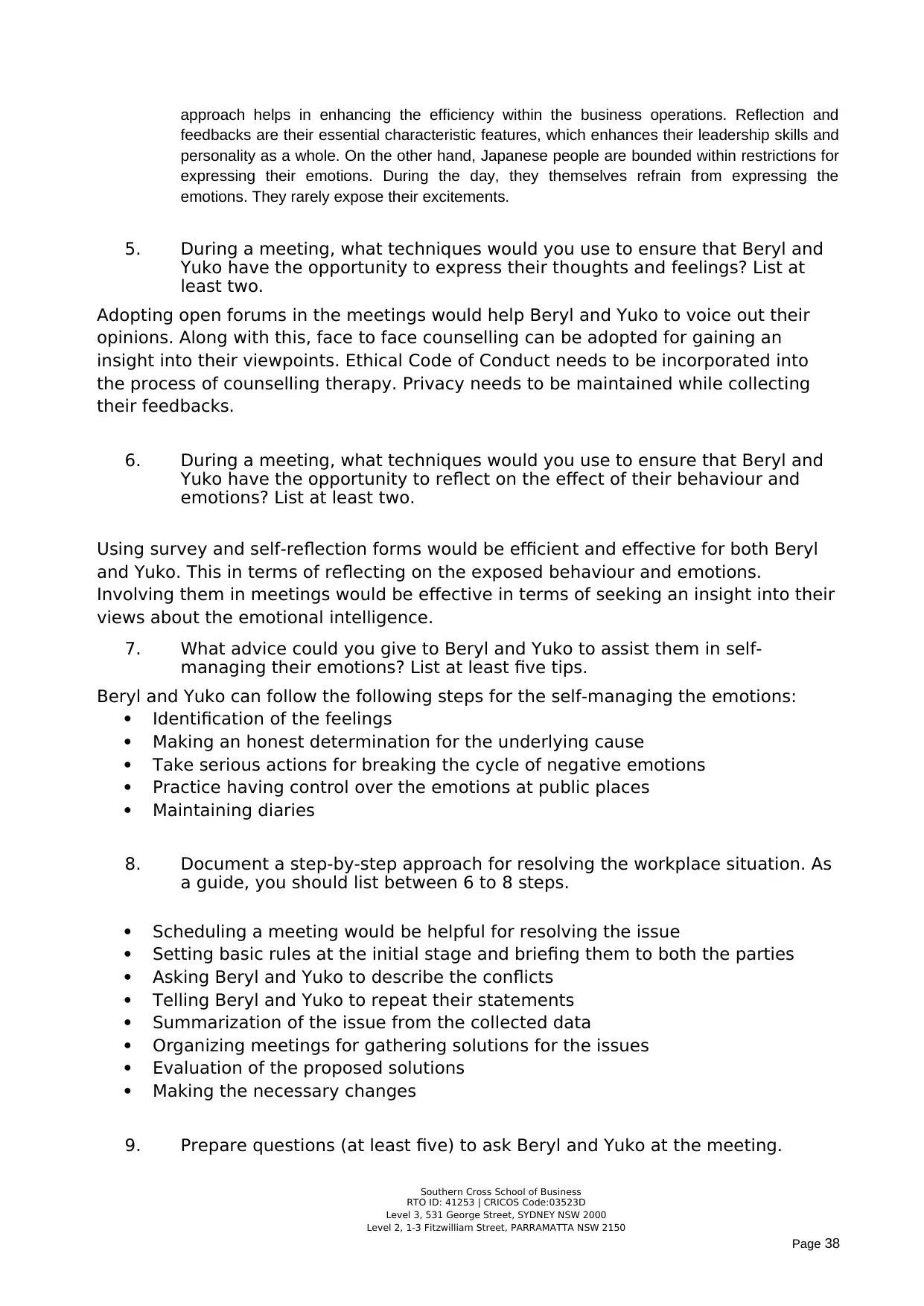
approach helps in enhancing the efficiency within the business operations. Reflection and
feedbacks are their essential characteristic features, which enhances their leadership skills and
personality as a whole. On the other hand, Japanese people are bounded within restrictions for
expressing their emotions. During the day, they themselves refrain from expressing the
emotions. They rarely expose their excitements.
5. During a meeting, what techniques would you use to ensure that Beryl and
Yuko have the opportunity to express their thoughts and feelings? List at
least two.
Adopting open forums in the meetings would help Beryl and Yuko to voice out their
opinions. Along with this, face to face counselling can be adopted for gaining an
insight into their viewpoints. Ethical Code of Conduct needs to be incorporated into
the process of counselling therapy. Privacy needs to be maintained while collecting
their feedbacks.
6. During a meeting, what techniques would you use to ensure that Beryl and
Yuko have the opportunity to reflect on the effect of their behaviour and
emotions? List at least two.
Using survey and self-reflection forms would be efficient and effective for both Beryl
and Yuko. This in terms of reflecting on the exposed behaviour and emotions.
Involving them in meetings would be effective in terms of seeking an insight into their
views about the emotional intelligence.
7. What advice could you give to Beryl and Yuko to assist them in self-
managing their emotions? List at least five tips.
Beryl and Yuko can follow the following steps for the self-managing the emotions:
Identification of the feelings
Making an honest determination for the underlying cause
Take serious actions for breaking the cycle of negative emotions
Practice having control over the emotions at public places
Maintaining diaries
8. Document a step-by-step approach for resolving the workplace situation. As
a guide, you should list between 6 to 8 steps.
Scheduling a meeting would be helpful for resolving the issue
Setting basic rules at the initial stage and briefing them to both the parties
Asking Beryl and Yuko to describe the conflicts
Telling Beryl and Yuko to repeat their statements
Summarization of the issue from the collected data
Organizing meetings for gathering solutions for the issues
Evaluation of the proposed solutions
Making the necessary changes
9. Prepare questions (at least five) to ask Beryl and Yuko at the meeting.
Southern Cross School of Business
RTO ID: 41253 | CRICOS Code:03523D
Level 3, 531 George Street, SYDNEY NSW 2000
Level 2, 1-3 Fitzwilliam Street, PARRAMATTA NSW 2150
Page 38
feedbacks are their essential characteristic features, which enhances their leadership skills and
personality as a whole. On the other hand, Japanese people are bounded within restrictions for
expressing their emotions. During the day, they themselves refrain from expressing the
emotions. They rarely expose their excitements.
5. During a meeting, what techniques would you use to ensure that Beryl and
Yuko have the opportunity to express their thoughts and feelings? List at
least two.
Adopting open forums in the meetings would help Beryl and Yuko to voice out their
opinions. Along with this, face to face counselling can be adopted for gaining an
insight into their viewpoints. Ethical Code of Conduct needs to be incorporated into
the process of counselling therapy. Privacy needs to be maintained while collecting
their feedbacks.
6. During a meeting, what techniques would you use to ensure that Beryl and
Yuko have the opportunity to reflect on the effect of their behaviour and
emotions? List at least two.
Using survey and self-reflection forms would be efficient and effective for both Beryl
and Yuko. This in terms of reflecting on the exposed behaviour and emotions.
Involving them in meetings would be effective in terms of seeking an insight into their
views about the emotional intelligence.
7. What advice could you give to Beryl and Yuko to assist them in self-
managing their emotions? List at least five tips.
Beryl and Yuko can follow the following steps for the self-managing the emotions:
Identification of the feelings
Making an honest determination for the underlying cause
Take serious actions for breaking the cycle of negative emotions
Practice having control over the emotions at public places
Maintaining diaries
8. Document a step-by-step approach for resolving the workplace situation. As
a guide, you should list between 6 to 8 steps.
Scheduling a meeting would be helpful for resolving the issue
Setting basic rules at the initial stage and briefing them to both the parties
Asking Beryl and Yuko to describe the conflicts
Telling Beryl and Yuko to repeat their statements
Summarization of the issue from the collected data
Organizing meetings for gathering solutions for the issues
Evaluation of the proposed solutions
Making the necessary changes
9. Prepare questions (at least five) to ask Beryl and Yuko at the meeting.
Southern Cross School of Business
RTO ID: 41253 | CRICOS Code:03523D
Level 3, 531 George Street, SYDNEY NSW 2000
Level 2, 1-3 Fitzwilliam Street, PARRAMATTA NSW 2150
Page 38
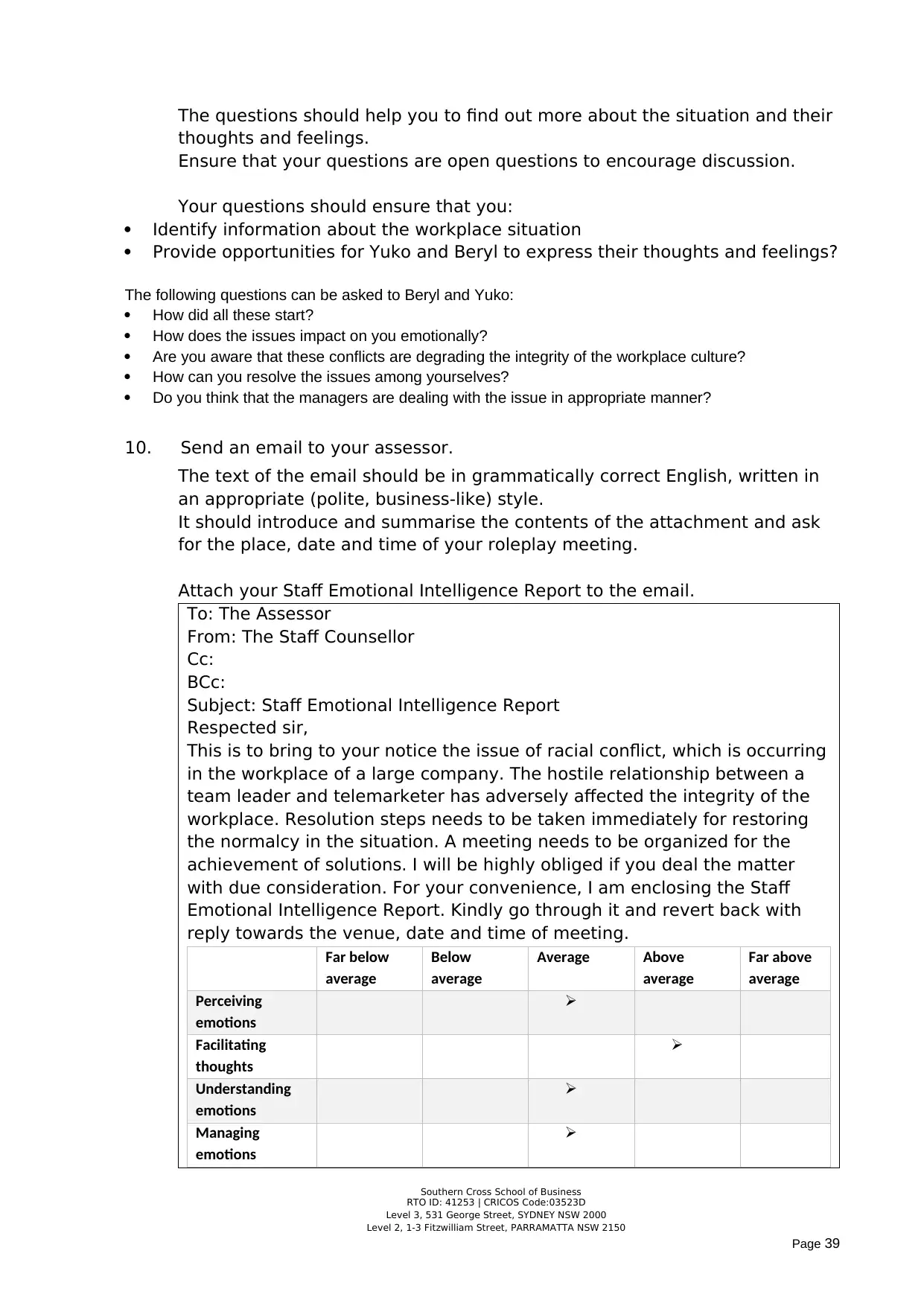
The questions should help you to find out more about the situation and their
thoughts and feelings.
Ensure that your questions are open questions to encourage discussion.
Your questions should ensure that you:
Identify information about the workplace situation
Provide opportunities for Yuko and Beryl to express their thoughts and feelings?
The following questions can be asked to Beryl and Yuko:
How did all these start?
How does the issues impact on you emotionally?
Are you aware that these conflicts are degrading the integrity of the workplace culture?
How can you resolve the issues among yourselves?
Do you think that the managers are dealing with the issue in appropriate manner?
10. Send an email to your assessor.
The text of the email should be in grammatically correct English, written in
an appropriate (polite, business-like) style.
It should introduce and summarise the contents of the attachment and ask
for the place, date and time of your roleplay meeting.
Attach your Staff Emotional Intelligence Report to the email.
To: The Assessor
From: The Staff Counsellor
Cc:
BCc:
Subject: Staff Emotional Intelligence Report
Respected sir,
This is to bring to your notice the issue of racial conflict, which is occurring
in the workplace of a large company. The hostile relationship between a
team leader and telemarketer has adversely affected the integrity of the
workplace. Resolution steps needs to be taken immediately for restoring
the normalcy in the situation. A meeting needs to be organized for the
achievement of solutions. I will be highly obliged if you deal the matter
with due consideration. For your convenience, I am enclosing the Staff
Emotional Intelligence Report. Kindly go through it and revert back with
reply towards the venue, date and time of meeting.
Far below
average
Below
average
Average Above
average
Far above
average
Perceiving
emotions
Facilitating
thoughts
Understanding
emotions
Managing
emotions
Southern Cross School of Business
RTO ID: 41253 | CRICOS Code:03523D
Level 3, 531 George Street, SYDNEY NSW 2000
Level 2, 1-3 Fitzwilliam Street, PARRAMATTA NSW 2150
Page 39
thoughts and feelings.
Ensure that your questions are open questions to encourage discussion.
Your questions should ensure that you:
Identify information about the workplace situation
Provide opportunities for Yuko and Beryl to express their thoughts and feelings?
The following questions can be asked to Beryl and Yuko:
How did all these start?
How does the issues impact on you emotionally?
Are you aware that these conflicts are degrading the integrity of the workplace culture?
How can you resolve the issues among yourselves?
Do you think that the managers are dealing with the issue in appropriate manner?
10. Send an email to your assessor.
The text of the email should be in grammatically correct English, written in
an appropriate (polite, business-like) style.
It should introduce and summarise the contents of the attachment and ask
for the place, date and time of your roleplay meeting.
Attach your Staff Emotional Intelligence Report to the email.
To: The Assessor
From: The Staff Counsellor
Cc:
BCc:
Subject: Staff Emotional Intelligence Report
Respected sir,
This is to bring to your notice the issue of racial conflict, which is occurring
in the workplace of a large company. The hostile relationship between a
team leader and telemarketer has adversely affected the integrity of the
workplace. Resolution steps needs to be taken immediately for restoring
the normalcy in the situation. A meeting needs to be organized for the
achievement of solutions. I will be highly obliged if you deal the matter
with due consideration. For your convenience, I am enclosing the Staff
Emotional Intelligence Report. Kindly go through it and revert back with
reply towards the venue, date and time of meeting.
Far below
average
Below
average
Average Above
average
Far above
average
Perceiving
emotions
Facilitating
thoughts
Understanding
emotions
Managing
emotions
Southern Cross School of Business
RTO ID: 41253 | CRICOS Code:03523D
Level 3, 531 George Street, SYDNEY NSW 2000
Level 2, 1-3 Fitzwilliam Street, PARRAMATTA NSW 2150
Page 39
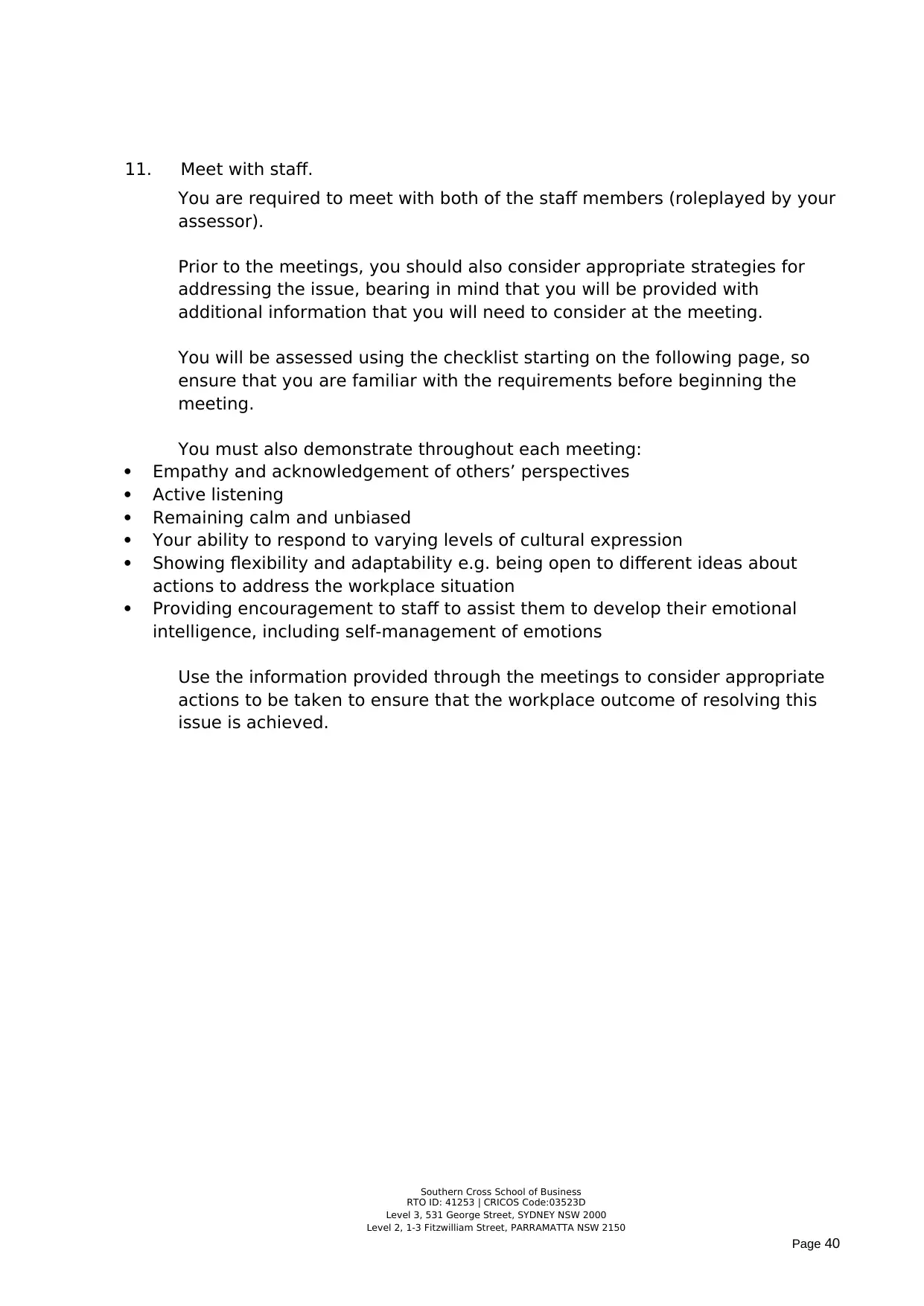
11. Meet with staff.
You are required to meet with both of the staff members (roleplayed by your
assessor).
Prior to the meetings, you should also consider appropriate strategies for
addressing the issue, bearing in mind that you will be provided with
additional information that you will need to consider at the meeting.
You will be assessed using the checklist starting on the following page, so
ensure that you are familiar with the requirements before beginning the
meeting.
You must also demonstrate throughout each meeting:
Empathy and acknowledgement of others’ perspectives
Active listening
Remaining calm and unbiased
Your ability to respond to varying levels of cultural expression
Showing flexibility and adaptability e.g. being open to different ideas about
actions to address the workplace situation
Providing encouragement to staff to assist them to develop their emotional
intelligence, including self-management of emotions
Use the information provided through the meetings to consider appropriate
actions to be taken to ensure that the workplace outcome of resolving this
issue is achieved.
Southern Cross School of Business
RTO ID: 41253 | CRICOS Code:03523D
Level 3, 531 George Street, SYDNEY NSW 2000
Level 2, 1-3 Fitzwilliam Street, PARRAMATTA NSW 2150
Page 40
You are required to meet with both of the staff members (roleplayed by your
assessor).
Prior to the meetings, you should also consider appropriate strategies for
addressing the issue, bearing in mind that you will be provided with
additional information that you will need to consider at the meeting.
You will be assessed using the checklist starting on the following page, so
ensure that you are familiar with the requirements before beginning the
meeting.
You must also demonstrate throughout each meeting:
Empathy and acknowledgement of others’ perspectives
Active listening
Remaining calm and unbiased
Your ability to respond to varying levels of cultural expression
Showing flexibility and adaptability e.g. being open to different ideas about
actions to address the workplace situation
Providing encouragement to staff to assist them to develop their emotional
intelligence, including self-management of emotions
Use the information provided through the meetings to consider appropriate
actions to be taken to ensure that the workplace outcome of resolving this
issue is achieved.
Southern Cross School of Business
RTO ID: 41253 | CRICOS Code:03523D
Level 3, 531 George Street, SYDNEY NSW 2000
Level 2, 1-3 Fitzwilliam Street, PARRAMATTA NSW 2150
Page 40
Secure Best Marks with AI Grader
Need help grading? Try our AI Grader for instant feedback on your assignments.
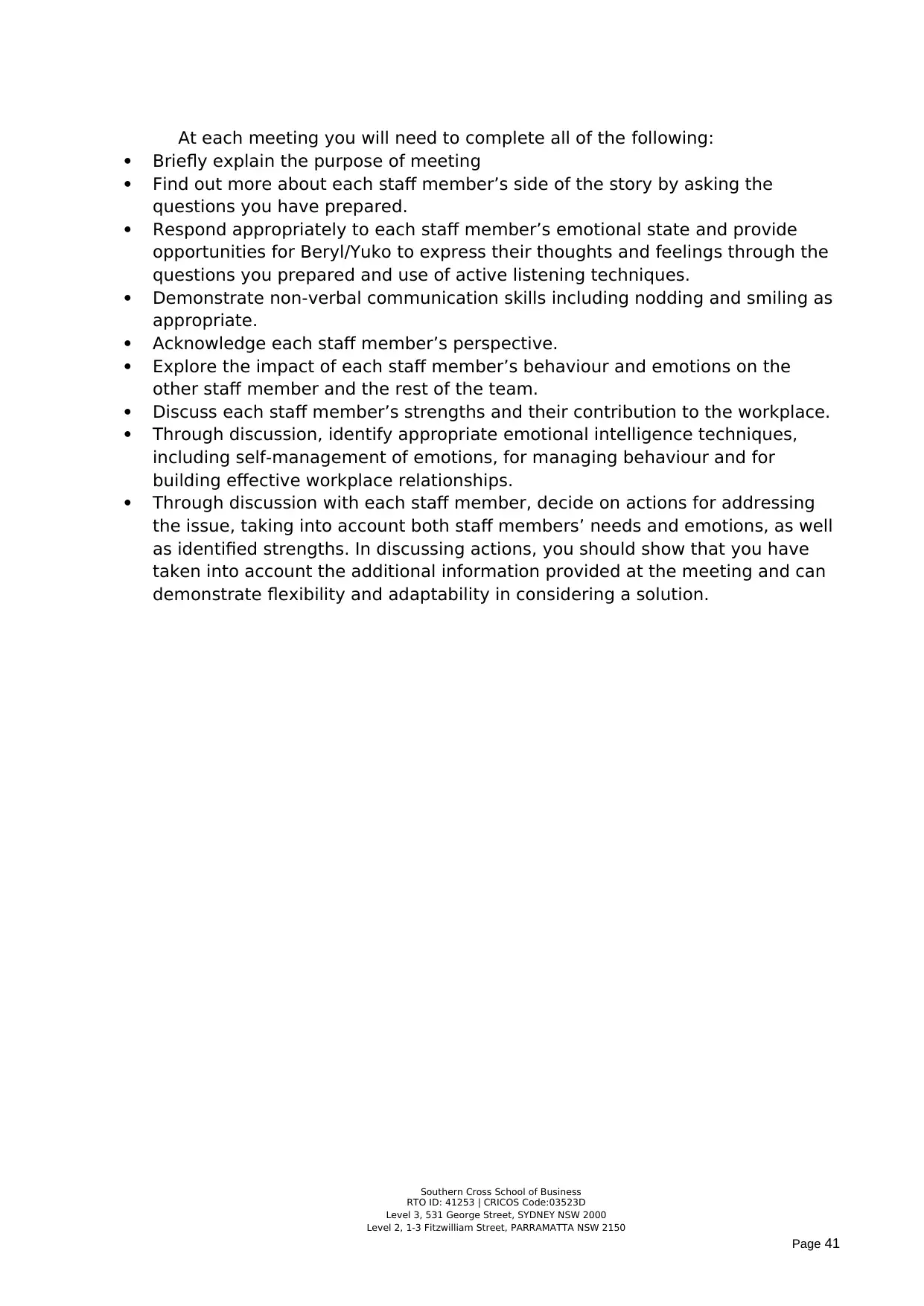
At each meeting you will need to complete all of the following:
Briefly explain the purpose of meeting
Find out more about each staff member’s side of the story by asking the
questions you have prepared.
Respond appropriately to each staff member’s emotional state and provide
opportunities for Beryl/Yuko to express their thoughts and feelings through the
questions you prepared and use of active listening techniques.
Demonstrate non-verbal communication skills including nodding and smiling as
appropriate.
Acknowledge each staff member’s perspective.
Explore the impact of each staff member’s behaviour and emotions on the
other staff member and the rest of the team.
Discuss each staff member’s strengths and their contribution to the workplace.
Through discussion, identify appropriate emotional intelligence techniques,
including self-management of emotions, for managing behaviour and for
building effective workplace relationships.
Through discussion with each staff member, decide on actions for addressing
the issue, taking into account both staff members’ needs and emotions, as well
as identified strengths. In discussing actions, you should show that you have
taken into account the additional information provided at the meeting and can
demonstrate flexibility and adaptability in considering a solution.
Southern Cross School of Business
RTO ID: 41253 | CRICOS Code:03523D
Level 3, 531 George Street, SYDNEY NSW 2000
Level 2, 1-3 Fitzwilliam Street, PARRAMATTA NSW 2150
Page 41
Briefly explain the purpose of meeting
Find out more about each staff member’s side of the story by asking the
questions you have prepared.
Respond appropriately to each staff member’s emotional state and provide
opportunities for Beryl/Yuko to express their thoughts and feelings through the
questions you prepared and use of active listening techniques.
Demonstrate non-verbal communication skills including nodding and smiling as
appropriate.
Acknowledge each staff member’s perspective.
Explore the impact of each staff member’s behaviour and emotions on the
other staff member and the rest of the team.
Discuss each staff member’s strengths and their contribution to the workplace.
Through discussion, identify appropriate emotional intelligence techniques,
including self-management of emotions, for managing behaviour and for
building effective workplace relationships.
Through discussion with each staff member, decide on actions for addressing
the issue, taking into account both staff members’ needs and emotions, as well
as identified strengths. In discussing actions, you should show that you have
taken into account the additional information provided at the meeting and can
demonstrate flexibility and adaptability in considering a solution.
Southern Cross School of Business
RTO ID: 41253 | CRICOS Code:03523D
Level 3, 531 George Street, SYDNEY NSW 2000
Level 2, 1-3 Fitzwilliam Street, PARRAMATTA NSW 2150
Page 41
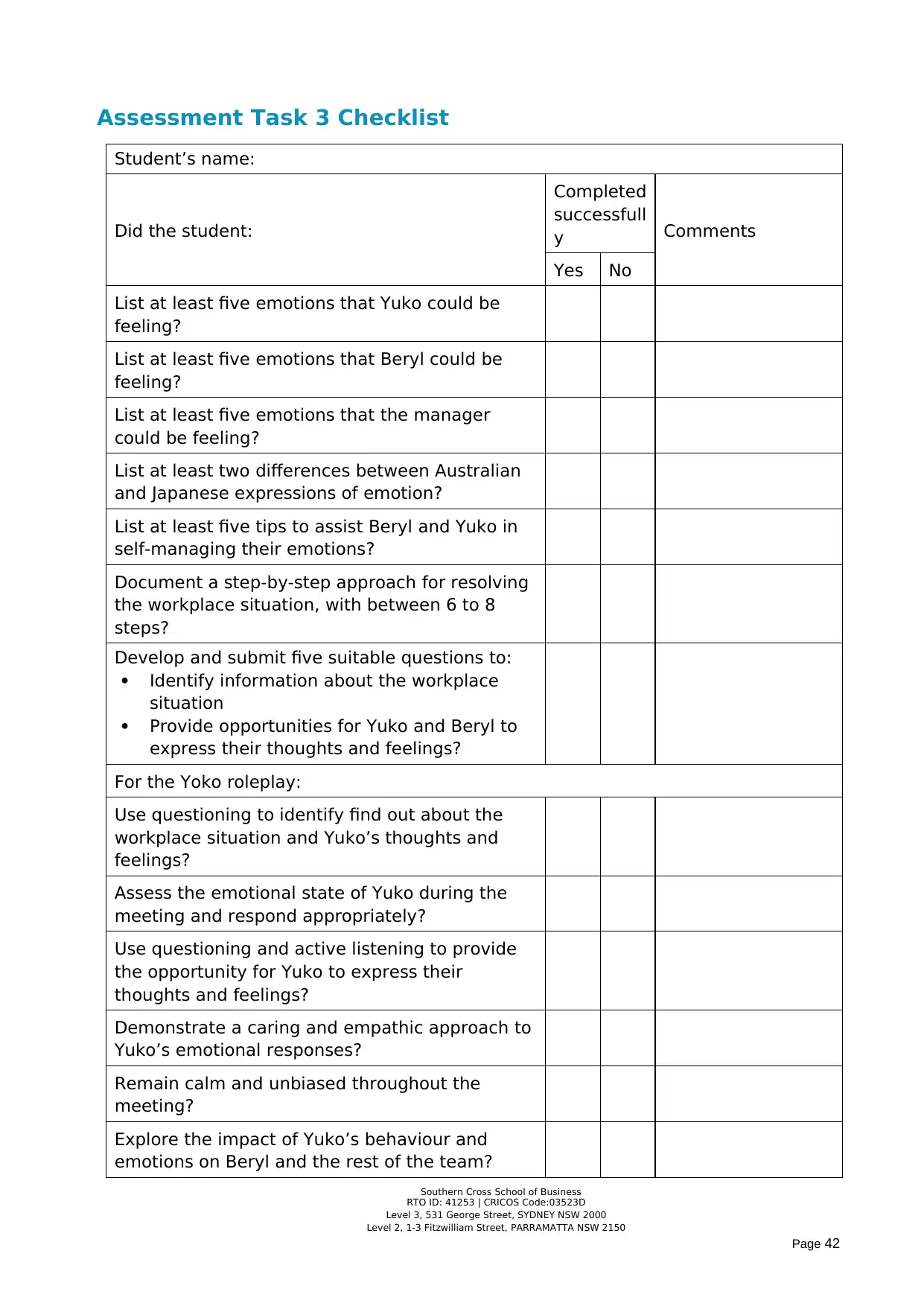
Assessment Task 3 Checklist
Student’s name:
Did the student:
Completed
successfull
y Comments
Yes No
List at least five emotions that Yuko could be
feeling?
List at least five emotions that Beryl could be
feeling?
List at least five emotions that the manager
could be feeling?
List at least two differences between Australian
and Japanese expressions of emotion?
List at least five tips to assist Beryl and Yuko in
self-managing their emotions?
Document a step-by-step approach for resolving
the workplace situation, with between 6 to 8
steps?
Develop and submit five suitable questions to:
Identify information about the workplace
situation
Provide opportunities for Yuko and Beryl to
express their thoughts and feelings?
For the Yoko roleplay:
Use questioning to identify find out about the
workplace situation and Yuko’s thoughts and
feelings?
Assess the emotional state of Yuko during the
meeting and respond appropriately?
Use questioning and active listening to provide
the opportunity for Yuko to express their
thoughts and feelings?
Demonstrate a caring and empathic approach to
Yuko’s emotional responses?
Remain calm and unbiased throughout the
meeting?
Explore the impact of Yuko’s behaviour and
emotions on Beryl and the rest of the team?
Southern Cross School of Business
RTO ID: 41253 | CRICOS Code:03523D
Level 3, 531 George Street, SYDNEY NSW 2000
Level 2, 1-3 Fitzwilliam Street, PARRAMATTA NSW 2150
Page 42
Student’s name:
Did the student:
Completed
successfull
y Comments
Yes No
List at least five emotions that Yuko could be
feeling?
List at least five emotions that Beryl could be
feeling?
List at least five emotions that the manager
could be feeling?
List at least two differences between Australian
and Japanese expressions of emotion?
List at least five tips to assist Beryl and Yuko in
self-managing their emotions?
Document a step-by-step approach for resolving
the workplace situation, with between 6 to 8
steps?
Develop and submit five suitable questions to:
Identify information about the workplace
situation
Provide opportunities for Yuko and Beryl to
express their thoughts and feelings?
For the Yoko roleplay:
Use questioning to identify find out about the
workplace situation and Yuko’s thoughts and
feelings?
Assess the emotional state of Yuko during the
meeting and respond appropriately?
Use questioning and active listening to provide
the opportunity for Yuko to express their
thoughts and feelings?
Demonstrate a caring and empathic approach to
Yuko’s emotional responses?
Remain calm and unbiased throughout the
meeting?
Explore the impact of Yuko’s behaviour and
emotions on Beryl and the rest of the team?
Southern Cross School of Business
RTO ID: 41253 | CRICOS Code:03523D
Level 3, 531 George Street, SYDNEY NSW 2000
Level 2, 1-3 Fitzwilliam Street, PARRAMATTA NSW 2150
Page 42
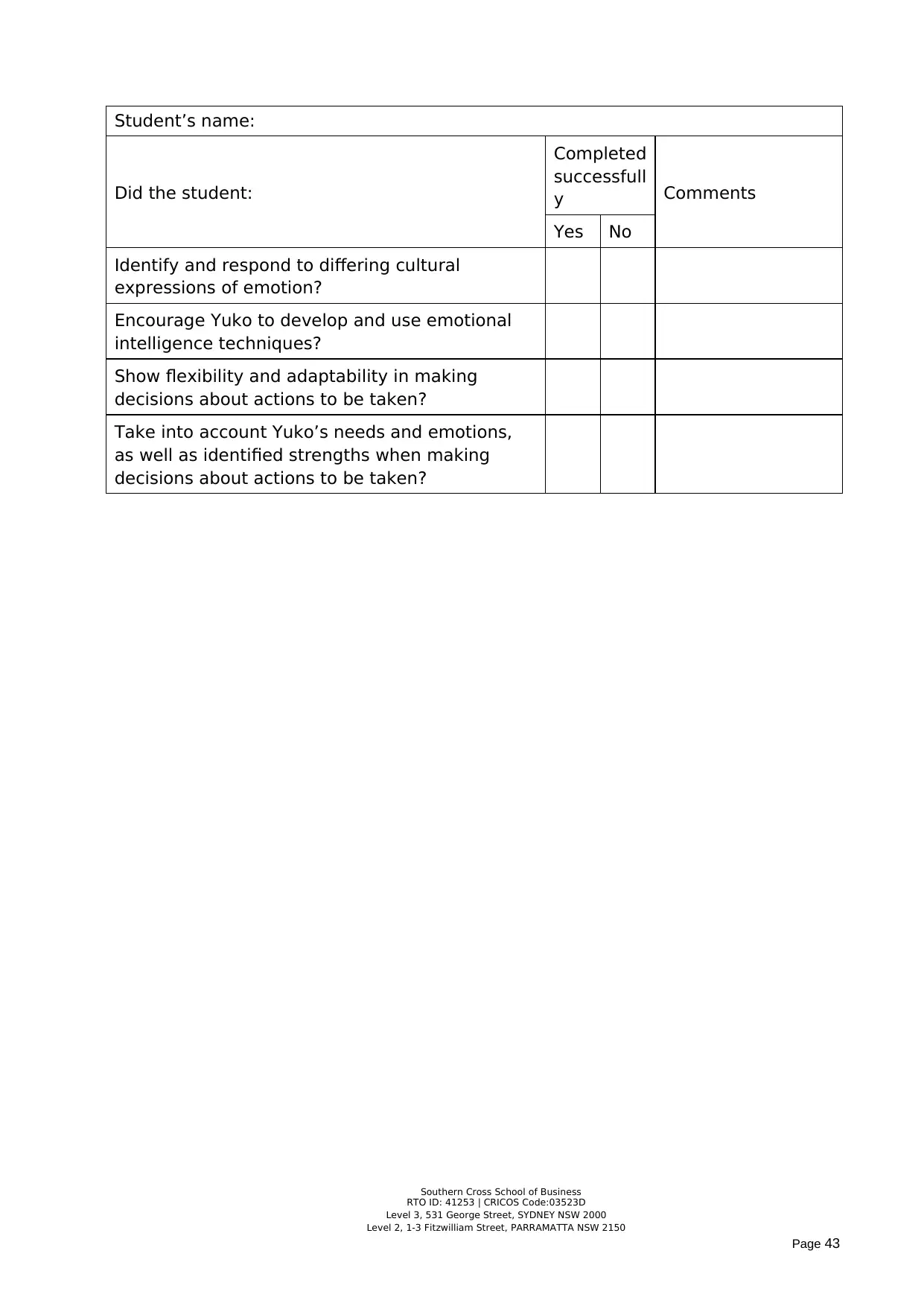
Student’s name:
Did the student:
Completed
successfull
y Comments
Yes No
Identify and respond to differing cultural
expressions of emotion?
Encourage Yuko to develop and use emotional
intelligence techniques?
Show flexibility and adaptability in making
decisions about actions to be taken?
Take into account Yuko’s needs and emotions,
as well as identified strengths when making
decisions about actions to be taken?
Southern Cross School of Business
RTO ID: 41253 | CRICOS Code:03523D
Level 3, 531 George Street, SYDNEY NSW 2000
Level 2, 1-3 Fitzwilliam Street, PARRAMATTA NSW 2150
Page 43
Did the student:
Completed
successfull
y Comments
Yes No
Identify and respond to differing cultural
expressions of emotion?
Encourage Yuko to develop and use emotional
intelligence techniques?
Show flexibility and adaptability in making
decisions about actions to be taken?
Take into account Yuko’s needs and emotions,
as well as identified strengths when making
decisions about actions to be taken?
Southern Cross School of Business
RTO ID: 41253 | CRICOS Code:03523D
Level 3, 531 George Street, SYDNEY NSW 2000
Level 2, 1-3 Fitzwilliam Street, PARRAMATTA NSW 2150
Page 43
Paraphrase This Document
Need a fresh take? Get an instant paraphrase of this document with our AI Paraphraser
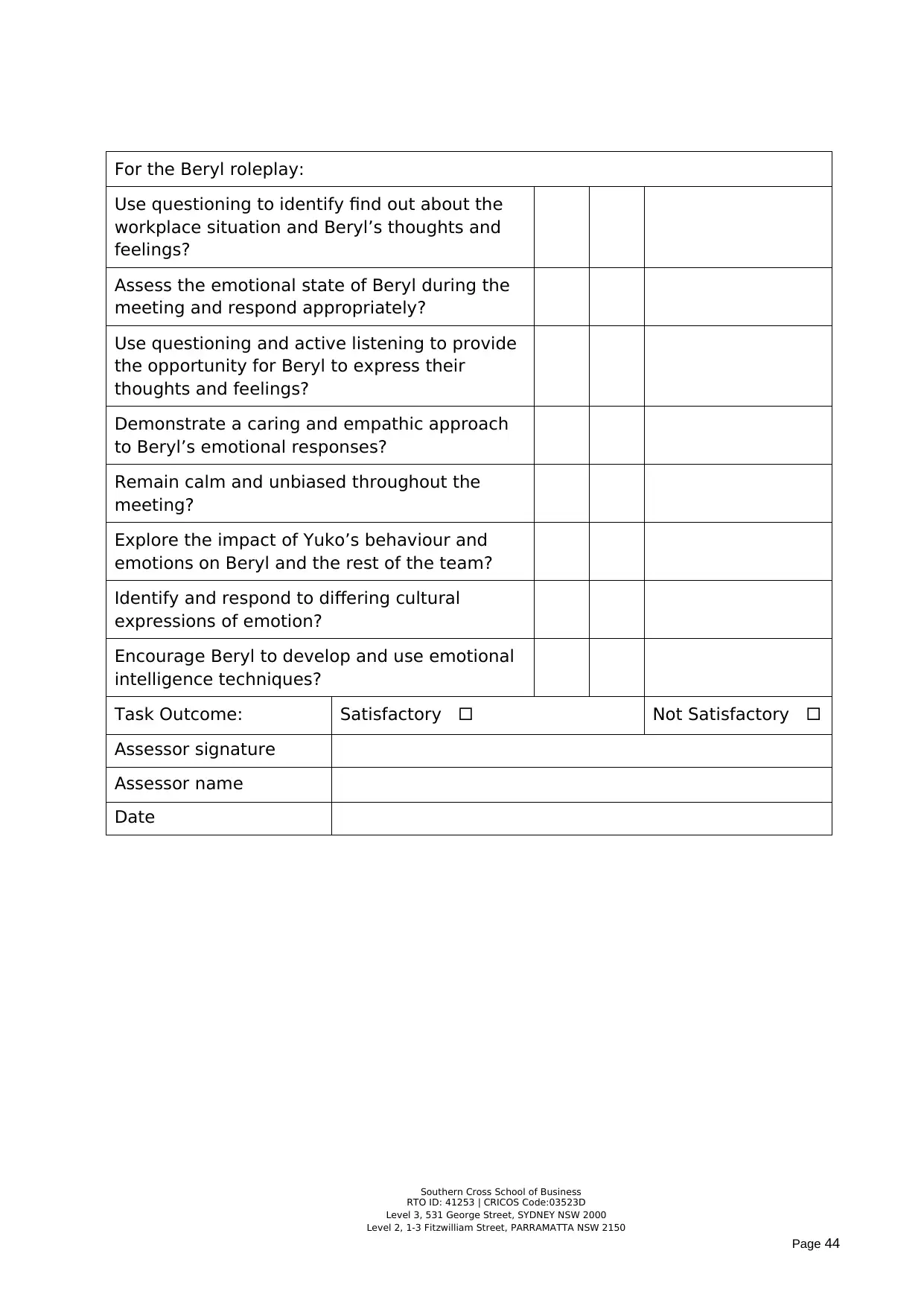
For the Beryl roleplay:
Use questioning to identify find out about the
workplace situation and Beryl’s thoughts and
feelings?
Assess the emotional state of Beryl during the
meeting and respond appropriately?
Use questioning and active listening to provide
the opportunity for Beryl to express their
thoughts and feelings?
Demonstrate a caring and empathic approach
to Beryl’s emotional responses?
Remain calm and unbiased throughout the
meeting?
Explore the impact of Yuko’s behaviour and
emotions on Beryl and the rest of the team?
Identify and respond to differing cultural
expressions of emotion?
Encourage Beryl to develop and use emotional
intelligence techniques?
Task Outcome: Satisfactory Not Satisfactory
Assessor signature
Assessor name
Date
Southern Cross School of Business
RTO ID: 41253 | CRICOS Code:03523D
Level 3, 531 George Street, SYDNEY NSW 2000
Level 2, 1-3 Fitzwilliam Street, PARRAMATTA NSW 2150
Page 44
Use questioning to identify find out about the
workplace situation and Beryl’s thoughts and
feelings?
Assess the emotional state of Beryl during the
meeting and respond appropriately?
Use questioning and active listening to provide
the opportunity for Beryl to express their
thoughts and feelings?
Demonstrate a caring and empathic approach
to Beryl’s emotional responses?
Remain calm and unbiased throughout the
meeting?
Explore the impact of Yuko’s behaviour and
emotions on Beryl and the rest of the team?
Identify and respond to differing cultural
expressions of emotion?
Encourage Beryl to develop and use emotional
intelligence techniques?
Task Outcome: Satisfactory Not Satisfactory
Assessor signature
Assessor name
Date
Southern Cross School of Business
RTO ID: 41253 | CRICOS Code:03523D
Level 3, 531 George Street, SYDNEY NSW 2000
Level 2, 1-3 Fitzwilliam Street, PARRAMATTA NSW 2150
Page 44
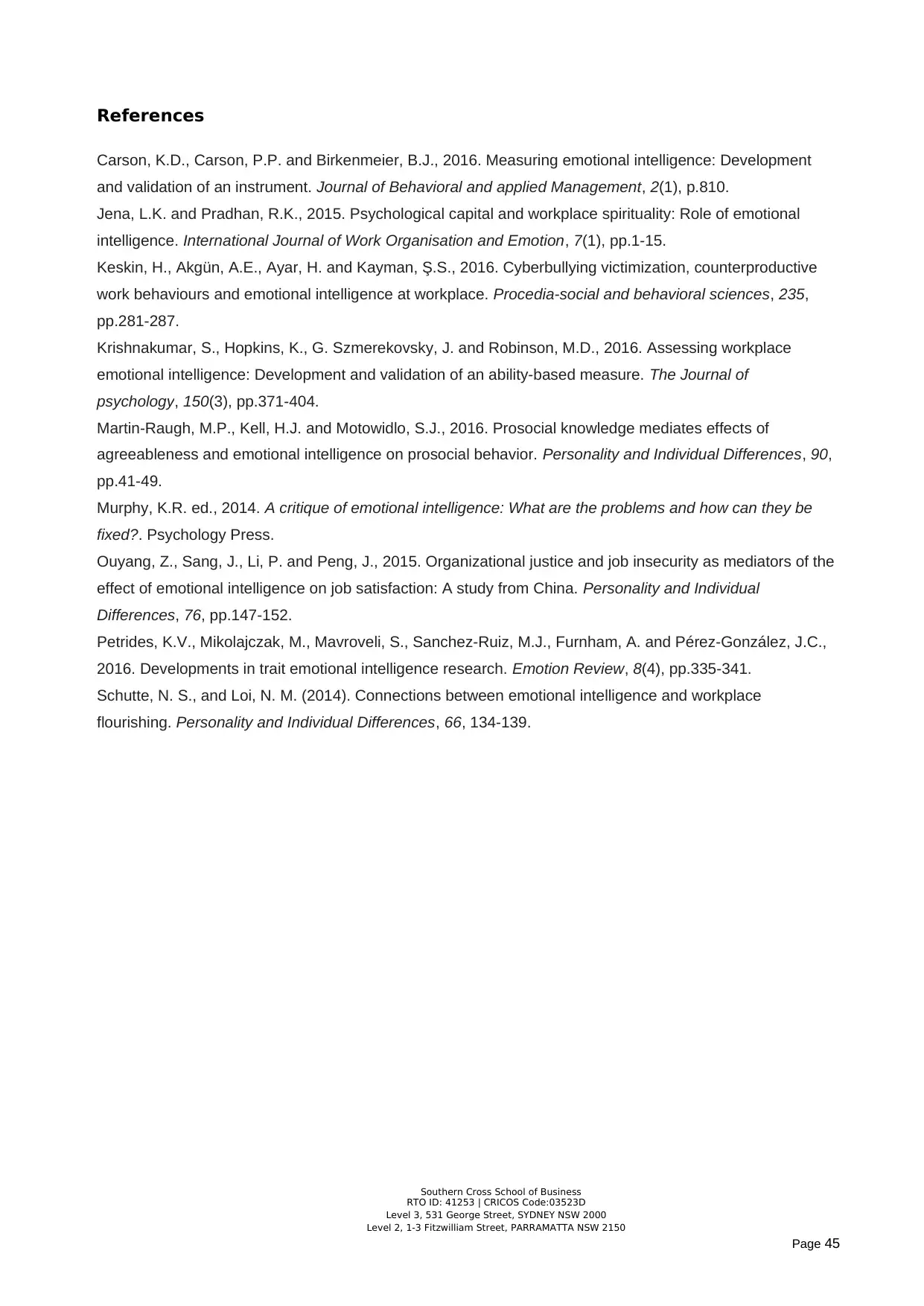
References
Carson, K.D., Carson, P.P. and Birkenmeier, B.J., 2016. Measuring emotional intelligence: Development
and validation of an instrument. Journal of Behavioral and applied Management, 2(1), p.810.
Jena, L.K. and Pradhan, R.K., 2015. Psychological capital and workplace spirituality: Role of emotional
intelligence. International Journal of Work Organisation and Emotion, 7(1), pp.1-15.
Keskin, H., Akgün, A.E., Ayar, H. and Kayman, Ş.S., 2016. Cyberbullying victimization, counterproductive
work behaviours and emotional intelligence at workplace. Procedia-social and behavioral sciences, 235,
pp.281-287.
Krishnakumar, S., Hopkins, K., G. Szmerekovsky, J. and Robinson, M.D., 2016. Assessing workplace
emotional intelligence: Development and validation of an ability-based measure. The Journal of
psychology, 150(3), pp.371-404.
Martin-Raugh, M.P., Kell, H.J. and Motowidlo, S.J., 2016. Prosocial knowledge mediates effects of
agreeableness and emotional intelligence on prosocial behavior. Personality and Individual Differences, 90,
pp.41-49.
Murphy, K.R. ed., 2014. A critique of emotional intelligence: What are the problems and how can they be
fixed?. Psychology Press.
Ouyang, Z., Sang, J., Li, P. and Peng, J., 2015. Organizational justice and job insecurity as mediators of the
effect of emotional intelligence on job satisfaction: A study from China. Personality and Individual
Differences, 76, pp.147-152.
Petrides, K.V., Mikolajczak, M., Mavroveli, S., Sanchez-Ruiz, M.J., Furnham, A. and Pérez-González, J.C.,
2016. Developments in trait emotional intelligence research. Emotion Review, 8(4), pp.335-341.
Schutte, N. S., and Loi, N. M. (2014). Connections between emotional intelligence and workplace
flourishing. Personality and Individual Differences, 66, 134-139.
Southern Cross School of Business
RTO ID: 41253 | CRICOS Code:03523D
Level 3, 531 George Street, SYDNEY NSW 2000
Level 2, 1-3 Fitzwilliam Street, PARRAMATTA NSW 2150
Page 45
Carson, K.D., Carson, P.P. and Birkenmeier, B.J., 2016. Measuring emotional intelligence: Development
and validation of an instrument. Journal of Behavioral and applied Management, 2(1), p.810.
Jena, L.K. and Pradhan, R.K., 2015. Psychological capital and workplace spirituality: Role of emotional
intelligence. International Journal of Work Organisation and Emotion, 7(1), pp.1-15.
Keskin, H., Akgün, A.E., Ayar, H. and Kayman, Ş.S., 2016. Cyberbullying victimization, counterproductive
work behaviours and emotional intelligence at workplace. Procedia-social and behavioral sciences, 235,
pp.281-287.
Krishnakumar, S., Hopkins, K., G. Szmerekovsky, J. and Robinson, M.D., 2016. Assessing workplace
emotional intelligence: Development and validation of an ability-based measure. The Journal of
psychology, 150(3), pp.371-404.
Martin-Raugh, M.P., Kell, H.J. and Motowidlo, S.J., 2016. Prosocial knowledge mediates effects of
agreeableness and emotional intelligence on prosocial behavior. Personality and Individual Differences, 90,
pp.41-49.
Murphy, K.R. ed., 2014. A critique of emotional intelligence: What are the problems and how can they be
fixed?. Psychology Press.
Ouyang, Z., Sang, J., Li, P. and Peng, J., 2015. Organizational justice and job insecurity as mediators of the
effect of emotional intelligence on job satisfaction: A study from China. Personality and Individual
Differences, 76, pp.147-152.
Petrides, K.V., Mikolajczak, M., Mavroveli, S., Sanchez-Ruiz, M.J., Furnham, A. and Pérez-González, J.C.,
2016. Developments in trait emotional intelligence research. Emotion Review, 8(4), pp.335-341.
Schutte, N. S., and Loi, N. M. (2014). Connections between emotional intelligence and workplace
flourishing. Personality and Individual Differences, 66, 134-139.
Southern Cross School of Business
RTO ID: 41253 | CRICOS Code:03523D
Level 3, 531 George Street, SYDNEY NSW 2000
Level 2, 1-3 Fitzwilliam Street, PARRAMATTA NSW 2150
Page 45
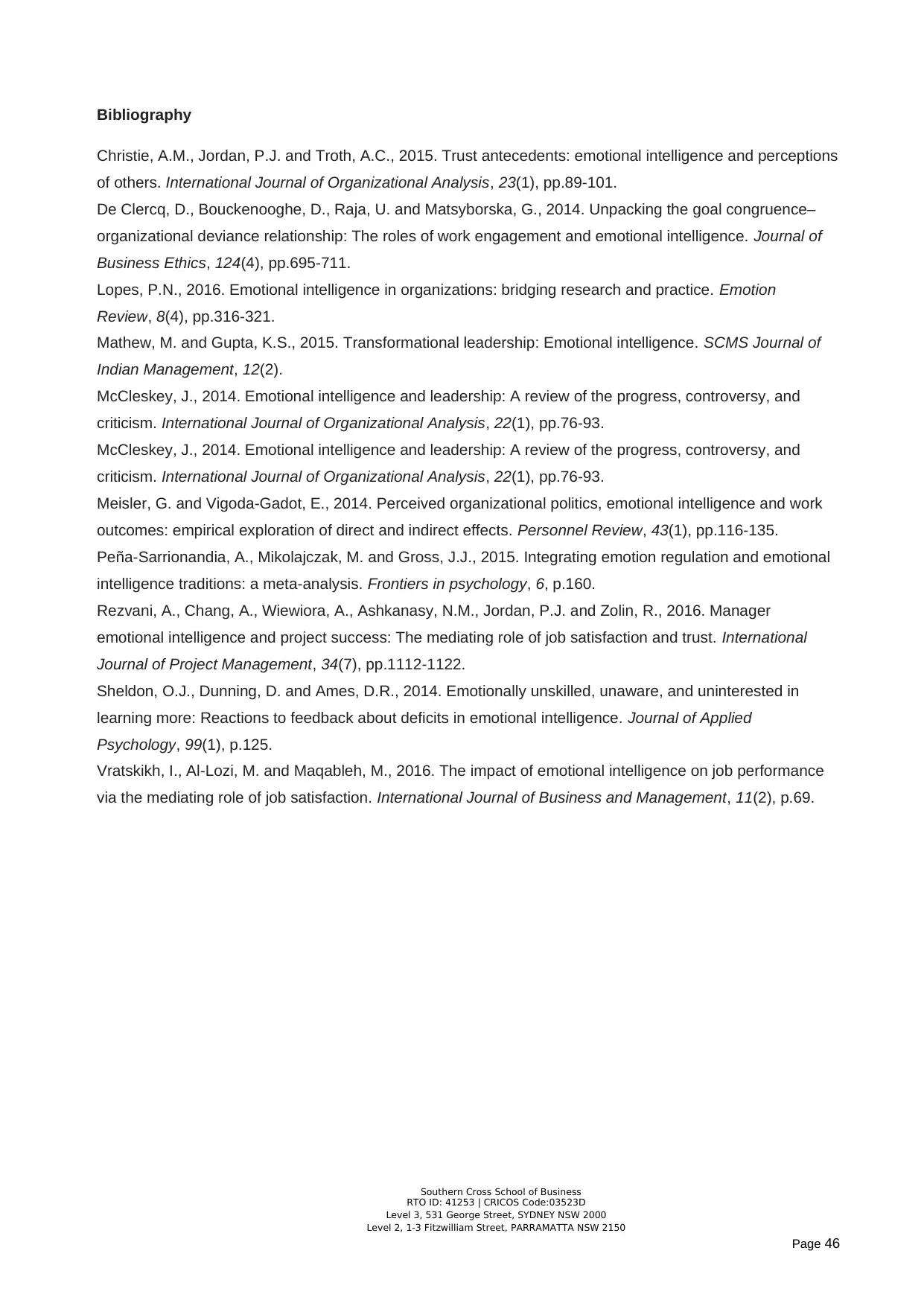
Bibliography
Christie, A.M., Jordan, P.J. and Troth, A.C., 2015. Trust antecedents: emotional intelligence and perceptions
of others. International Journal of Organizational Analysis, 23(1), pp.89-101.
De Clercq, D., Bouckenooghe, D., Raja, U. and Matsyborska, G., 2014. Unpacking the goal congruence–
organizational deviance relationship: The roles of work engagement and emotional intelligence. Journal of
Business Ethics, 124(4), pp.695-711.
Lopes, P.N., 2016. Emotional intelligence in organizations: bridging research and practice. Emotion
Review, 8(4), pp.316-321.
Mathew, M. and Gupta, K.S., 2015. Transformational leadership: Emotional intelligence. SCMS Journal of
Indian Management, 12(2).
McCleskey, J., 2014. Emotional intelligence and leadership: A review of the progress, controversy, and
criticism. International Journal of Organizational Analysis, 22(1), pp.76-93.
McCleskey, J., 2014. Emotional intelligence and leadership: A review of the progress, controversy, and
criticism. International Journal of Organizational Analysis, 22(1), pp.76-93.
Meisler, G. and Vigoda-Gadot, E., 2014. Perceived organizational politics, emotional intelligence and work
outcomes: empirical exploration of direct and indirect effects. Personnel Review, 43(1), pp.116-135.
Peña-Sarrionandia, A., Mikolajczak, M. and Gross, J.J., 2015. Integrating emotion regulation and emotional
intelligence traditions: a meta-analysis. Frontiers in psychology, 6, p.160.
Rezvani, A., Chang, A., Wiewiora, A., Ashkanasy, N.M., Jordan, P.J. and Zolin, R., 2016. Manager
emotional intelligence and project success: The mediating role of job satisfaction and trust. International
Journal of Project Management, 34(7), pp.1112-1122.
Sheldon, O.J., Dunning, D. and Ames, D.R., 2014. Emotionally unskilled, unaware, and uninterested in
learning more: Reactions to feedback about deficits in emotional intelligence. Journal of Applied
Psychology, 99(1), p.125.
Vratskikh, I., Al-Lozi, M. and Maqableh, M., 2016. The impact of emotional intelligence on job performance
via the mediating role of job satisfaction. International Journal of Business and Management, 11(2), p.69.
Southern Cross School of Business
RTO ID: 41253 | CRICOS Code:03523D
Level 3, 531 George Street, SYDNEY NSW 2000
Level 2, 1-3 Fitzwilliam Street, PARRAMATTA NSW 2150
Page 46
Christie, A.M., Jordan, P.J. and Troth, A.C., 2015. Trust antecedents: emotional intelligence and perceptions
of others. International Journal of Organizational Analysis, 23(1), pp.89-101.
De Clercq, D., Bouckenooghe, D., Raja, U. and Matsyborska, G., 2014. Unpacking the goal congruence–
organizational deviance relationship: The roles of work engagement and emotional intelligence. Journal of
Business Ethics, 124(4), pp.695-711.
Lopes, P.N., 2016. Emotional intelligence in organizations: bridging research and practice. Emotion
Review, 8(4), pp.316-321.
Mathew, M. and Gupta, K.S., 2015. Transformational leadership: Emotional intelligence. SCMS Journal of
Indian Management, 12(2).
McCleskey, J., 2014. Emotional intelligence and leadership: A review of the progress, controversy, and
criticism. International Journal of Organizational Analysis, 22(1), pp.76-93.
McCleskey, J., 2014. Emotional intelligence and leadership: A review of the progress, controversy, and
criticism. International Journal of Organizational Analysis, 22(1), pp.76-93.
Meisler, G. and Vigoda-Gadot, E., 2014. Perceived organizational politics, emotional intelligence and work
outcomes: empirical exploration of direct and indirect effects. Personnel Review, 43(1), pp.116-135.
Peña-Sarrionandia, A., Mikolajczak, M. and Gross, J.J., 2015. Integrating emotion regulation and emotional
intelligence traditions: a meta-analysis. Frontiers in psychology, 6, p.160.
Rezvani, A., Chang, A., Wiewiora, A., Ashkanasy, N.M., Jordan, P.J. and Zolin, R., 2016. Manager
emotional intelligence and project success: The mediating role of job satisfaction and trust. International
Journal of Project Management, 34(7), pp.1112-1122.
Sheldon, O.J., Dunning, D. and Ames, D.R., 2014. Emotionally unskilled, unaware, and uninterested in
learning more: Reactions to feedback about deficits in emotional intelligence. Journal of Applied
Psychology, 99(1), p.125.
Vratskikh, I., Al-Lozi, M. and Maqableh, M., 2016. The impact of emotional intelligence on job performance
via the mediating role of job satisfaction. International Journal of Business and Management, 11(2), p.69.
Southern Cross School of Business
RTO ID: 41253 | CRICOS Code:03523D
Level 3, 531 George Street, SYDNEY NSW 2000
Level 2, 1-3 Fitzwilliam Street, PARRAMATTA NSW 2150
Page 46
1 out of 46
Related Documents
Your All-in-One AI-Powered Toolkit for Academic Success.
+13062052269
info@desklib.com
Available 24*7 on WhatsApp / Email
![[object Object]](/_next/static/media/star-bottom.7253800d.svg)
Unlock your academic potential
© 2024 | Zucol Services PVT LTD | All rights reserved.





